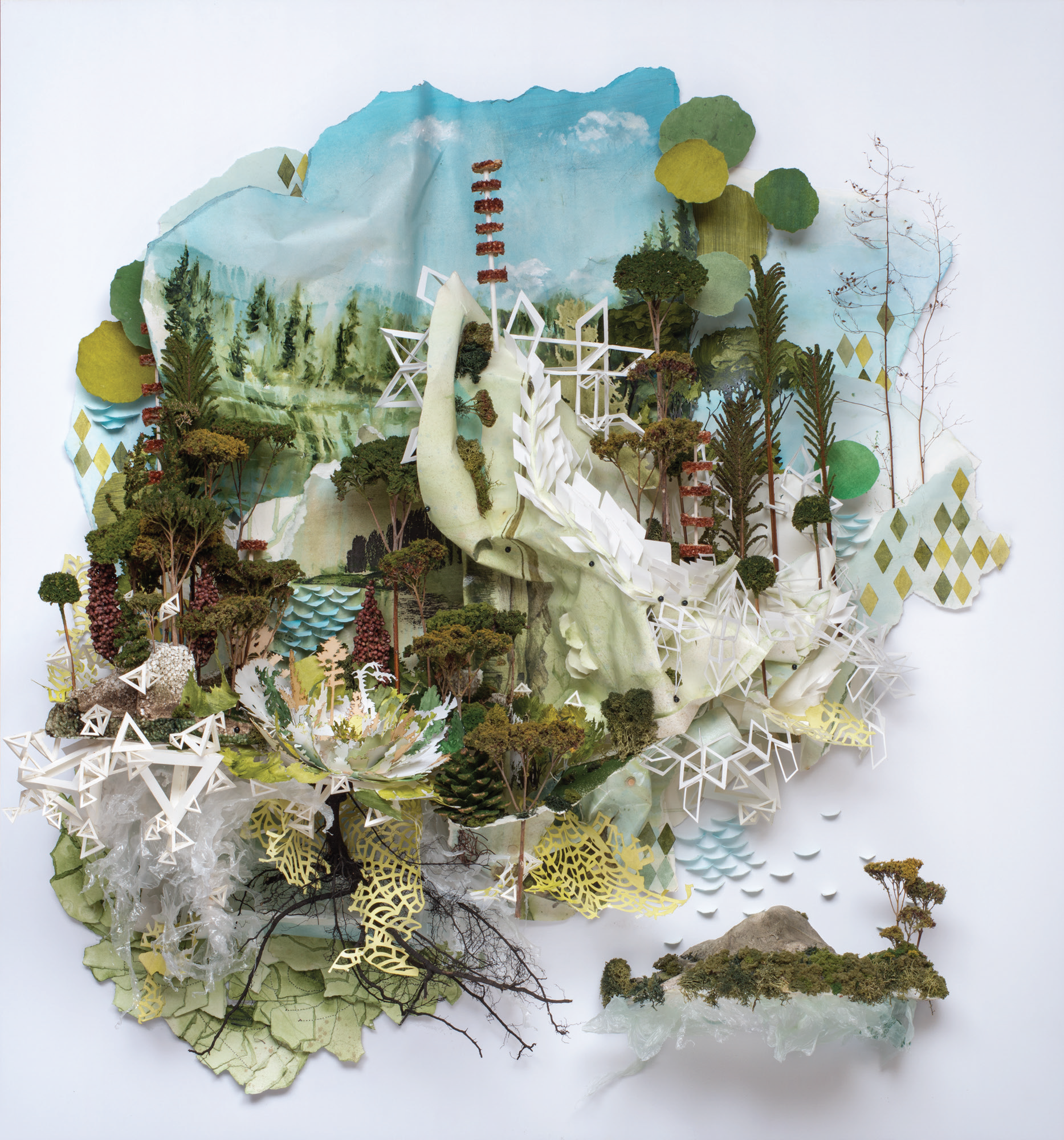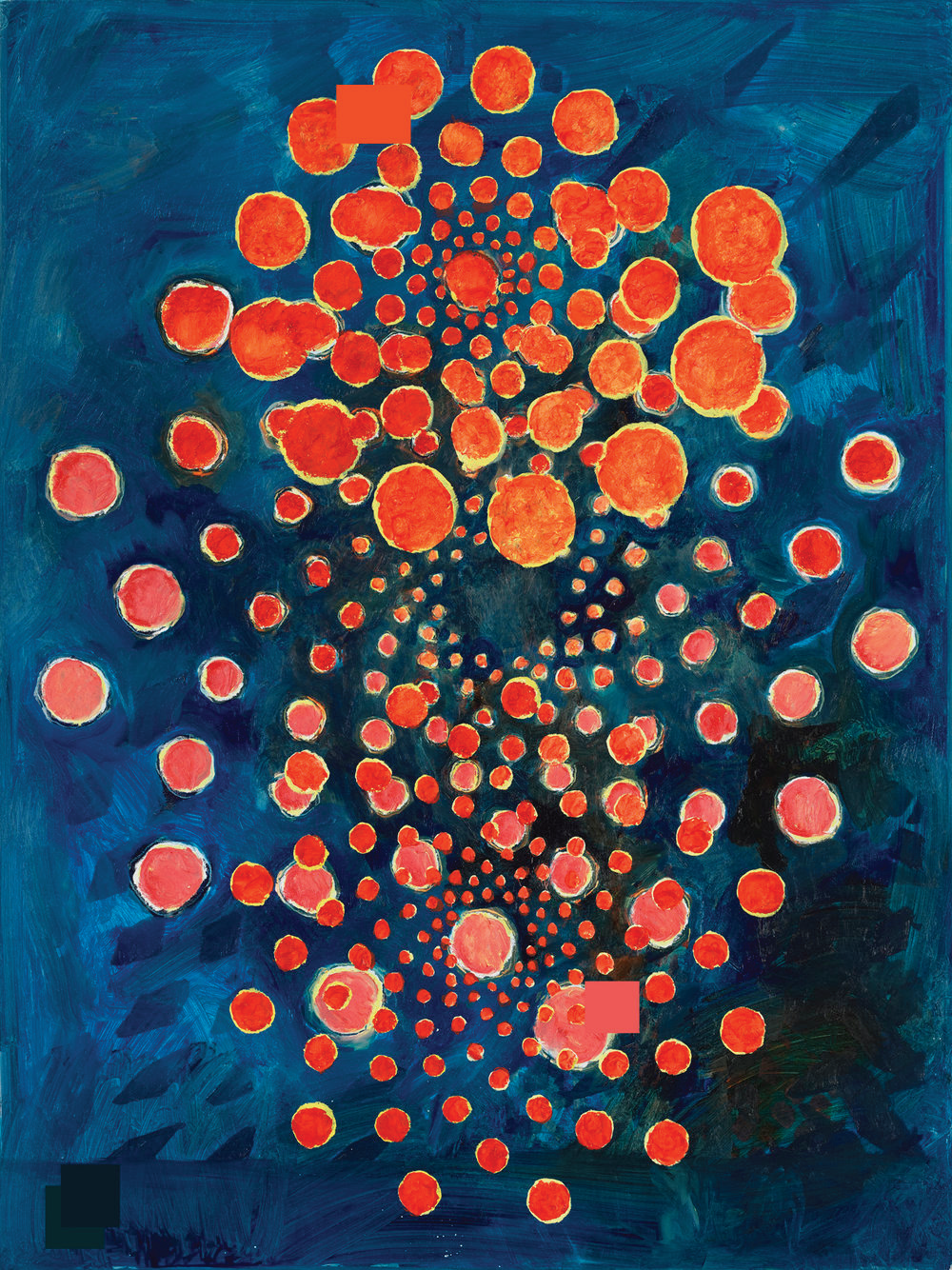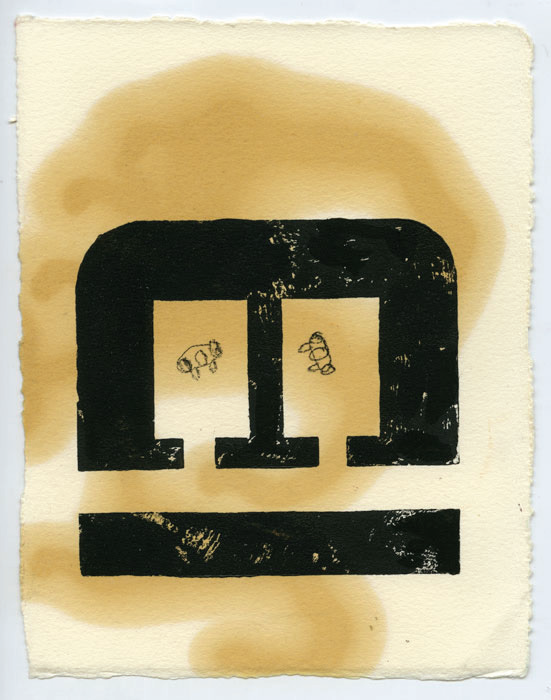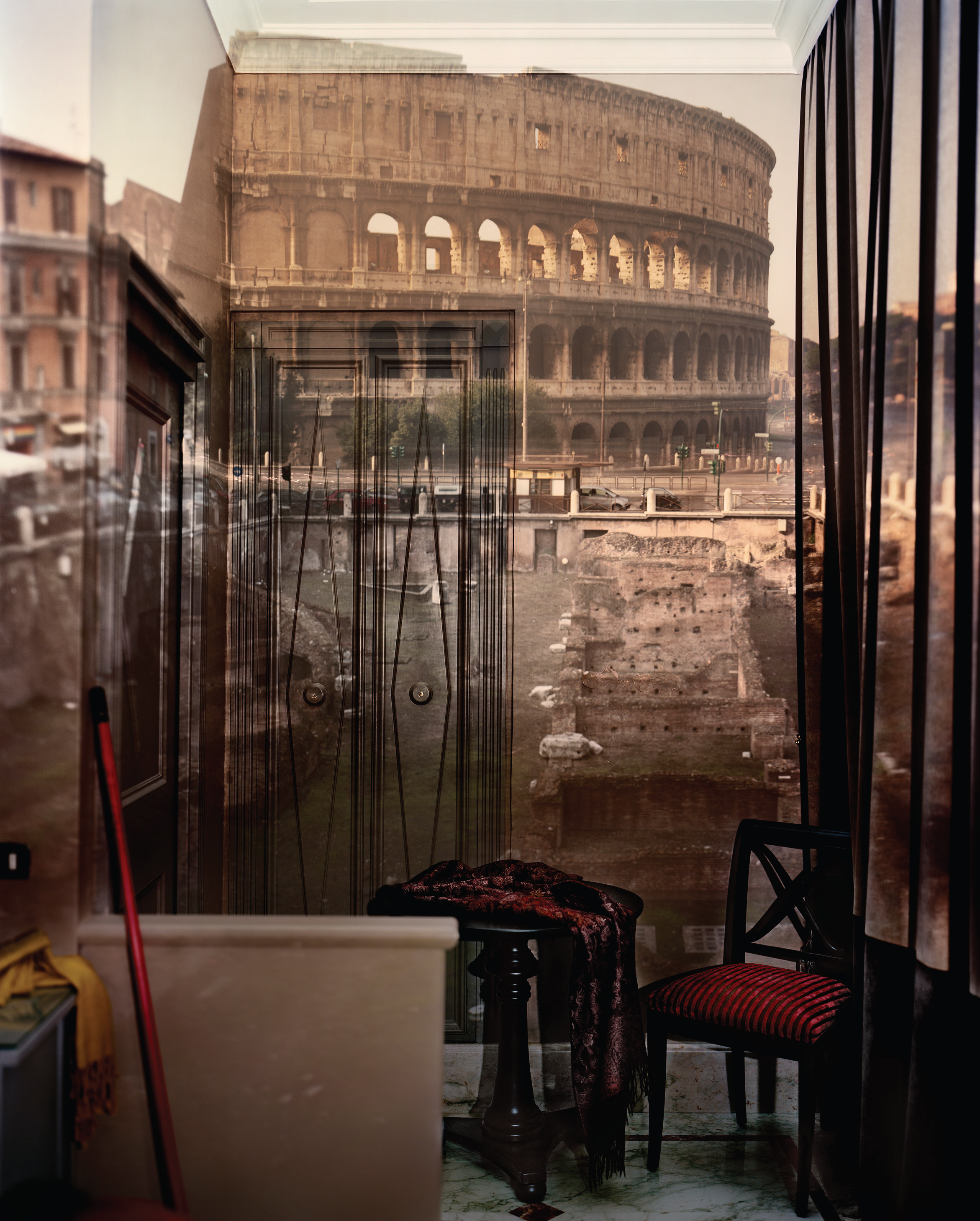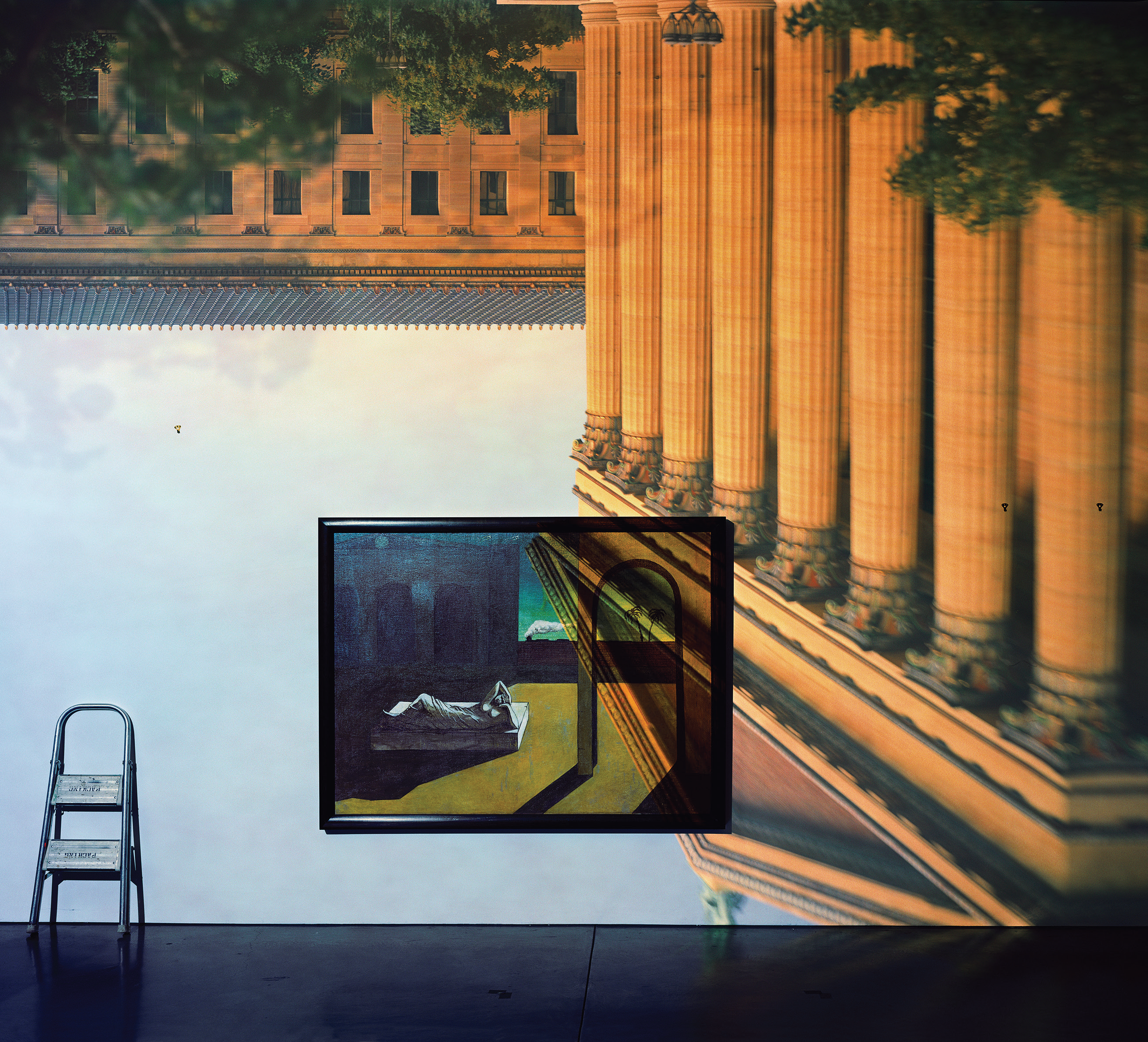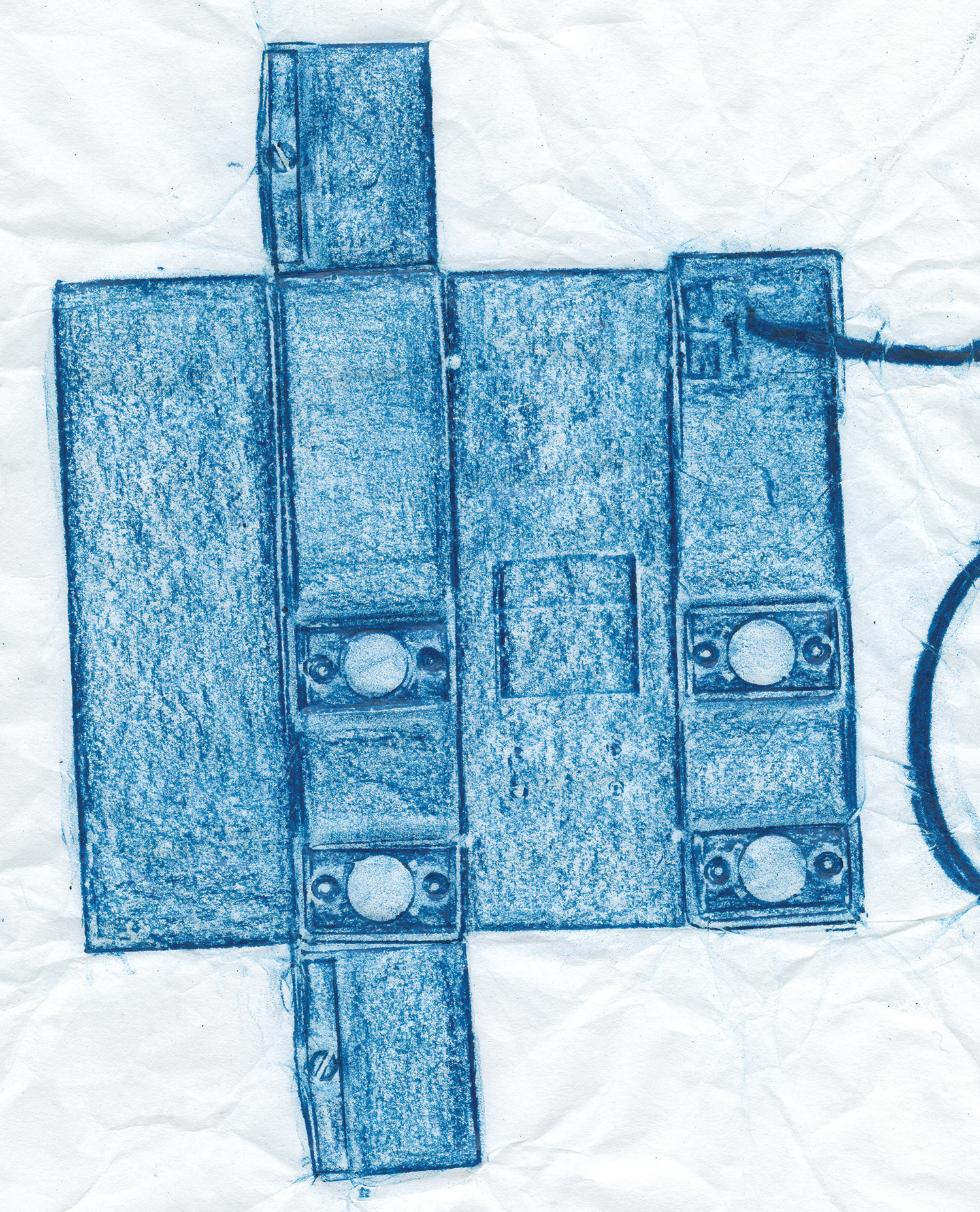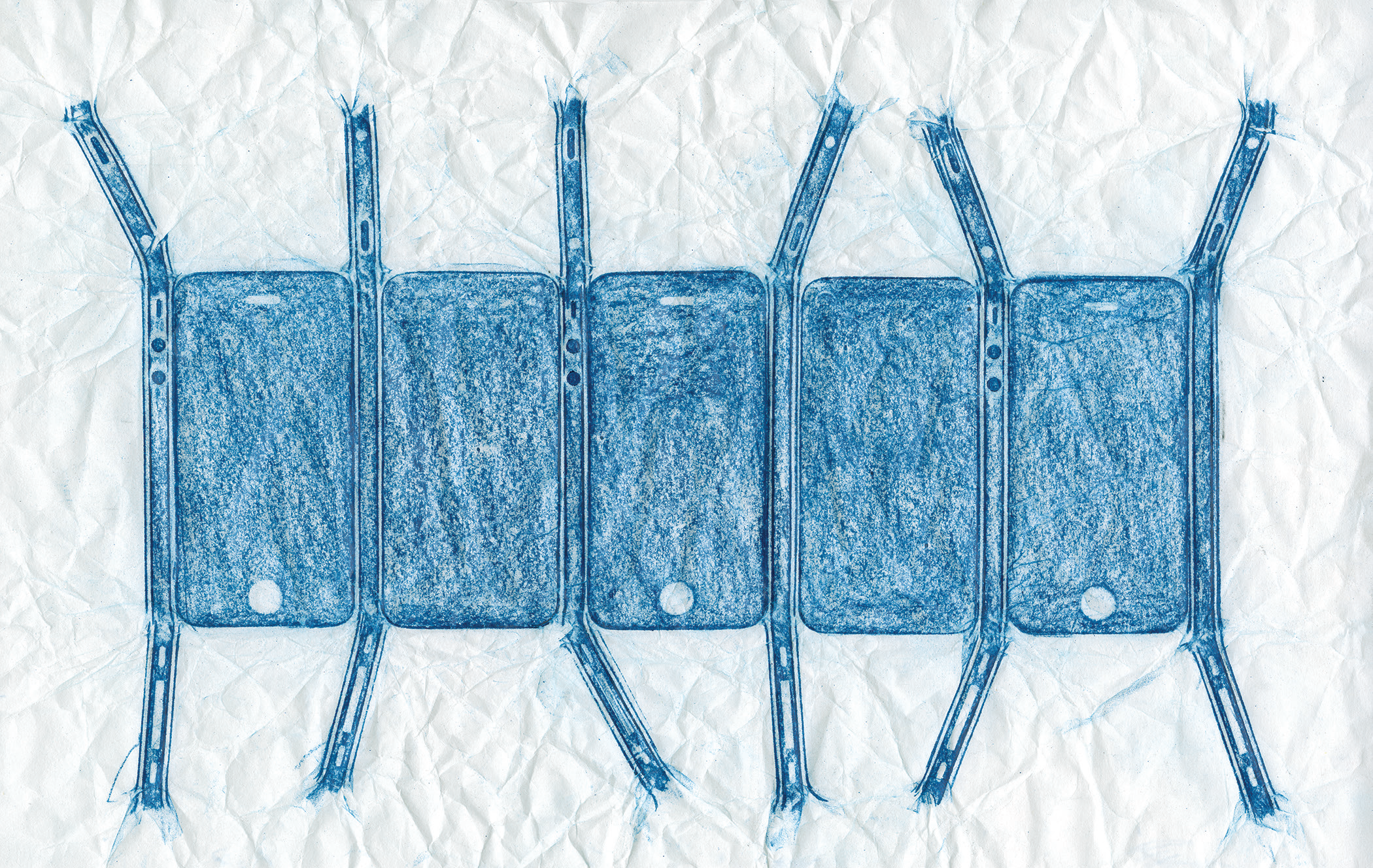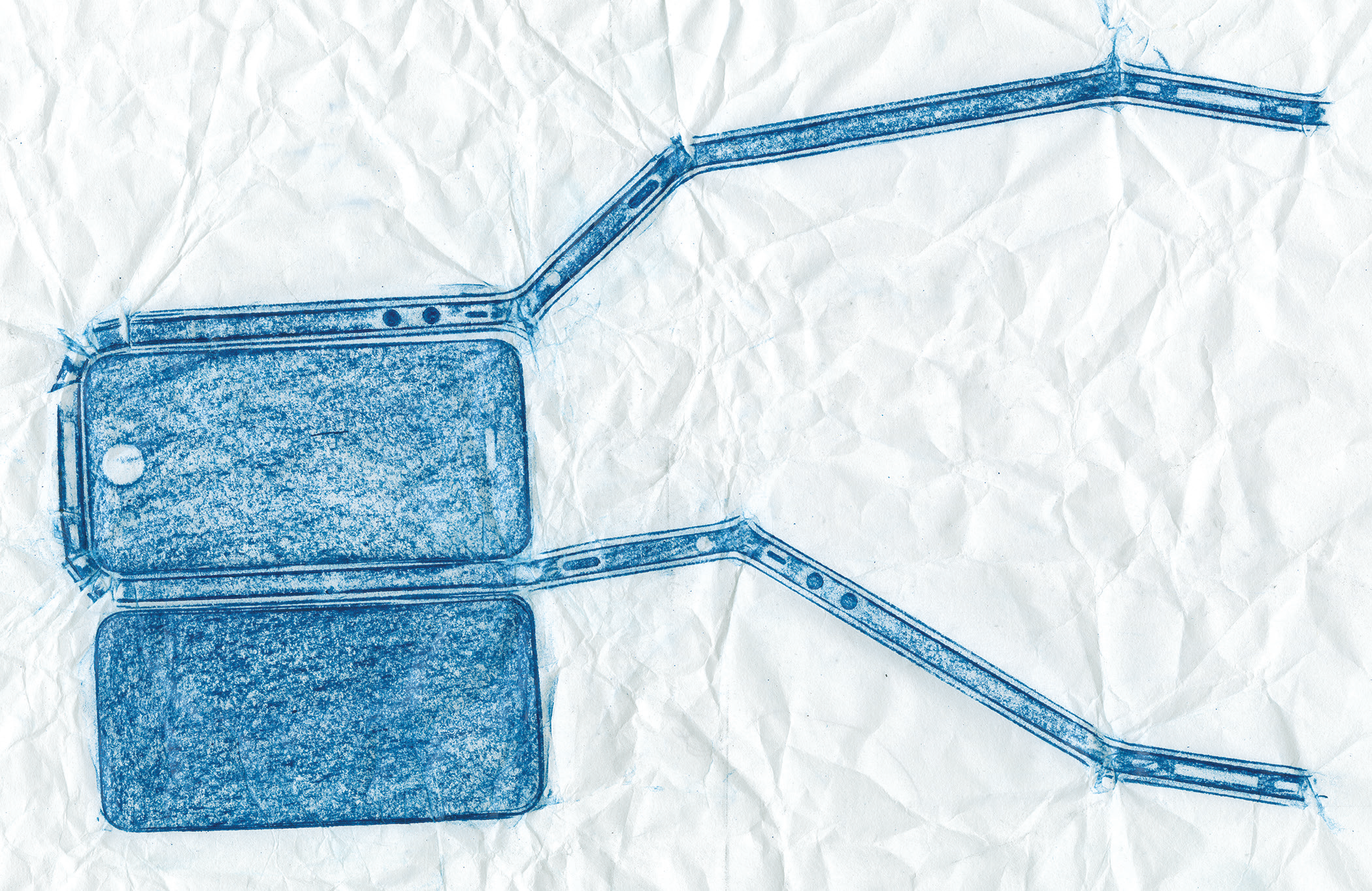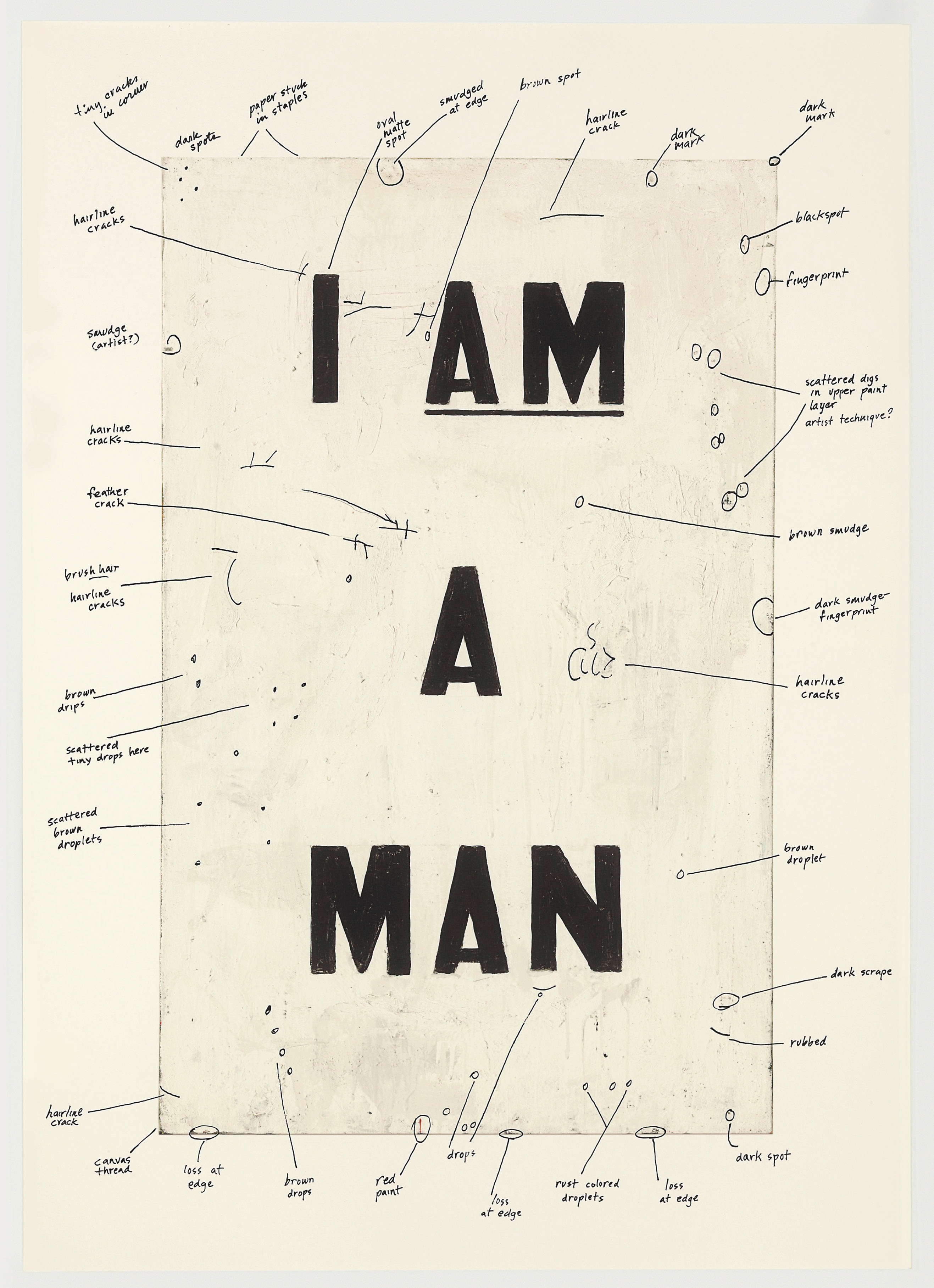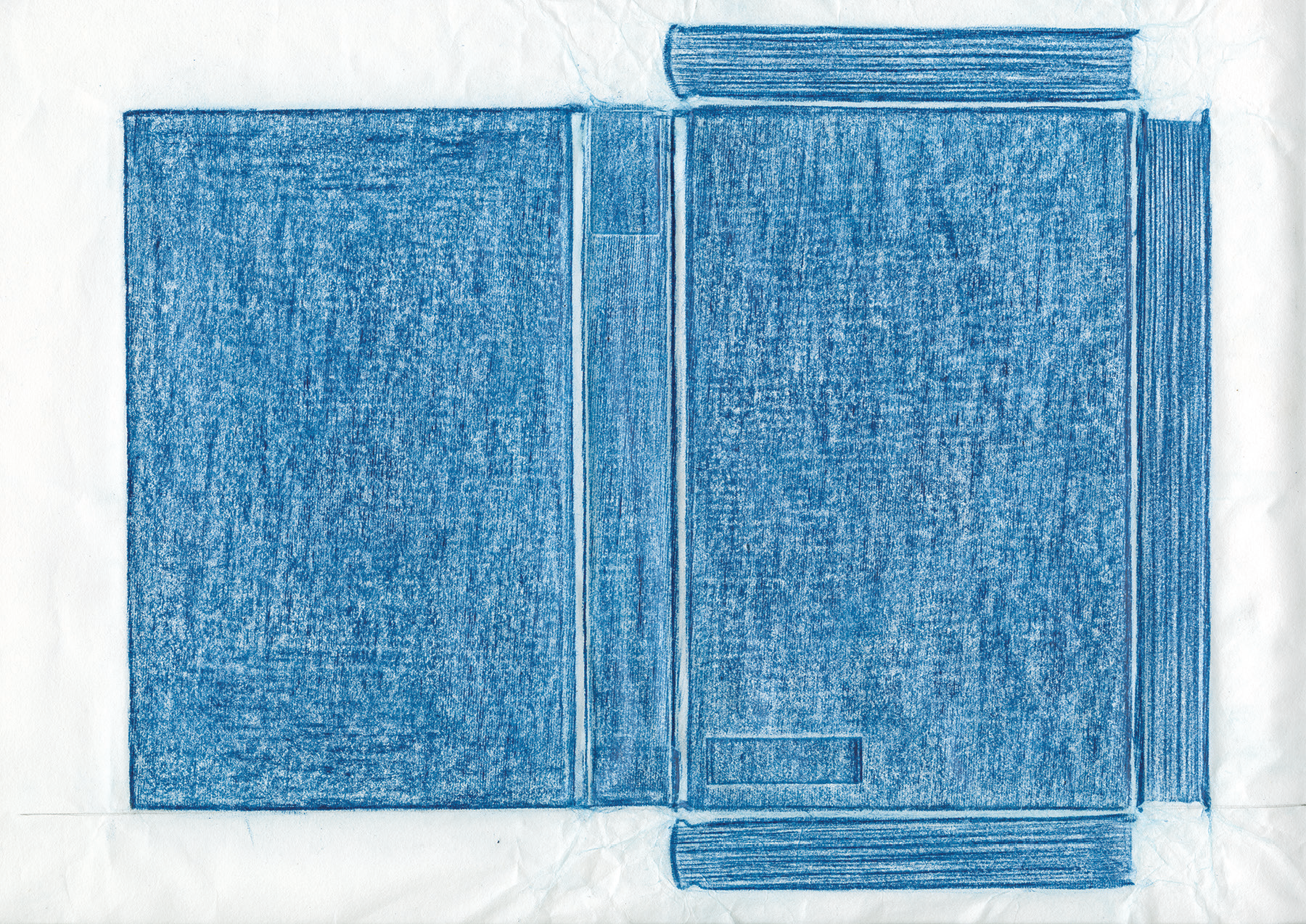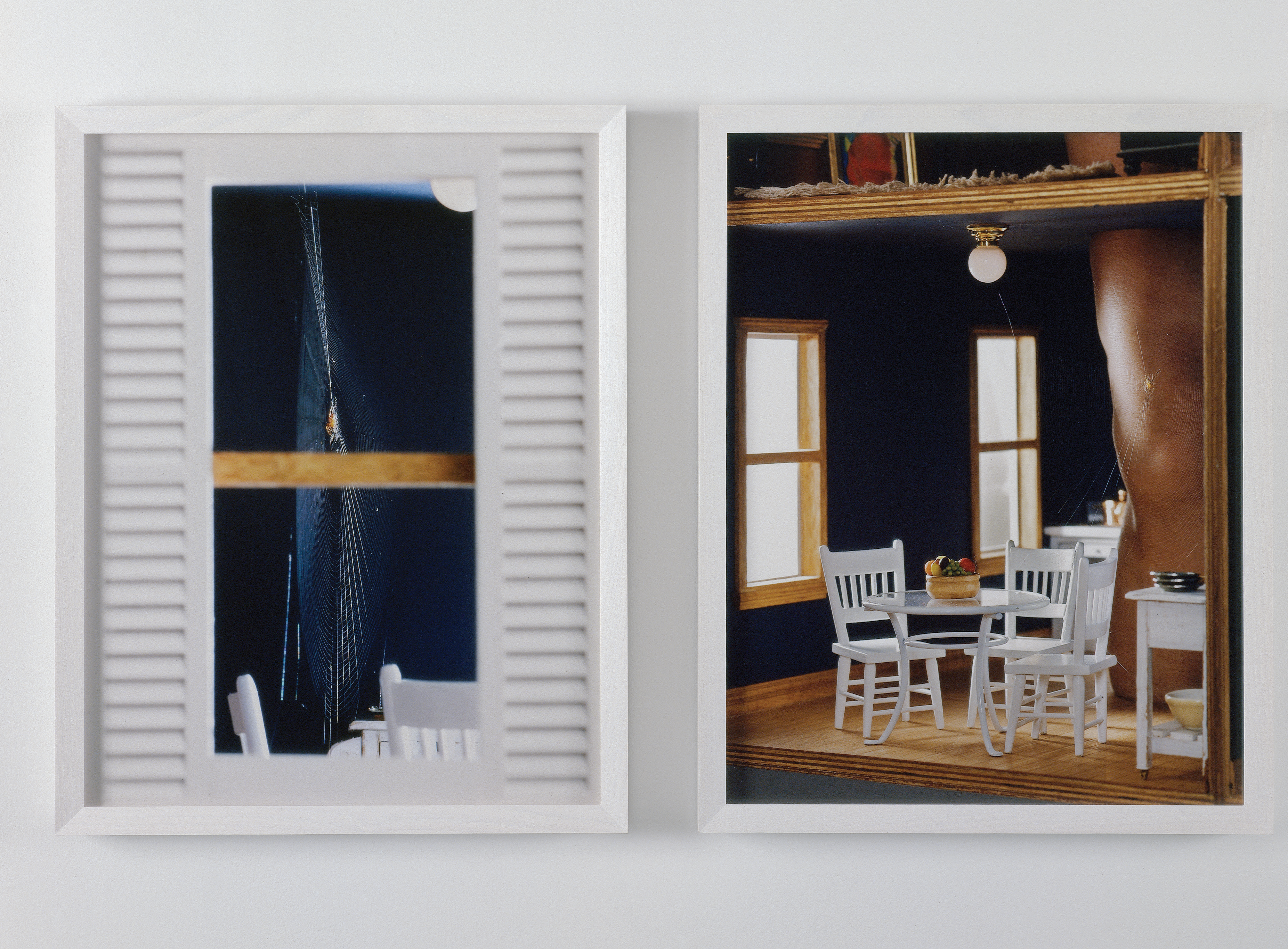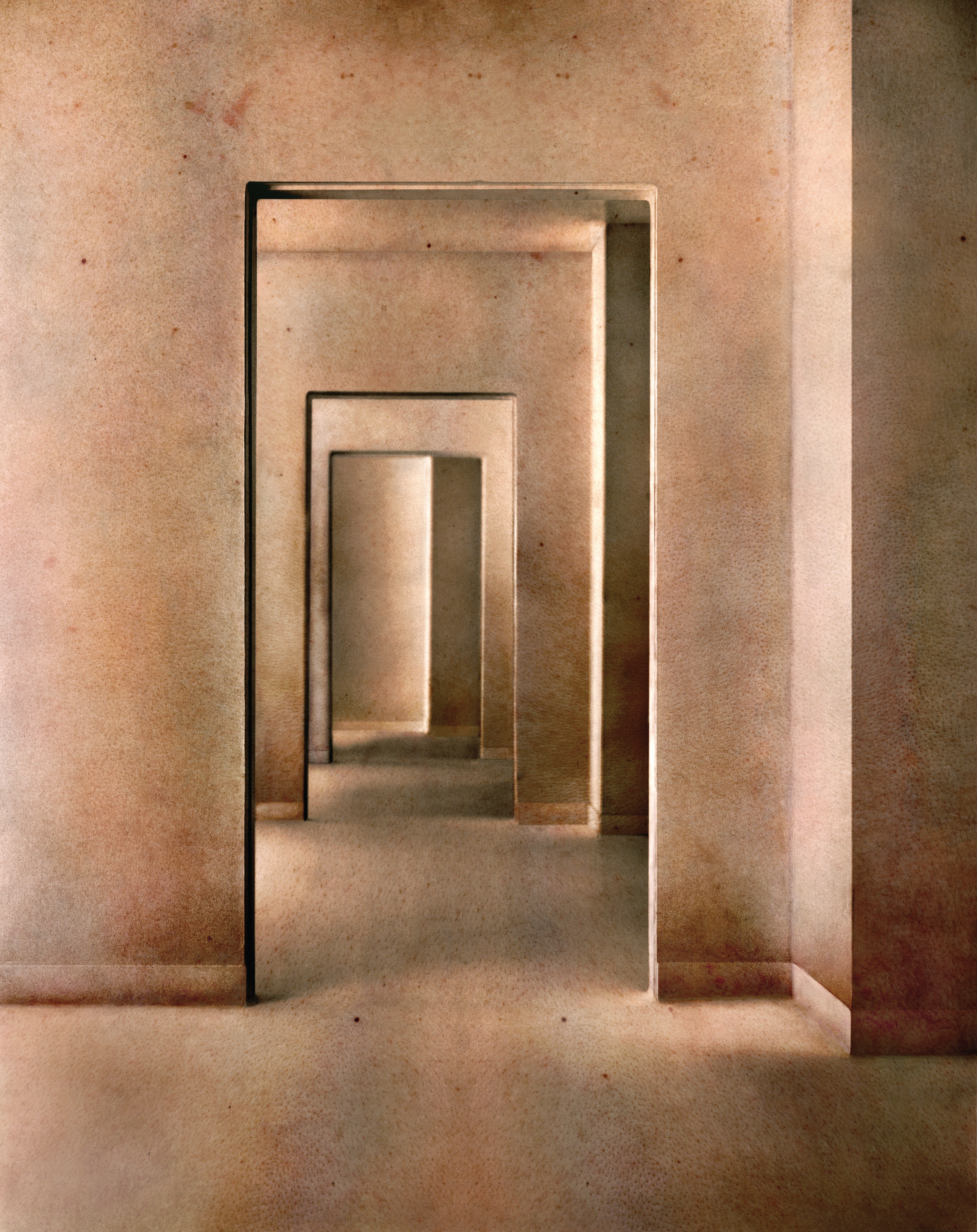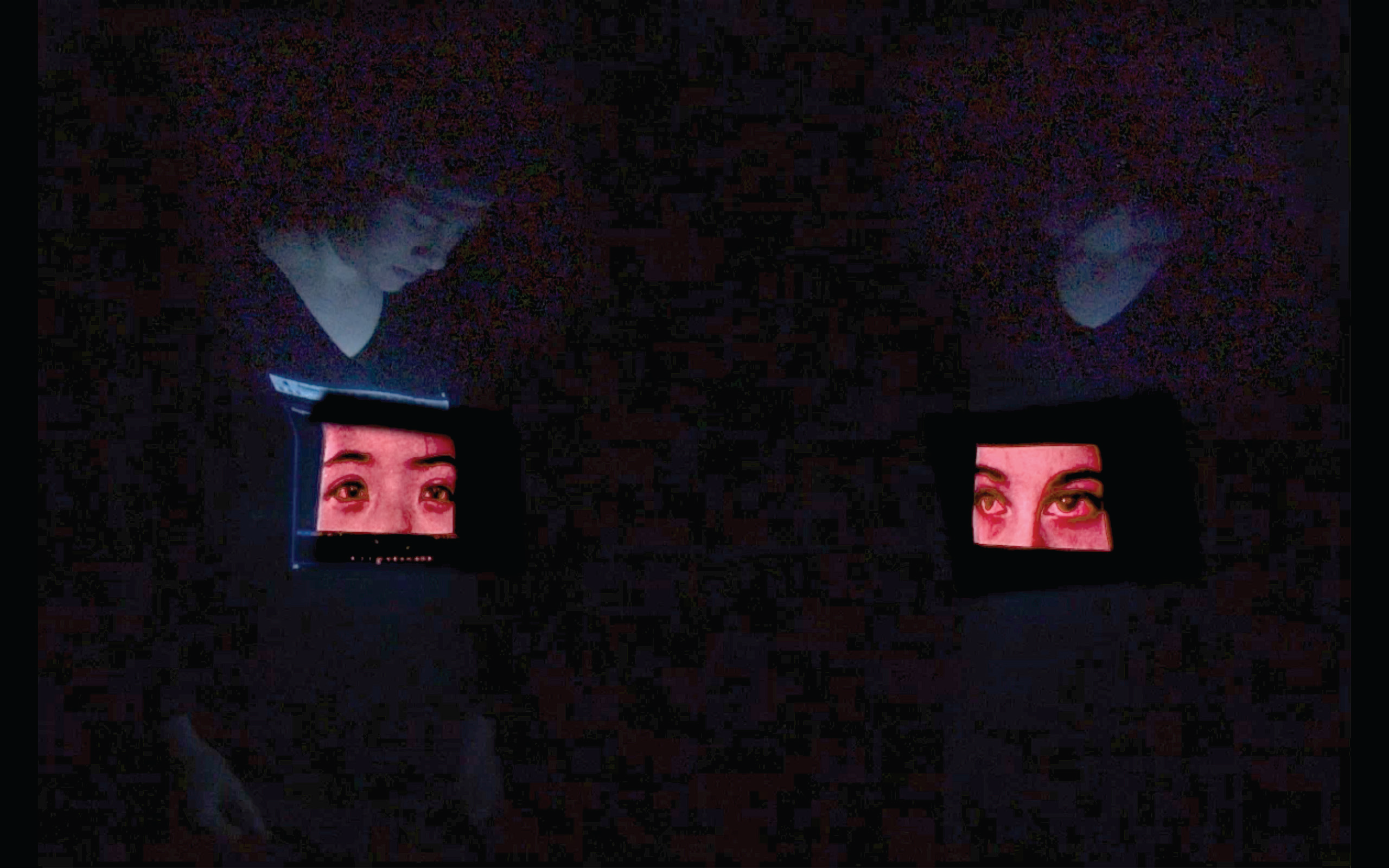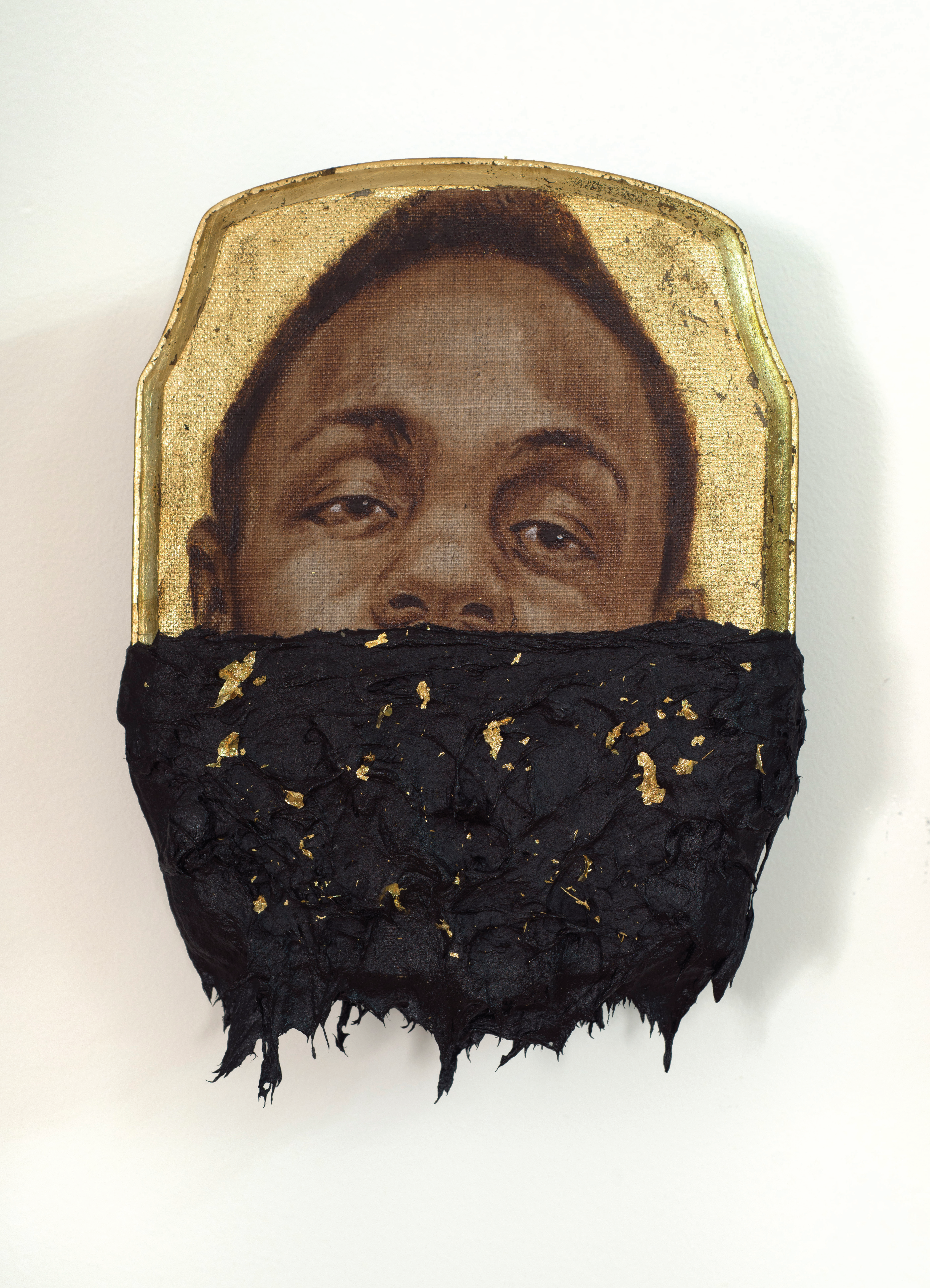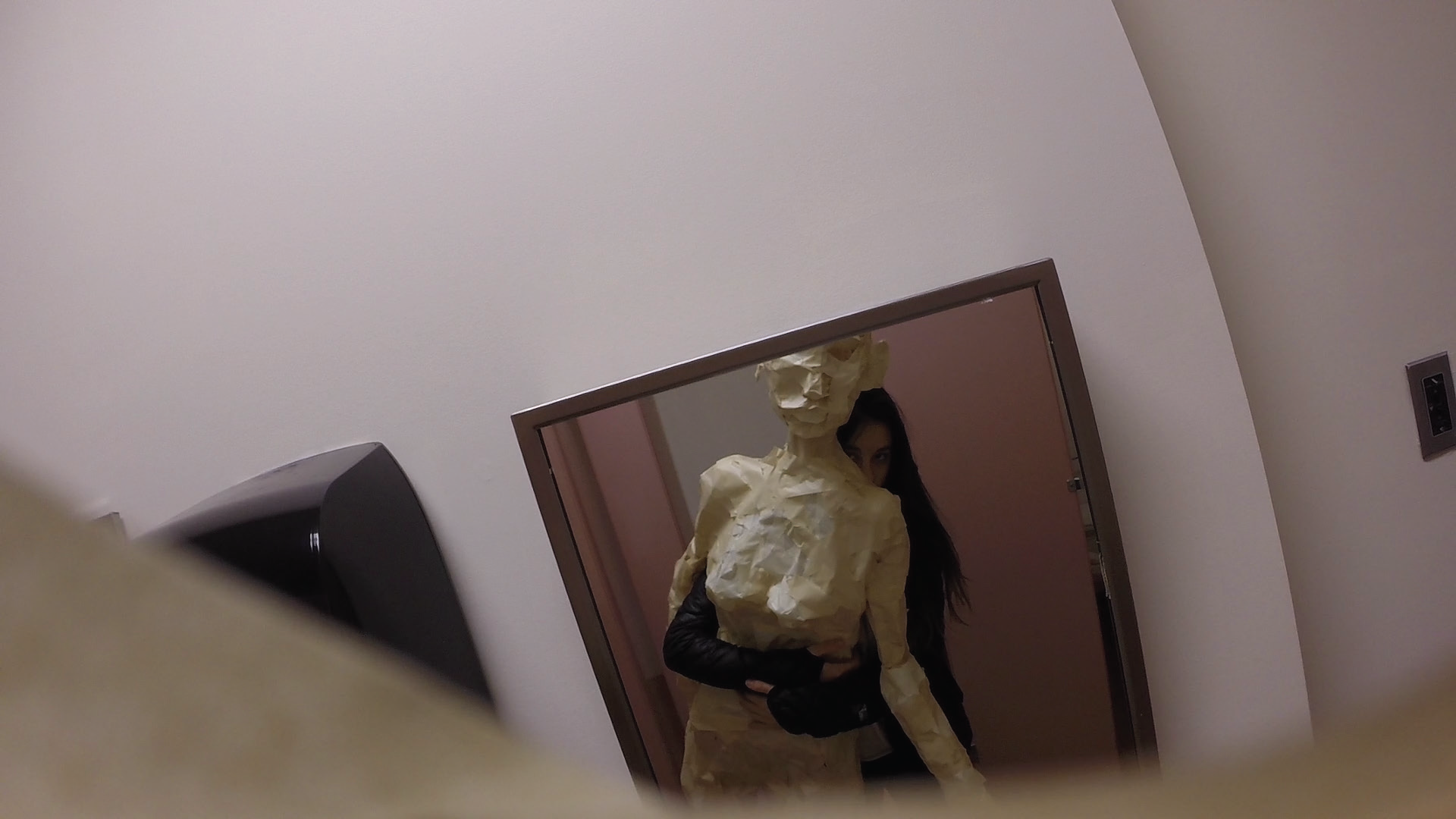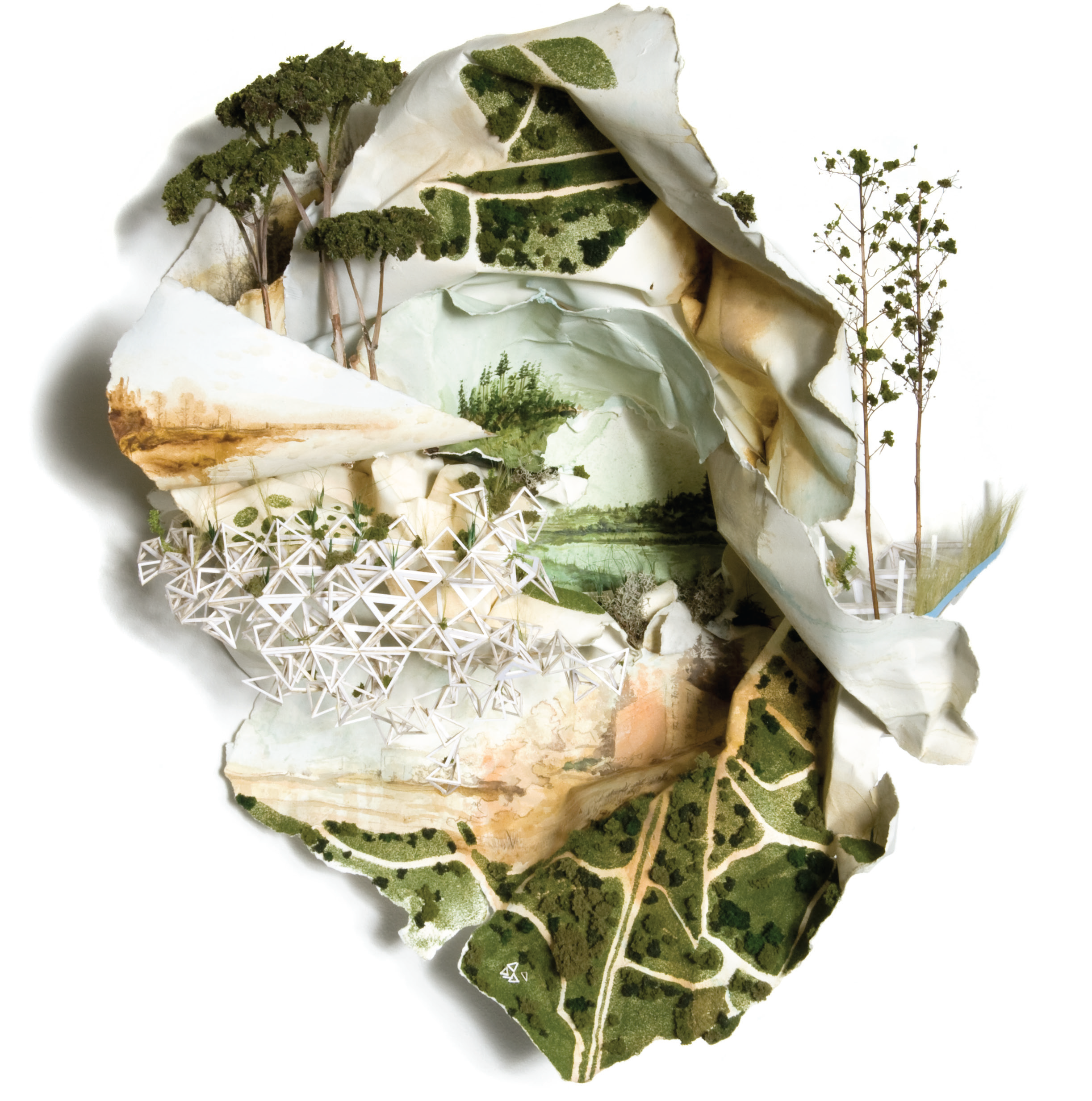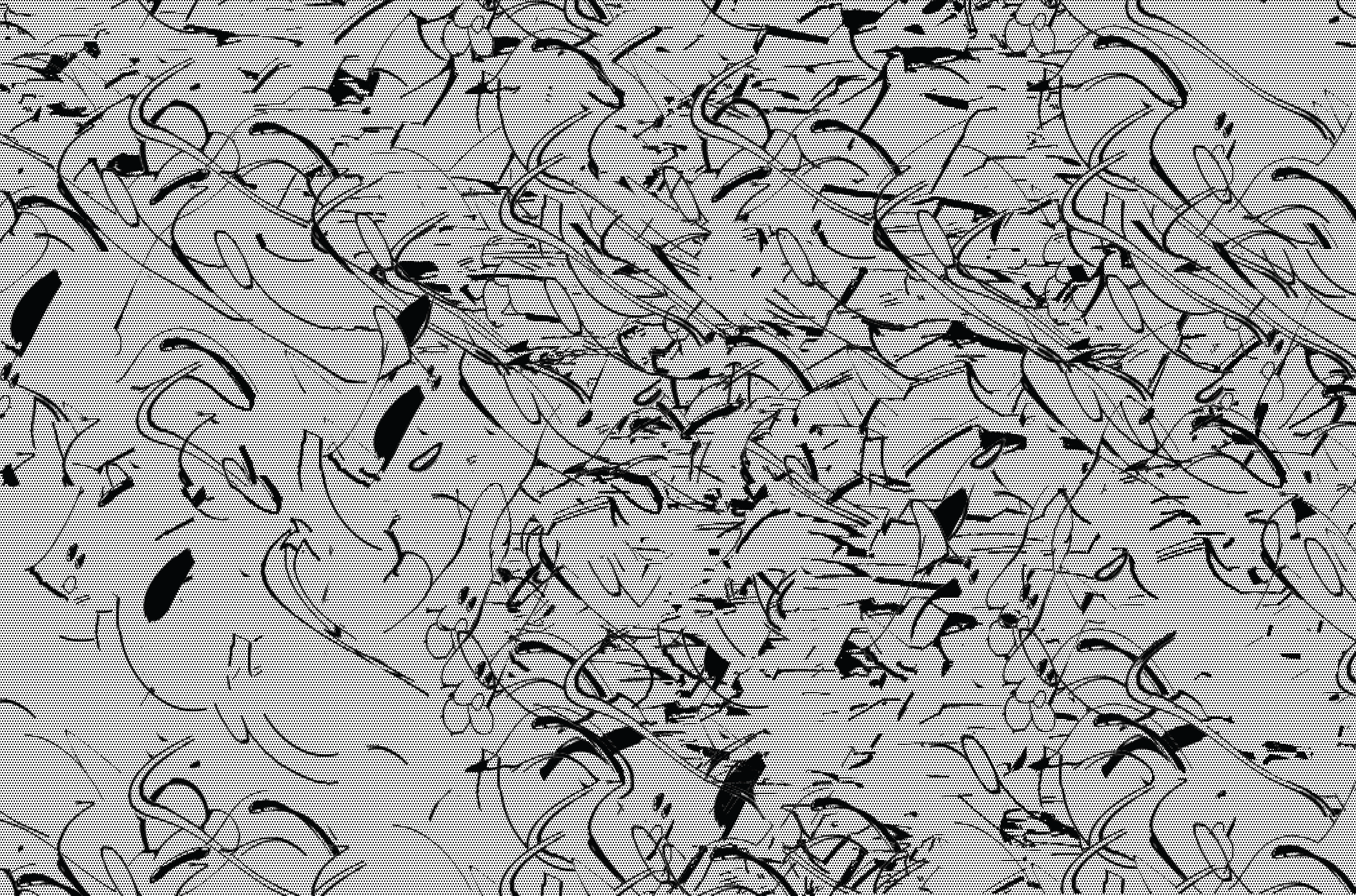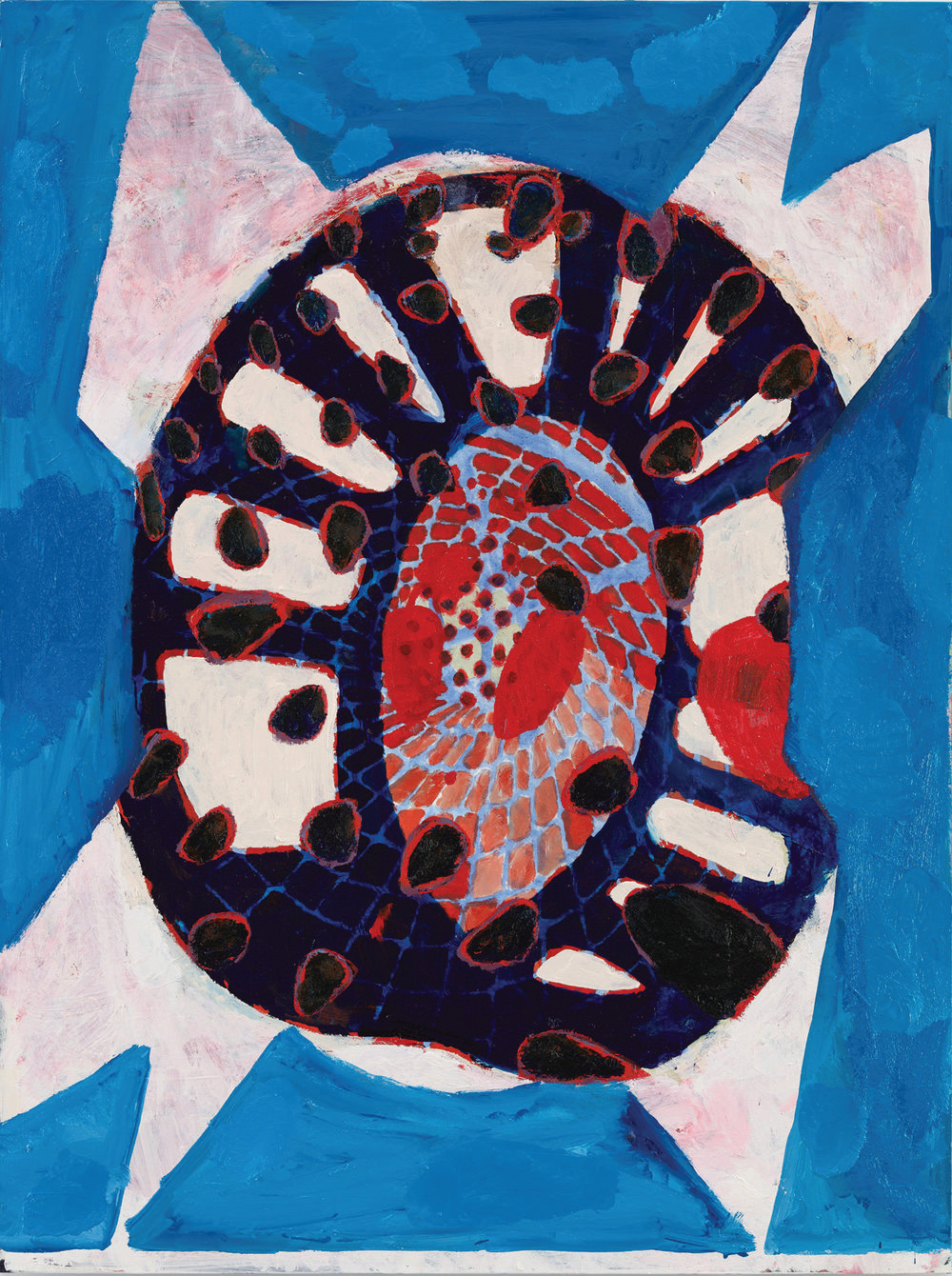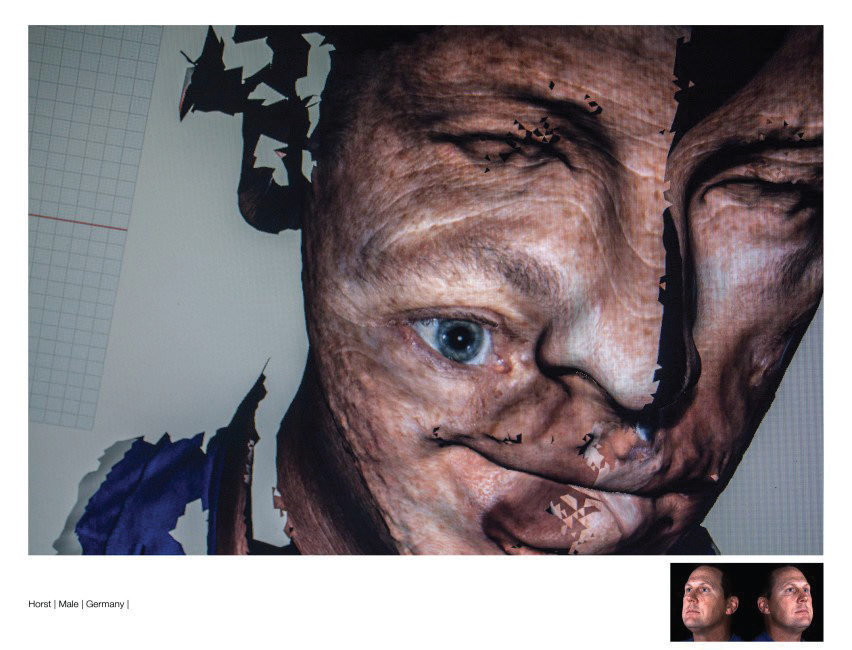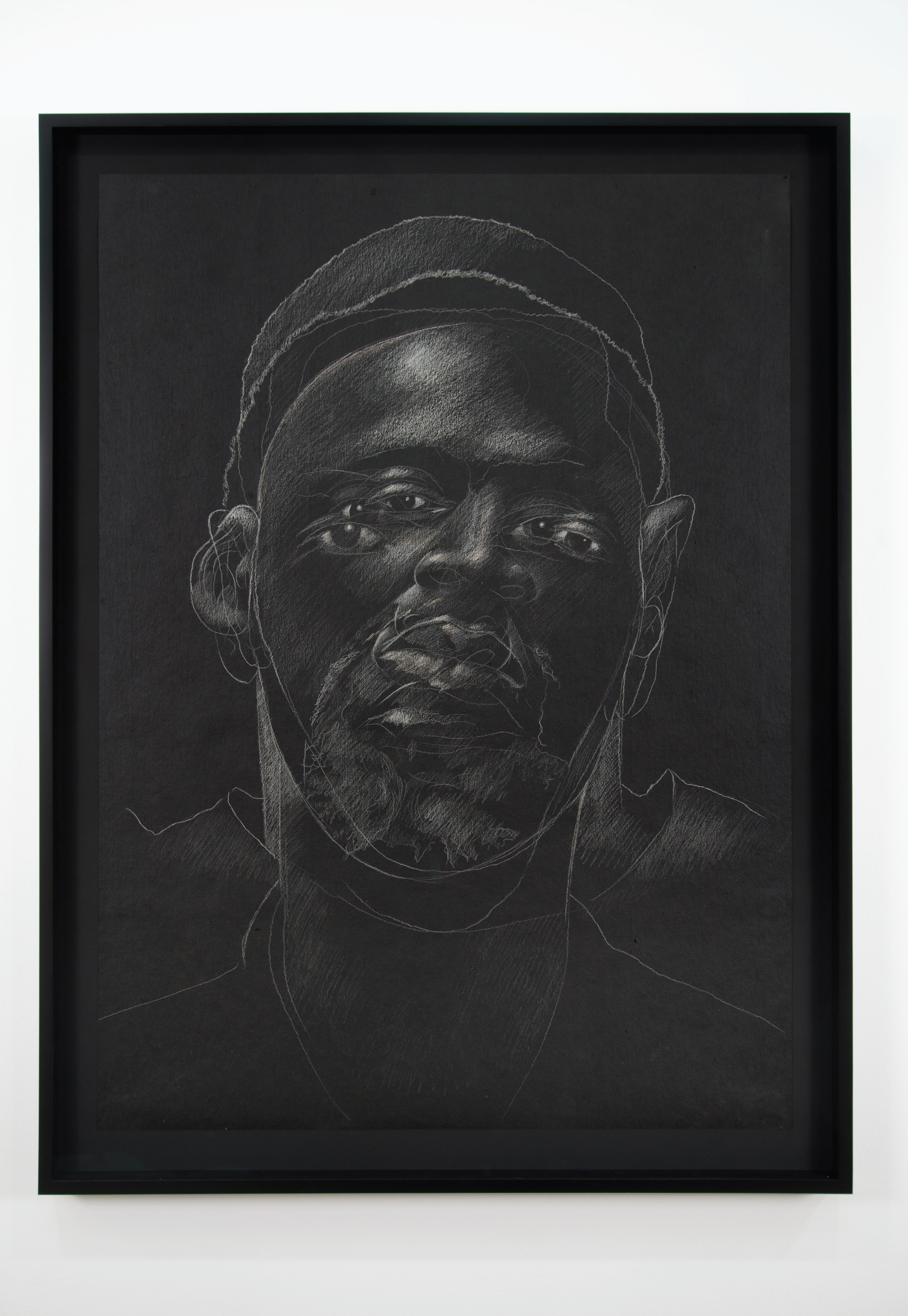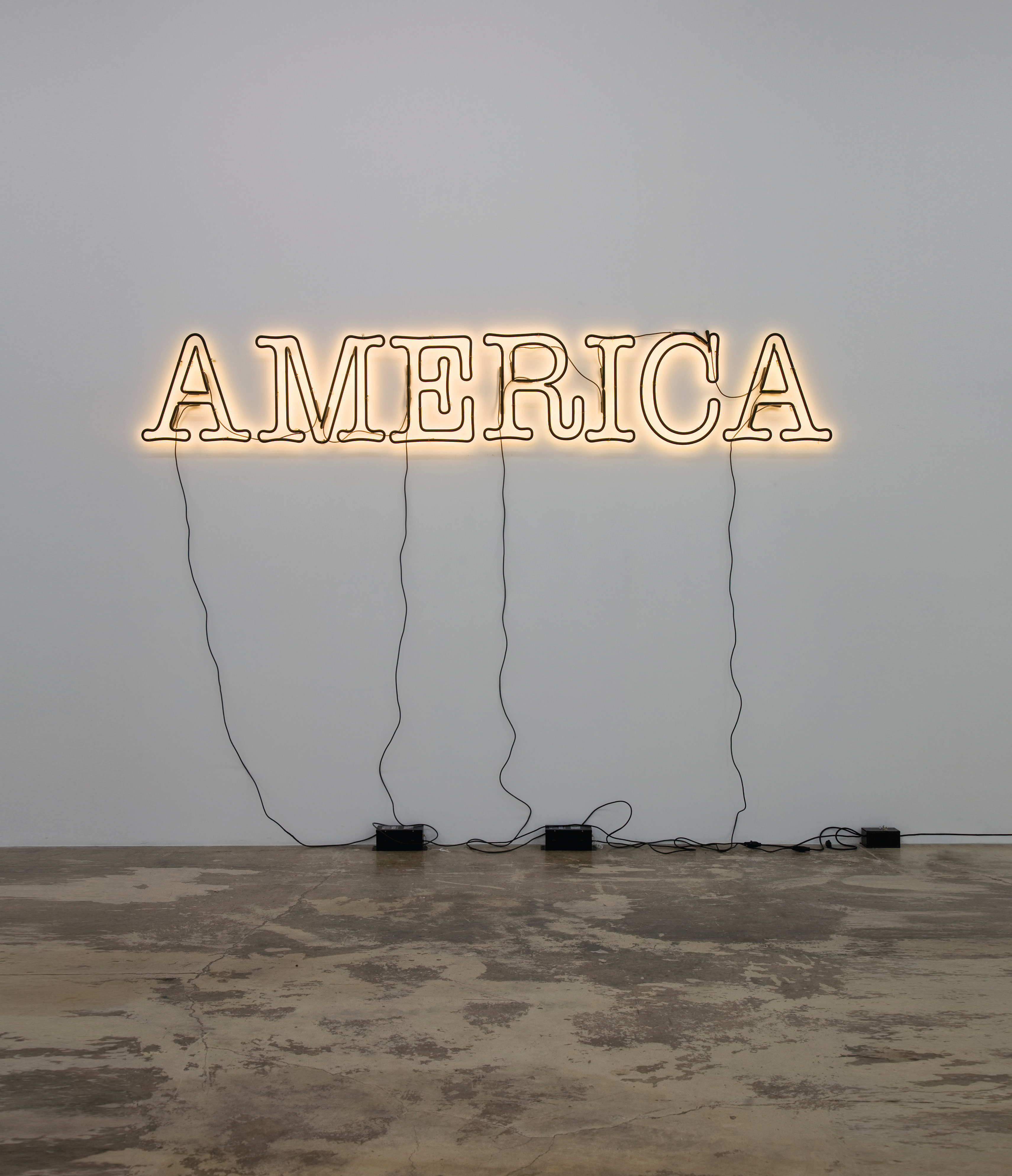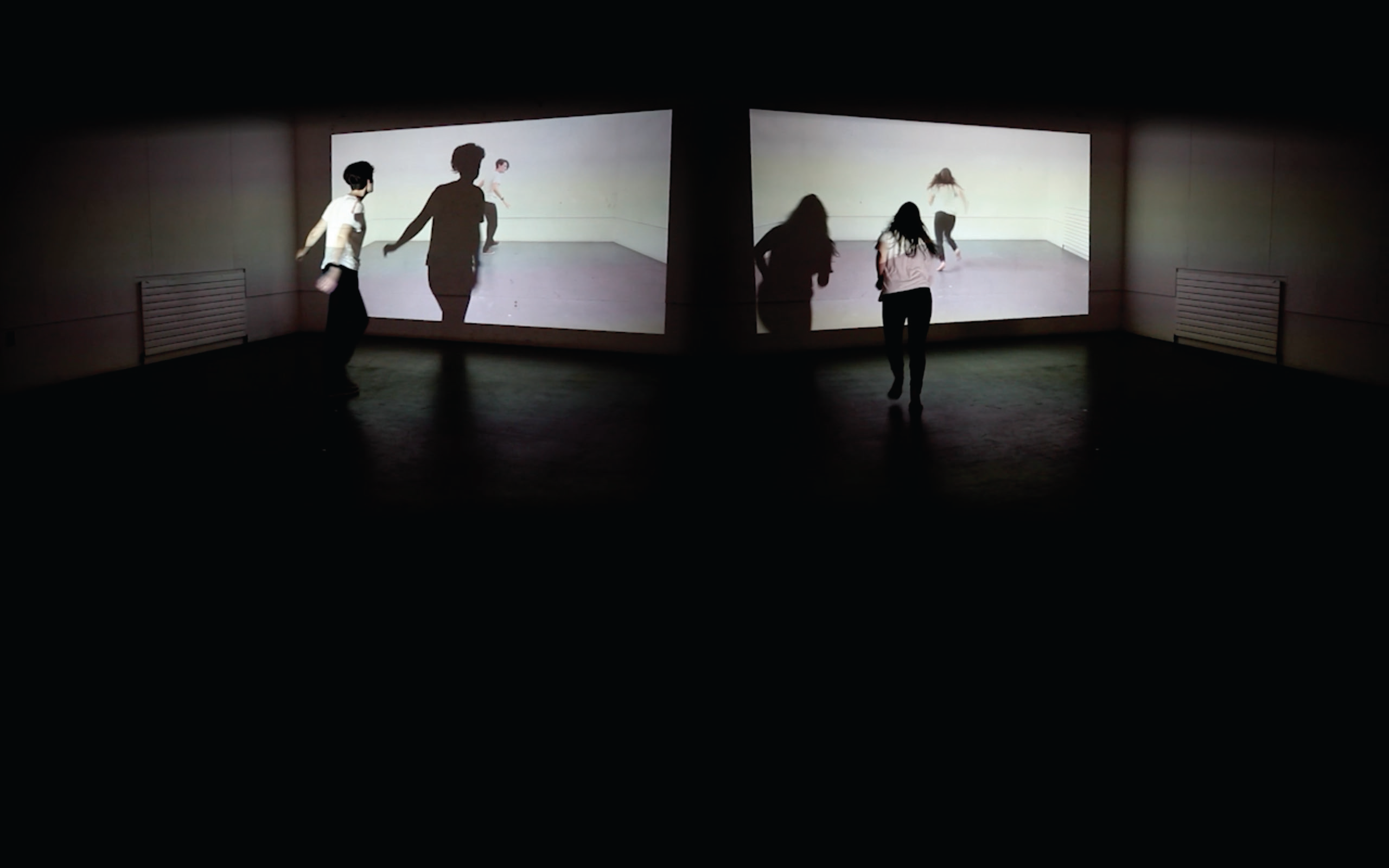Winter 2017 - Cell Issue - The Harvard Advocate

Poetry • Winter 2017 - Cell
It will have been the next day that I can tell rain
yesterday. Save that enduring force of your face
behind my eyes, outward-looking. This wills me,
as the old woman spilling her groceries wills me,
as dusted, caked, erased, pushing trails through—
as the big sun over the bigger farm house waits.
When arid or when a razed plain, I do not eat,
save the fruit that reminds me of home. Then,
porch swelling like the fully outfitted house fly,
I will have been yesterday’s woman, and rain.
Poetry • Winter 2017 - Cell
Then take the hard right where blue river reeds
obscure the bank, waist-high, where the dock,
that dumb, clean monk, has lost its red habit
to the current, limbs scoured by microbeads.
“It really ain’t that hard, you just loop the line
loose around the sticky bait, drip the knot in
your mouth, and cinch, trap wire for yellow
perch, that what your mouth is for,” he grinned.
And that was what he said. What this shored mind fills in.
Reaching back, my hand is fishing for the true
weight of his knife, warm, yellowed, and finds
a phone, no bars, the hollowed waters
parting. Hungry go those who long after fish long
after fish are gone, still, scale-silt, umber.
Poetry • Winter 2017 - Cell
evaporative forces and their
inverses brawl with
good nature—sitting idly
watching my own
humidity, sloughed and bunched
back furtively like clumps of wool.
blessing self for loving
shears—when my ears were
clipped, the dryness of the air
ate closer towards my eyes.
my muteness divulged by the rain,
roaring down through
capillaries hung limp from
the woolen clouds. not all
visual constructions are waterproof.
the channels quicken narrow, still.
Poetry • Winter 2017 - Cell
Not a solid thing, like steel or a rock.
Full of voids, the way a vault is capacity
for what is to come, and what was.
The passing of a person who has built it.
In this way it resembles bone—serpent
eating its tail, one half, osteoclast,
dissolving the other, cells foaming
from this effort. Bone-cleaver cleaved
to bone. Though what survives is just the distal
white form, a hollow—bone’s death
masks—what awe that we make out
of this brokenness a constellation: bone.
Poetry • Winter 2017 - Cell
Early morning light: a young red-tailed hawk
glided onto an overhead branch and peered
down at me, but it did not look with your eyes—
a battered and rusted pickup lies in the wash;
Navajo tea buds on the trail—I headed back
and checked, in the boiler room, the traps,
baited with peanut butter—now a gnat
flits against this lit screen: where are you now?
One morning, we walked in a Rhode Island
cemetery and did not look at a single gravestone;
we looked at hundred-year-old copper beeches,
cells burnished purple, soaking up sunshine,
and talked about the dawn redwood,
how the glimmering light at the beginning
of the world was in all things. This morning,
in the predawn darkness, Orion angled
in the eastern sky with Sirius, low,
above the ridgeline; and, before daylight
blotted out the stars, I heard you speak,
*the scratched words return to their sleeves*.
Poetry • Winter 2017 - Cell
i am up to a rich
work without ghosts—
i absolutely cannot trust
my follicles’ growth-in
straight. i squint by
the mirror, i grind
my teeth, they clack wise at
me, let me know.
i am well versed in how
water goes, whenever
i may see a faucet. the sink
cracks light and says *it’s*
*the mirror.* the sink and
i, really, are far nobler—we know
only the thrill of making
marks on the wall. lines,
and the taking of them. the work of
growing in—the sink
laughs—focal lines dance
in the creases, the all-over, i
give it up. it warms me, and
tastes sweet. fever, sweet—
the light is harsh,
linear. i have been standing
here a long time. it is
looking at myself grown
down sharp, this light.
it cuts narrow to me,
bound to swell towards some
eruption. my space to grow
lines straight seems now
a crack of the light. just.
i believed i was arrogant. i cannot
follow. i lay my eyes down
the counter, flat.
Poetry • Winter 2017 - Cell
*after Robert Pinsky and Heather Christle*
The trainer the client the desk clerk the screen
the cell phone talker the Lulu lemon the camel toe cardio
the old money type
the stud with the guns and the dark Lycra mock
the stay-at-home mom who just comes to be touched
The bench in the back and the stopwatch at click
the now two more now two more featherlight chide
This V-shaped trainer was walking toward me the space
between the leg press and the abs was narrow but not
that narrow Never very good at things like gyms or
people and I was walking toward him too I was
like *When is he going to give some room? I need room too* I was
like *Dude go bathe your dogs* in my head
The doctor the cyclist the free weights the gotchya
Mr. Universe Mr. Platitude Mr. Screenplay-Always-At-Ready-
in-Pocket
Smug middle-aged and the kid companion the Here-To-Be-Ogled
the Let’s-Make-A-Deal
maybe does a set or two but mostly reads the magazines
The plates the bells the lighting the fees
the flooring the spacing the exit the rest of us
Poetry • Winter 2017 - Cell
Tell me are you dark?
Is it dark in the box?
Show me. Do you
always have pride
in your work?
You have taught
me well. Life
is a flying pig and
you are a closet.
I live in the sky today
and refuse to look
down on my guy.
Why did you hate
your father? Why
did you turn me
into him? I live inside
shapes for days, electric
cables and clouds
give me what I need.
I’m for the man
who drives the hammer.
The ones left out
in cold, at work,
spirited, unchurched.
Poetry • Winter 2017 - Cell
Wasn’t that 12th street
wasn’t it May
6:29 pm I was late
I’d just bought
Rob’s bildungsroman
you mean memoir
the bookseller
working the cash
register told me
you’re on the wrong
floor follow me
Told him I also needed to taste
what I was up against
signing myself
over to X agency
who’ll take 15%
of the rights
of the royalties
if they successfully
peddle my memoir
(whose takeaway
is messing up love
via capitalism)
& hawk it to some
Big Five publisher
who’ll nary give
a shit not until
it officially bombs
& who’ll change
the French title
to a phrase more
marketable & also cut
the photograph
overlooking my third
apartment before
Sandy hit Brooklyn
wasn’t that 2012
6:31 pm I was skittering
across Broadway
my shoes killing me
& read Rob’s first sentence
(I needed also to *hear*
what I was up against)
“this must be the place”
it both pleased
& nonplussed me
thought unwittingly
of David Byrne
in Hollywood
c. 1984 onstage
singing “sing
into my mouth”
& “never for money,
always for love”
his white suit
& sweat stains
wasn’t that
*Stop Making Sense*
(Emily loves this song
I thought that’s
what I’m up against?)
Whacked the book
shut & muttered
*intéressant, intéressant*
stretching the *a’s*
& tittering at myself
a tiny gag my horrid
French accent
an abandoned toast
& thinking of X now
you Francophile
haven’t seen you
since that winter
3.5 years ago no
that was Scholes St.
when you wheezed
& said I’m uncertain
I’m that person
who waking loves
you anymore
yes, *you*
you said
& headed eastbound
when I looked up
& also marching
across 12th street
there was another X
I half-loved
that following spring
3.5 years ago she
gave me this
two-fingered salute
touching her brow
was she leaving
her seminar maybe
dinner with dad
I wouldn’t decide
thought unwittingly
instead of her
rheumy & I guess
also pellucid
eyes those nights
on Powers St.
on my stoop
when the stars
I said stunk of
beef tallow
My slack mouth
making a shy noise
when I saw her
it was like *oh*
but a century longer
“Out of all those
kinds of people,”
my shoes sang
& killing me
“we drift in and out”
& you could call
her name but no
you *live* here now
*ain’t that America*
on the radio
when the taxi
swerved around me
& the drug dog
licking anxiously
the other bigger
drug dog’s paws
that was Broadway
words like *jornada*,
*chaparral*, *beldam*,
*snow* *blindness*,
*malanders*, *ilex*,
*rebozo*, *chivaree*,
*death* *camas*
I bed down here now
new whorls
of blonde hair
& fur in my mouth
but when I wake up
4:01 am unsleeping
& the apartment’s
glum-smelling
like blue milk
& mustard seed
inside the amphora
there’s a third smell
a pair of ox-eyes
with their bruised
& drooped heads
isn’t it those flowers
some mornings
who aren’t always
already dead
when I wake up
& smell what
I’m up against
Poetry • Winter 2017 - Cell
Night yawns its dark
door left ajar,
and I declare nothing
but this white intention
to say goodnight
clearly. This is clearly
a manner of speaking
against but regrettably
through this break-black,
over-interpretative reek,
through this way of speaking,
where *break* is consonant
with *bleak*, through all
that’s left for us. Along
with this goodnight,
which reminds me,
there was no snow,
is no snow this year.
We cannot forget
to consult the pond.
Not unlike your dreams,
the pond is a magic,
the mirror of what’s
fair, of creatures, of water
cohering with water, as all
above my head is how
tonight now feels.
Acrid clouds a black
shade of bleak. I shift
my footing a tad
and hope things change,
and already
you’re fast asleep.
Poetry • Winter 2017 - Cell
In dreams, Mary comes draped beneath a veil, Dead
Sea breaking at her feet, arms outstretched in that maternal
welcoming. She wades waist-deep, covers her scars, not
wanting to scare the children. Every mother’s duty:
Keep the unholy origins hidden, those hauntings quiet.
Like her, I cloak my immaculates in robes, send them off
to learn. Soon they'll wonder, though, about the white
detritus on my tongue when they come home, as I nod off
mid-endearment, weighing hope against their smiles, our
heavy goodnights before the tiny Mary in my well shakes
her bottle full of pills, beckoning:
Take, eat,
in remembrance—
And who am I not to answer my own heritable call?
Poetry • Winter 2017 - Cell
When encountering an emotion
they say you should visualize
it somewhere in your body
I feel this spray of wild dill
barely hanging on in a light breeze
but it clanks too like a tool chest
I like listening to the geezers
play chess and discuss
Normal Mailer novels
at the tiled table with folded up
paper under one of its legs
The man behind the counter
toting skullcap and attitude
I don’t know he’s interesting
I imagine myself so
inexact by comparison
I like the idea that I’m progressing
spiritually that I can maybe
sit longer inside the uncertainties
surrounding meaning
I sit here because it feels
like I’m not in the city
like I could leave life early
The loud types at the table
in the back make it clear
the world has nothing to teach them
I could learn something
from them too if I paid attention
long enough not that I will
Poetry • Winter 2017 - Cell
Driving interstate 81 by Frackville
you might notice the long lines in the rock
on the flat walls to your right, those lines,
you might ask me, what are those lines?
I’d have to explain how they drill these
veins into the rock, how they fill these
rocks with dynamite, how they will these
mountains into molehills and brush them
off their coats God bless the borough of
Frackville God bless Schuylkill county.
My great grandfather made those lines
sitting at his desk with pencils with no
erasers eating sauerkraut and potatoes
in a place that prided itself on not being
undermined God bless the borough of
Frackville God bless Schuylkill county.
I have come here to take credit for this-
look his math stands correct forever in rock-
proceed without caution ungrateful out of staters.
I have come here to take credit for every bid
in pinochle, son who learned to park six inches
from the curb, line of dynamite that went right.
I have come here to take credit if you would
look around you and see the world he has
built and thank me for he is not here now.
I have come here to take what is due to one
who like anthracite has been sunk buried
pressed to make fuel like grapes to wine.
I have come here to be Dionysus with vine in
one hand coal in the other and you maenad
follow me into this mine like a mangy mule.
I have come here to show you the bottom of
the mine which mules do not leave until shot
which my family left three generations ago.
I have come riding on a mule today with my
great grandfather walking it as an American
nativity pageant heading for Philadelphia.
I have his life insurance evaluation his calipers
from Frackville Service Equipment Corporation
his Pottsville Explosive comb case to show you.
I will show you no more, for you need to look for
his autograph. God bless the borough of
Frackville God bless Schuylkill county.
Poetry • Winter 2017 - Cell
from above he focuses the lens on the spots under
the rim of her brow. Kisses to the skin. Those you cannot take. She tells him
that which makes up this world is the beautification of our mistakes. The
error, the error preceded by the other, an error, and Jacqueline
is so beautiful, even the painter, even the young man turned old, will marry her,
and draw her, and remember her shape, every day, as though he were missing from it…
So that when the sun sets the orchids mellow.
Who is left to make a picture of these creatures.
When the clouds quiet down over the rooms in the house.
These floors, to walk them, is beautiful,
though they were made for Jacqueline. He leaves the lights on,
the plants dried, sometimes even the paint
hardens overnight. The cheekbones of
a woman will lift the more her mother misses her…
In one year he paints her one hundred
and sixty times. To count the days that belong
still to the sky.
How beautiful she was.
She tells him.
When even the film dries out
he paints her neck as long as he can make it. He leaves her
all his sculptures. Were she here, he would not find her. Were she
a desert bird and not a Parisian queen she would have imprinted on
this wall long ago, and wakened the shadows that run amok it, and tried,
blooming flower from blooming flower, to summon
the small air that makes the ground lift one step closer to its firmament.
Poetry • Winter 2017 - Cell
2013,
I
on a dizzy morning in june
my eyes were rubbed against the view
of that piazza
you should see those kaleidoscopes
- even as a child of ten
i could never take my eyes off of them-
for the very first time, as if in a dream
i saw the reality;
my beard grown out,
and my voice cracking,
and seeing
words could be tender
no matter what
i was thinking of those desks
those school desks dangling in my mind
as like question marks
in those school days still capturing my mind
and to those dangerous questions
we used to raise our hands
under the shadow of the rotten stringers
so many unanswered questions has left
a couple thousands of us
trying to explain
the close range between innocence and rage:
rage is cruel without innocence
innocence is submission
without rage, said a man
(on his eyebrows there was blood and sand)
on that morning
we had already burnt down the desks
our kaleidoscopes were in pieces
no rust left on the stringer
no lies in our words
II
the day was booming.
colosseum tumbling down
for the very first time
the earth was seen as it was:
the surface split in two,
two different orchestras, earth in polyphony,
one telling us kurt huber’s dead
the other playing shostakovic, the 7th symphony!
On that very day
just like a dissident string
breaking loose from a violin
the city broke loose
from the earth.
Poetry • Winter 2017 - Cell
don't expect to be praised every time you raise a middle finger detonator where an ending meets a beginning there's no way around it you are busy modulating retractions this silence is curved it is a road friendship tripping over us keeping us informed you suspect these constants are disguises desk hangar drawer words as doors as if they had been expecting you a perfect pitch does not always deal with basics the ruination of the tango to indulge every impulse & head for deadends tell me you've got my back give me a moment to zoom in on the data each lunacy is there to be spent when the sun became needy i sent him a mail
Fiction • Winter 2017 - Cell
A star-smeared night, the usual briny and humid haze of the brush country in August, and Dixon was hauling twenty cases of stolen toys up from the Rio Grande Valley. They were in the bed of his truck under a blue tarp. He took care to drive the speed limit and flash his blinker. If the border patrol at the Sarita checkpoint asked, he’d claim a delivery mix-up. If the guards were white, he’d blame it on Mexicans.
Fiction • Winter 2017 - Cell
Their navels pop out, poking like thumb-tips against the ribbing of their tank tops. A soft skirt, a pair of track pants, tiny shorts, waistband cupping the circumference of the belly’s bottom rim. No maternity jeans—this heat! A sundress, anything with cinched elastic, breeze. Flip-flops with flattened rubber soles. The flapping accentuates their widened gaits.
Features • Winter 2017 - Cell
From Chapter 6: “Undergraduate Reflections” (1945-1947). Note: This excerpt begins just before John Ashbery’s sophomore year at Harvard (Fall, 1946)
The “strange melancholy” Ashbery felt all summer made him especially eager to “plunge...back into the Harvard routine.”1 “Fiddling” with the Harvard Catalogue, he contemplated courses in Slavic or “Greek...so that I will be able to write poems with little Greek quotations at the top like T.S.Eliot.”2 As the start of John’s sophomoreyear drew closer, he had an “apocalyptic flash...that I am badly read.”3 He searched for a course on Pope, Swift, Dryden or Spenser. (During his senior year, he nally took a year-long Spenser tutorial.) On the one hand, he wished to “go into retirement in a delightful inner world,” and do nothing but read and write, but he felt “always dependent on my friends for ideas, entertainment,and affection.”4 He arrived at his Dunster House dorm room (G-46) to discover no chance for either. A stranger, an upper-crust returning GI from Boston, who introduced himself as Abbot Montague Geer, lay on a newly installed bunk bed in John’s former single. They were immediately uneasy roommates: “I continue to lead a monastic existence, hardly disturbed by the presence of Geer, who makes no demands on one’s mental or conversational powers.”5
He moved out of the room as soon as he could. Leslie Wallwork (Dunster House, G-14) invited him to stay. Although Leslie’s noisy, messy, flamboyantly gay style became “very trying” at times, it was preferable to Geer’s insulting silence.6 Leslie was also supportive of John’s emotional dramas. Their room was on the first floor directly across from the building manager’s room. Homosexuality was grounds for expulsion at Harvard and no overnight guests of any kind were allowed in dorms, so John’s new boyfriend had to sneak out the window late each night.7 He began to get a reputation, but he wrote to his friend Sandy Gregg that he didn’t care: “I don’t give a healthy damn.... I have been living rather dangerously of late... feel saturated with vice.” He actually felt increasingly ill from late nights and “depressed.” His mother wrote with more bad news. John’s paternal grandmother, Elizabeth Ashbery, very ill since her stroke three years earlier, had passed away.9
John found solace in reading poetry. The previous summer, he had written to Sandy, mentioning in a postscript that “you should investigate the poetry of Wallace Stephens (or Stevens, maybe) [Louis] Untermeyer’s selections of it are poor!”10 Between his uncertain spelling in the summer of 1946 and the spring of 1947, his appreciation for Stevens’s work rapidly grew. This shift began when he discovered “The Emperor of Ice-Cream,” a poem from Stevens’s first book, Harmonium, which Untermeyer had not included in his Anthology.11 The poem’s subject is a dead woman lying on a bed “cold” and “dumb,” but this fact is revealed primarily through other descriptive details. That a poem about the ordinary things we live with could be so powerfully about the strange experience of witnessing death was astounding to John; he felt as though he had nally discovered an extremely good version of what he had been long trying to express about the experience of death. By the time Wallace Stevens made a very rare public appearance at Harvard on February 11, 1947 to read his poems, John was in the front row, a good thing, because “nobody could hear him beyond the fifth row.”12 He was surprised that Stevens “stood like a statue and wore an overcoat and scarf the entire time.” Despite the nearly inaudible, stiff reading, John loved his poems even more after hearing them.13
Stevens’s poetry was an exception; Ashbery often felt repelled by contemporary writers. The previous summer Aldous Huxley’s Point Counter Point (1928) had angered him as “somehow vulgar. It ain’t art.”14 He increasingly looked to earlier models.15 In his otherwise “dull” fall course, “English Literature: 1630 to Restoration,” Kenneth Murdock remarked that “Donne is trying to discover a poetry that will fit the needs of men of his age.”16 In the class, “English Literature Since 1890,” Theodore Spencer ar- gued that “Hardy, James, and Conrad” tried “to investigate all of life.” In John’s favorite fall class, “The Epic,” classicist John Finley emphasized “what in [literature] transcends history and is valid for all time.”17 In an essay on the Inferno that Finley judged “intelligent and well-written,” Ashbery concluded that Dante’s depiction of the relationship between contemporary experience and eternal truth was crucial for modern writers to understand:
Dante’s value for us lies, then, not in his conception of the universe, for it is one in which we can no longer share, but beneath it. It is rather the fact that Dante was able to create an idea of the universe applicable to his own time that is important. For just such an idea is what we desperately need...Dante is a constant incitement to the creative minds of our century, for whether or not we believe in any religion, we cannot gainsay his assurances that eternal truth, harmony, and proportion continue to exist in spite of man.18
He argued that “what we desperately need” is “an idea of the universal applicable” to our own time. He read Dante’s “assurances that eternal truth, harmony, and proportion continue to exist in spite of man” as an “incitement” for his own poems. He had always worried that if he used details from his present life in his poetry, he would cheapen the moral emotional universe his poems described. Dante’s Inferno, however, includes specific details of moral failings in fourteenth-century Florence in service to the story of a awed man’s journey toward enlightenment, a poem still so powerful that Ashbery viewed it as an ideal poetic model.
He skipped classes and read modern poetry with increasingly critical fervor. He regularly updated his assessment of modern poets in letters to Sandy: “Did I tell you about the new additions to Ashbery’s Denitive list of major modern poets (which Frost would give his right tit to be on)—John Berryman, Byron Vazakas, Wallace Stevens.”19 John’s brief enthusiasm for Byron Vazakas, an American of Auden’s generation who had recently moved to Cambridge, was primarily a rejection of Robert Lowell, whose poetry John disliked. (Lowell won the 1947 Pulitzer prize for Lord Weary’s Castle, for which Vazakas’ first book of poems had also been nominated.) Ashbery complained that Lowell “commits the common fault of stringing together a lot of images so overweighed with meaning that they cancel each other out and mean nothing.”20 He composed a parodic stanza—“Mudgulping trawler, / Truro in the ooze / Past Peach’s Point, with tray of copper spoons / For Salem’s Mayer Caldecott to suck, / For his doll’s calico corpse, red-needled in the book”—to prove that “anybody can write like” Lowell.21 Although he praised several modern poets—“Robert Frost is good. So is Patrick Anderson (Canadian), William Empson (English) and John Berryman. Auden really is the best of all forever and ever. I just read Caliban’s long prose speech in Sea & Mirror for the first time. Brilliant and exhausting. I cried a little”—he soon after revised his list.22 Eliminating several favorites since he was a teenager, he concluded:
My opinion of [Frederic] Prokosch as a poet is not high. At the age of 16 I cherished one of his poems—“The Birdwatcher.”...Perhaps Berryman isn’t as wonderful as I’d thought. ...As long as I’m on the subject of writers I hate, I may as well go on with the complete list: George Barker (ugh!), John Malcolm Brinnin, Henry Treece, Nicholas Moore (when is someone going to puncture his balloon), Howard Moss, William Abrahams, Oscar Williams, Edith Sitwell. Why not be brave and throw in T.S. Eliot too... a coldly intellectual juggling of symbols appar- ently not contrived to move the reader, but written with some other mysterious end in view.23
He reserved his deepest and most consistent praise for just four writers: “The only modern poets within whose portals I occasionally stand awed are Marianne Moore, Auden, F.T. Prince, and occasionally Stevens.”24
The Harvard Advocate, “a literary mag which is currently being exhumed from a well- earned grave,” accepted Ashbery’s “A Sermon: Amos 8:11-14” for its first post-war issue.25 Despite the undergraduate magazine’s illustrious literary history, which had published student work by T.S. Eliot and Wallace Stevens, it had been suspended for several years ostensibly due to soaring costs. Its April, 1947 cover celebrates the magazine’s rebirth dramatically in a drawing of a phoenix rising out of the fire. A Harvard Crimson reviewer criticized the magazine’s first new issue as “thrown together haphazardly,” but praised Ashbery, the only undergraduate among three exceptional writers, including “Richard P. Wilbur...and Ruth Stone.”26 To friends, John downplayed his excitement about the Advocate’s reappearance, but his first contributor’s note—“...he had two po- ems in the November, 1945 issue of Poetry under the pseudonym Joel Michael Symington”—proudly repossessed his stolen poems. He began spending more time at the Advocate ofces on the second oor of 40 Bow Street, especially if Kenneth Koch was around. Three of Koch’s poems were published in the same November, 1945 Poetry issue as Ashbery’s stolen poems, and John had read and admired them.
Their new friendship furthered a conversation about poetry that each had already been having alone. As John said to Kenneth much later: “[W]e seem to have been work- ing along parallel lines as usual.”27 Two-and-a half years older, a veteran of the Army who had served as a rieman in the Ninety-Sixth Infantry Division, and an ambitious, condent junior, Kenneth had irrepressible intellectual energy.28 He already held a position on the Advocate staff and encouraged John to enter into competition to become literary editor. John, however, had heard that no homosexuals were allowed on the literary board. Assuming that Kenneth did not realize he was gay, John said he could not apply. Kenneth was aware that neither blacks, Jews, nor homosexuals were welcome on the board and had already ignored these rumors for his own sake. In fact, Advocate administrative records show that in the year leading up to the reopening of the magazine, all these scenarios for exclusion were discussed but never ofcially enforced.29 John was not chosen, even after completing “funny stuff like my having to paint the office door (I actually did that).”30 The rejection stung: “No goddamn you, I did not make the Advocate as I am in the habit of acidly replying to numerous inquirers.”31 A few months later, he took a different tack: “The A is really quite a stylish little Mag; I was assured by a reliable source that only sheer graft kept me from getting on the lit board, and that if I try again in the fall it’ll be a pipe.”32
ENDNOTES CHAPTER 6
1 Letter from John Ashbery to Bob Hunter, July 27, 1946 and September 3, 1947. Robert Hunter Private Collection. Thetford Hill, VT.
2 Letter from John Ashbery to Bob Hunter, July 27, 1946. Robert Hunter Private Collection. Thetford Hill, VT.
3 Letter from John Ashbery to Bob Hunter, August 15, 1946. Robert Hunter Private Collection. Thetford Hill, VT.
4 Letter from John Ashbery to Bob Hunter, July 27, 1946. Robert Hunter Private Collection. Thetford Hill, VT.
5 Letter from John Ashbery to Sandy Gregg, Nov 26 1946. Richard A. “Sandy” Gregg Papers. Houghton Library, Harvard University.
6 Author interview with JA August 2, 2011. Judson, NY.
7 Author interview with JA, March 17, 2014. New York City.
8 Letter from John Ashbery to Sandy Gregg, March 8, 1947. Richard A. “Sandy” Gregg Papers. Houghton Library, Harvard University.
9 His grandmother died on February 20, 1947.
10 Letter from John Ashbery to Sandy Gregg, August 13 1946. Richard A. “Sandy” Gregg Papers. Houghton Library, Harvard University.
11 Author interview with JA, June 4, 2014. Hudson, NY.
12 Letter from Richard Eberhart to Kenneth Rexroth, February 16, 1947. Box 31 Folder 38 “Correspondence 1947.” Eberhart Papers. Rauner Library, Special Collections. Courtesy of Dartmouth College Library.
13 Harvard Crimson February 11, 1947; Author interview with JA December 31, 2011. Hudson, NY.
14 Letter from John Ashbery to Bob Hunter September 6, 1946. Robert Hunter Private Collection. Thetford Hill, VT. Typographic errors on the word “its” in the letter have been corrected so as not to distract from the point.
15 Ashbery’s note-taking system was such that the largest number of notes created and saved were for science courses that he found difcult to pass. He rarely took notes in English class unless he was working out an idea, disagreed with the lecture (in which he usually included a wry aside in parentheses), or did not know the information.
16 “Dull” from author interview with JA, January 1, 2013. Hudson, NY; notes on Donne from AM6 Box 31. Ashbery Papers. Houghton Library, Harvard University.
17 JA notes on the courses: Humanities [in General Educations] 2a The Epic. September 26, 1946. AM6 Box 31. Ashbery Papers. Houghton Library, Harvard University.
18 Essay: “Modern Implications of Dante’s Inferno.” Fall, 1946, for Professor John Finley’s General Education Course Humanities, 2A (“The Epic”). AM6 Box 31. Ashbery Papers. Houghton Library, Harvard University. 19 Letter from John Ashbery to Sandy Gregg, March 8, 1947. Richard A. “Sandy” Gregg Papers. Houghton Library, Harvard University.
20 Letter from John Ashbery to Sandy Gregg, July 9, 1947. Richard A. “Sandy” Gregg Papers. Houghton Library, Harvard University.
21 Letter from John Ashbery to Sandy Gregg, July 9, 1947. Richard A. “Sandy” Gregg Papers. Houghton Library, Harvard University.
22 Letter from John Ashbery to Sandy Gregg, June 20, 1947. Richard A. “Sandy” Gregg Papers. Houghton Library, Harvard University.
23 Letter from John Ashbery to Sandy Gregg, July 9, 1947. Richard A. “Sandy” Gregg Papers. Houghton Library, Harvard University.
24 Letter from John Ashbery to Sandy Gregg, July 9, 1947. Richard A. “Sandy” Gregg Papers. Houghton Library, Harvard University.
25 Letter from John Ashbery to Sandy Gregg, Undated. Richard A. “Sandy” Gregg Papers. Houghton Library, Harvard University.
26 John McC. Howison, Harvard Crimson, Tuesday, March 25, 1947; Anonymous, Harvard Crimson, March 27, 1947
27 Letter from JA to Kenneth Koch March 20, 1955. Ashbery Private Collection. Hudson, NY.
28 Letter from Kenneth Koch to Daisy Aldan, August 29, 1953. Koch includes his own biography. Box 3 Folder 7. Daisy Aldan Papers. Harry Ransom Library.
29 Harvard University Archives: Box 18 HUD 3121, Harvard University. Relevant correspondence includes: May 7, 1946 from Samuel H. Ordway to Hoffman Nickerson: “I am inclined to think that if the returning editors can state and enforce a set of objectives and standards and policies which meet the Trustees’ desires... provided the editors are of the right sort”; September 11, 1946 from A.G. Hanford, Dean’s Ofce, Harvard College 4 University Hall to Hoffman Nickerson: “...I am glad to know that a person like yourself is taking an interest in the Advocate and a hand in its present affairs...Recently I have had complaints from students and parents regarding the goings on at the Advocate before and during the early part of the war—the heavy drink- ing, obscene initiations, and over-interest in abnormal sex matters....”; March 1, 1947 from Nickerson: “The one point on which I denitely disagree with you is the Jew-Nigger business. As I am sure you already know, I see no good reason for mentioning that matter in the way that you suggest in connection with the Advocate, and many good reasons for not doing so”; March 29, 1947 from 40 Bow Street, from Donald B. Watt Jr., to Nickerson “...Obviously it will be impossible to write into this constitution anything along the lines which you advised in our private talk. Howison, Gilmour, and I have talked about this matter at some length and have agreed that, as a matter of policy, it would be extremely dangerous to follow the course outlined. We do not feel, in the rst place, that we can support such a principle; but more than that, we know that the Advocate would be wrecked if such a policy became known, for a large part of our public would withdraw support.”
30 Letter from John Ashbery to Sandy Gregg, June 1, 1947. Richard A. “Sandy” Gregg Papers. Houghton Library, Harvard University.
31 Letter from John Ashbery to Sandy Gregg, April 8, 1947. Richard A. “Sandy” Gregg Papers. Houghton Library, Harvard University.
32 Letter from John Ashbery to Sandy Gregg, June 1, 1947. Richard A. “Sandy” Gregg Papers. Houghton Library, Harvard University.
Features • Winter 2017 - Cell
Rana Dasgupta is a British-Indian writer. He lives in Delhi; his 3rd and most recent book Capital is a non-fictional exploration of the Indian capital’s new elite class and their place in the global turbulence of the early 2000s. His second book, the novel Solo, won the 2011 Commonwealth Writers’ Prize, and his first novel, Tokyo Cancelled, has received wide acclaim.
Dasgupta spoke with Fiction Board member Henry Shah ’17 in New Delhi on a hazy day in late August, 2016. Below is a transcript of their conversation, edited for length and clarity.
ADVOCATE: Can you place this book within your wider work?
DASGUPTA: How can I explain this phase of mine? Reading H.G. Wells is a good example of somebody who has very powerful concepts to describe the world in a mixture of ction and nonfiction. There’s this idea of the writer who is a thinker and essayist and novelist is not very contemporary, but I like it. The novel I’m writing right now builds a lot on the subterranean aspects of Capital. There were a lot of things in Capital I couldn’t write about because I owed some kind of protection to people I interviewed. Their sex lives, their addictions, their dream lives, their intimate things were not things I could write about. And yet as mad as that world was, many of the characters were far madder than I could write about. Some of that goes into fiction, but I think that this back and forth between fiction and nonfiction is a very appropriate response to this time, especially when one is writing of places like Delhi. A lot of one’s duty as a writer is simply documentary because this thing of globalization leaves a lot of people bewildered by the sheer factual basis of the world they’re living in. They are connected to things they have no factual knowledge about. That factual knowledge cannot be all delivered by all CNN. It’s not all statistics. Going out and just writing what people are living is part of the writer’s response to this moment in which the world is becoming strange to itself. At the same time, I think that if we stay with what exists, we can’t engage with what we can imagine. We desperately need to imagine things at the moment. We’re weighed down by what exists, by the certainty that the world is coming to an end.
ADVOCATE: Would you discuss the framing of your book?
DASGUPTA: The epigraph to the book is from Brecht. It refers to a moment in Berlin that seems akin to this moment in Delhi. This story goes back to the 18th century and is the long story of modernity. It is the constant rolling out of the world system. I don’t see this as an “Eastern” story to complicate a “Western” story. It is the maturing and further unfurling of something. It is a book of classical modernism. Marx is very important. Other people have also given a sensibility here, like Baudelaire. The sense of euphoria and horror is the constant modern dichotomy of feeling. In a way, I think it’s the only true feeling of this time, which we see in Goethe, in Nietzsche, in Marx. It’s important to be true to both halves of that feeling. If you are, as the BJP was, blind to the destruction and fallout of the present, you are just mad. If you can’t understand the euphoria and dy- namism and the hope, you are just ungenerous to the grandeur of history. Many things are happening which can’t be reduced to horror. I’m trying to expand myself and go in all directions.
ADVOCATE: Delhi seems to embody your modernist oscillation between euphoria and anxiety. Your interlocutors’ words pulse with fear and buried desire. How did this negotiation of feeling work on a conversation-by-conversation level?
DASGUPTA: It felt like therapy. The most interesting characters I met were men. They were most interesting because they were far more wounded and haunted than the women, who I found had normal responses to the city in many ways. The people on the receiving end of misogyny are sometimes not the ones who can relate it the best. The perpetrators here are the maddest of all. The other thing is, women were talking to each other. The conversations they had with me were not particularly remarkable in their lives. Men had often not said these things before. They were repressed, especially the wealthier, more macho figures. They had no conversations in their lives at all to speak of anxieties, parents, women—except in lurid ways. I had no stake in their performance. I just asked very earnest questions as an outsider about very serious things in life. These became remarkable conversations in their lives. They would even call later and say, ‘can we talk more, there are more things I’ve got to tell you about.’ It did become ambiguous who needed this conversation more, them or the writer.
ADVOCATE: Your portrait of Delhi is rich and expansive, but has a connected thread. Can you describe the thematic or lived unity of these experiences?
DASGUPTA: I don’t think it’s an artificial structure I’ve imposed on this group of people. The traumas of Partition have been focused and intensied over this generation. The energy over which money has been made and the city has been regrouped are pretty mad energies. All other cities are far more hospitable to outsiders than Delhi, which has no even official desire to receive and settle outsiders. They will live in tents for the duration. When the US edition first came out of Capital, they sent out a draft cover. There was a Rolls Royce driving down the street next to a woman selling vegetables. It was kind of comic anyway in its desire to prove easy contrast. It was also clearly in Bombay—the woman on the sidewalk, contrary to what the New York editors thought, was not some kind of pathetic, downtrodden individual. She was a well-dressed, dignied tradeswoman. To a Delhi observer, she looked extremely in command of herself. That same population in Delhi is far more vulnerable and at the mercy of all kinds of violence. You have to understand that this city is very militarized and policed. All these South Delhi neighborhoods have these ‘residents’ welfare associations’ that employ military men. They patrol the streets; their whole drive is to put up more steel between the poor and the wealthy populations. When you see the vehemence of these measures, you know you will see all kinds of intense phobias in the minds of the elite. Many see rape as a punishment on women. The psyche gets out of control. The whole reason I thought to write nonfiction about this time between 2000-2010 was because I knew the truth would be mad. This is really in your world.
ADVOCATE: Many American readers are used to a depiction of India in which poverty and deprivation are foregrounded. Can you speak of your choice to write about India’s middle classes and elite?
DASGUPTA: This idea that India is best and most authentically represented by its poor is very tedious. The suffering of the poor exists on a monumental scale. No attempt to represent it will ever be adequate. At the time I was writing the book, there was an American report about inequality in India. The figures are misleading for all sorts of reasons. But it’s clear that there has been a class who have massively benetted from what has been going on. They’ve maneuvered themselves to a master-like position, where they can easily determine the fate of everyone—the billion-plus. To me, the idea that talking to those people is a betrayal is ridiculous. Who are those people and what kind of world do they want to live in? They’re not the same as American billionaires or Swiss billionaires. They’ve a very different history. The idea that one could be a billionaire is only twenty years old in this country. They are at a different point in the cycle of their country’s history. The postcolonial history inects their ambitions in interesting ways. It’s extremely relevant to talk about them. There are various gradations. We’re talking about a tiny slab within the Indian population, but about wide variation within that slab. The economists can’t document that variation very well, because economists cannot or will not venture far into the illegitimate realms of wealth. The lack of knowledge exists for the middle class. The Indian middle classes want this and want that. Who are these people? None of this is obvious. There’s an idea in the foreign press that we know these people, but I don’t think we do. Materialist, greedy, right wing, et cetera. We wouldn’t tolerate that parody in other countries. We have to be honest and appreciate that we’ve never heard these people speak before. The business press will interview people who can speak a language of stock markets and strategy, but they will not talk to my Nicky Chopra. His money doesn’t show up anywhere.
ADVOCATE: This is your first work of nonfiction. You spoke brieifly earlier about your wide vision for the writer’s role in crafting multiple types of narrative. What kinds of structure and language did you look to deploy when telling these stories?
DASGUPTA: It’s easier and harder than writing a novel. It’s easier because a lot of the material is just given to you. It’s harder because there’s no thread except the city itself. My editors were saying ‘Put more of yourself into the book.’ I wasn’t that interested in myself. The stories spoke for themselves, so it was difficult to structure. I think that for me it was important that it was a novelist’s take. How can a novelist make pronouncements about politics and economics? I think that we know places like this through numbers. That goes for people who live in this place, too. It’s not like we have lived experience of the numerous worlds that make up this city. Our experience, the experience of those living in this city, often boils down to the statistic. In India, these numbers are completely meaningless. In this city, we have people in the highest and lowest indices of every sort. The average tells us nothing about the lived. One had to actually take a novelist’s sensibility. How do people dress? What are they afraid of? What do they drink? How do they decorate their rooms? In these moments of great transition, we wonder how we should feel about the world. There’s a national feeling which has been historically quite predictable and is not. It’s collapsing. We look out at a global space and wonder how we should feel about it. We don’t have many precedents for talking about these feelings. Then I turn to prose. How do we write deeply corrupt societies? We are all corrupt and all complicit but we go on. We still ask ourselves ethical questions. These are weird spaces. It’s important to find the language for that weirdness.
ADVOCATE: Your vivid, even lurid, descriptions of Delhi have been read by some reviewers as an indictment of the present reality in your city.
DASGUPTA: This book is written both for and against this place, for those who live here and those who don’t. The indictment of the city is very clear. My insider indictment is different. I don’t accept the indictment of the outsider—there is a selsh, evil, Indian middle class who wants to keep its resources for itself. I don’t buy this constant conversation that I experience outside of India. ‘Tell us what it feels like to be talking to horrible, selsh people.’ I have no truck with this position. This implies that Indians who are, say, working in an insurance company and sending their kids to private schools have some kind of unique responsibility to the Indian poor which the West doesn’t. The Western middle classes don’t. They can do exactly the same thing with no guilt. This is to take refuge behind things which are just made of paper. The middle classes of the world, not just India, are just selsh. They are concerned with making sure their day’s labor pays for someone else’s several days’ labor. Europe is a gated community in a far more noxious way to the world. I don’t castigate Europeans for that setup. But Indian middle classes are far more conscious of what the global poor look like, and many step out into strange improvised relationships with these seeming others.
ADVOCATE: Bombay has attracted attention as the star player in India’s rise to global prominence. Why Delhi?
DASGUPTA: You were talking about the ways Bombay occupies a place in the American imagination. It’s a hyper-modern version of New York, that’s understandable. It is a city of stars, of nance or corporate families. These are familiar things. The reason why Delhi does not get much attention, but is even more contemporary and uncanny than Bombay, is this question of corruption. The mix of politics and business. I constantly make a Moscow parallel. In order to express things here, one is trying to express ghostly spaces where one doesn’t know what the hell is going on, why that bus shelter got built, who is making money, and what level. The whole city is a scam of some sort. The low and the high come together in interesting ways. We don’t know what the whole story is, but the networks of poor inhabit the bottom and the top. It makes for an incredibly paranoid existence. You know the city is being run in some atrocious way, but you don’t know for what reason. You oscillate between the idea that everyone is a complete idiot and that everyone is a genius in a way you haven’t quite figured out.
Features • Winter 2017 - Cell
“I’ll be shattered by then but now I’m not and can also picture white clouds ... faded sunlight falling across the picture ... I’ll go out for a drink with one of my demons tonight they are dry in Colorado 1980 spring snow.” - Ted Barrigan, A Certain Slant of Sunlight
8:53 PM
I didn’t really want to come down here, and I can tell that you didn’t either, judging from the semi-combative way you’re resting your drink on your knee, tapping the glass with your thumb over and over again, perhaps to signal boredom, perhaps to subconsciously establish and continually re-establish ownership over said drink like some version of territorial urination. I mean, I don’t blame you for that. New York is an exhausting place, because 1. the entire population is on foot and 2. the neat right angles and interlocking grids—a marvel of modern planning, I am frequently reminded—means you are almost always looking at someone dead in the face. Or at the very least trying very hard not to. After a few days of unwanted voyeurism, it’s only natural that you crave some personal space you can rightfully call your own.
I could give a litany of minor reasons why I thought this trip wasn’t worth it—the weather, the four subway transfers, the overpriced food, the fact that our hour of return necessitates hailing an Uber back to the apartment, an Uber which will be at least $27 and will inevitably be driven by some guy who enjoys regaling us with stories about his nephews. Or maybe Theoretical Uber Driver will be a political type (not an entirely unlikely scenario, this being Day 10 or so in Trump’s America after all) which will mean the conversation will be rife with sentences that begin with “in my day” and “if you really get to the root of it.”
But the real reason I didn’t want to come is because I kind of hate Koreatown. The name itself denotes a false sense of grandeur; at least with Chinatown they had the decency to section off a few blocks, enough square feet to somewhat qualify it as a locality. Koreatown is basically an attempt to attach geographic signicance to a loose cluster of barbecue restaurants and karaoke bars.
If the intention behind Koreatown was to transplant Seoul to New York City, it can be classified as somewhat of a success, successful in the sense that if you position yourself just right on West 32nd Street and proceed to mentally block out all the yellow cabs and food trucks and construction barricades it is possible to attain—for a eeting split second—the odd sensation of being back in the motherland. But there is a nagging theatricality to the place, the feeling of being an unwitting walk-on in a collective attempt to condense an entire culture into two blocks. The way, for instance, that all the waiters and waitresses here wear name-tags with their name in Korean lettering, something that never happens back home. Or the fact that every store is attempting to blare K-Pop at ear-piercing volumes, to the point that one begins to realize that the version of Korea that Koreatown is attempting to evoke is a place that doesn’t exist.
Of course, once you get to the edges of the block, the illusion starts to fray—a Citi-bank here, a souvenir shop there. New York inserting itself back into the situation. I’ll bet that you, like most people I know, nd something pathetic in how self-consciously eager to please the entire place is, i.e. maybe if we bombard people with enough nostalgic stimuli we can trigger some sort of Proust-madeleine moment. Or maybe it’s just me.
My friends joke about how it is that New York is so massive, the self-proclaimed the center of the world after all, and that all the Korean yuhaksaengs (Koreans who are living abroad for school) still hang out in something like a four-minute radius from one another, flocking down 32nd Street in groups of five as if we’ve all formed some kind of bizarre mutual suicide pact, locked in the cell that is Koreatown. I mean, I guess there is kind of an old-fashioned nationalism to Koreatown, as is the case with any cultural neighborhood, that peculiar brand of patriotism that is halfway between comforting and conning. I suddenly recall how one of my grade-school teachers once lamented that patriotism was becoming passé in my generation. Like it was becoming deeply, irrevers- ibly uncool to be proud of one’s national identity. As I sat in the cab earlier, cruising past Koreatown as the in-ride television blared some report about a Trump cabinet pick, I realized I wasn’t so sure about that anymore.
9:38 PM
I guess I will stay a little longer, after all the conversation at our table is still relatively lively and I’ve denitely missed any window I had to make a quick undetected exit from the group anyway. Amidst the usual obsessive comparing of social networks and mutual friends, someone is talking about how the Oxford English Dictionary concluded last week that we are now in a “post-truth society. ” I always imagined the Oxford English Dictionary offices to be in the dungeons of some secluded castle, where people still write with quill and ink under the flickering lights of a torch. Or I imagine some massive conspiracy of linguists huddled around that massive roundtable from Dr. Strangelove. Which is funny, of course, because I know that in reality the “Word of the Year” was probably selected by a group of English B.A.s in a small conference room in a nondescript office park somewhere—no torches or missile launch systems in sight, just linty carpet and the smell of stale coffee and the interminable flickering of cheap fluorescent bulbs.
It annoys me that there has always been a cultural push to portray the previous generation as being a bastion of honesty, a symbol of simpler times that exposes how corrupt current society has become. To say post-truth is a 2016 word is to imply that every year before was somehow more reverent of the truth, which is complete bullshit.
Case in point: in 1952, Dwight Eisenhower worked with a New York marketing team and produced a bunch of advertisements called Eisenhower Answers America, in which he pretended to address the concerns of “real everyday Americans.” Except what actually happened was that Eisenhower recorded a bunch of short talking points on his own, which were edited together with footage of actors asking questions to ultimately produce the illusion that Eisenhower was talking to regular Americans one-on-one.
They shot a bunch of these ads about eight minutes from here, actually, in a downtown film studio that is now a chiropractor’s ofce. The whole strategy was the work of none other than Rosser Reeves, then golden child of the New York City advertising world.
In my imaginatory rendering of the scene, Eisenhower is in the backseat of a 1950 Cadillac, sitting upright, his limbs effortlessly arranged in a series of right angles thanks to years of military training. To his left is Rosser, slightly slouched, showing the bare minimum of required respect as he fiddles with his notebook and puffs a cigar—Cuban—out the window. Every time Rosser refers to Eisenhower he calls him “General,” although Dwight has told him it is okay to call him “Dwight” or “Ike” or even just “Mr. Eisenhower.” But Rosser calls him “General,” over-enunciating the vowels as if to mock how self-serious it is to be referred to by a title and how small-minded The Rest of AmericaTM is to attach such mythic qualities to military accomplishment.
“You’re from Kansas,”—pause as he puffs on the cigar—“right, General?” Rosser asks. “You can just call me Ike, Rosser.”
“Oh, no, please. General, we are such great fans of yours! Isn’t that right, Tom.” (this is the name I give Reeves’ hypothetical lackey, who is sitting in the passenger’s seat, eager for any and all opportunities to interject into the conversation and be noticed.)
“Such huge fans, General, couldn’t have scripted a better story if we tried.”
“See, General, even Tom agrees. Least we can do is call you that.”
“Okay, then, ne.” Eisenhower states, arms up, a defeated man. Victorious in many respects, but in the icy, soot and piss-strewn streets of New York City perhaps not so much.
(At this point, the car hits one of the run-down areas of New York, and I imagine Rosser pulling down the blinds and the driver self-consciously speeding down the block to prevent any disturbing vistas of urban decay from unsettling the general.)
“See, General, we really want to play the whole Kansas thing up. Like what was it like there? What was the name of the town you were from again?”
“Abilene.”
“Abilene! Fantastic! Perfect name. Quaint, rustic.”
“Tri-syllabic,” adds Tom, who is promptly ignored.
“We really want to make Abilene a focal point of your campaign. The fact that you were from the Midwest and all. I’m thinking we make it a whole branding—”
“Excuse me, branding?” the General asks.
“Oh sorry, I don’t mean branding you! I mean, uh, branding your message. To make it stick to the average voter,” Reeves says “average voter” with a kind of disgust, the way one refers to an unpleasant coworker or a neighbor’s dog that always barks over the nine o’clock news. “Average voters will really, shall we say, connect with the narrative about a man rising up from the depths of Middle America. About people like us.”
Eisenhower probably cringed at the “us.” I’m sure Eisenhower hated Rosser. Or at least was put off by him. The very name Eisenhower—it meant iron miner in German—screamed blue collar. Papa Eisenhower had worked in a creamery to put his kids in a decent house. Reeves had made his first load of money after refusing to study for a chemistry final (this is true, by the way) and instead producing an essay called “Better Living Through Chemistry” which captured the attention of the DuPont marketing team. In fact, Rosser eventually got kicked out of UVA for driving under the influence. And now this asshole was trying to manufacture some sense of camaraderie our of thin air? And the way he talked about Abilene, every syllable dripping with something more than condescension, something approaching unfiltered contempt for the town and everything it stood for.
Yes! I am from fuckin’ Abilene, Eisenhower thinks, staring with contempt at Tom, who is desperately preparing another cigar for Rosser. Eisenhower probably imagined his face being projected, warped and grainy on a dozen shitty Kansas televisions, all across Abilene. A candidate for the highest office in the free world appearing in the same broadcasting block as cereal and Tide and Dove bars. An election of celluloid! The great future of democracy, as Rosser would say. But what would the people of Abilene think? Would they call him—perhaps rightfully—a sellout? When he was saying things like “getting back to an honest dollar” on air, wasn’t he cynically using his small-town roots to pawn off a false vision of Midwestern wholesomeness, creating nostalgia for an America—an America where people rise with the sun to do Honest Work and believe in Big Things—that never really existed outside of some collective imagination? But this had to be done, this was the new reality, after all. That was the what the military taught him: you don’t make the rules but you make sure you kick everyone’s ass playing by them.
The mental recreation kind of fizzles out after this moment. There are, of course, obvious flaws in my story. Maybe the two actually liked each other. Maybe they laughed and joked about football on the car-ride and smoked cigars together after they were done filming the advertisement. Maybe they talked about how ingenious it was that they made every viewer—yes you!—feel selected in the fulllment of a divine American destiny: moving past the war, buying a suburban home, starting a family. Returning America to the halcyon days, to the time before the wars, before the Depression.
Or maybe Eisenhower faced the camera alone that day, nobody around him save the imaginary presence of an imaginary citizen, a voice in the back of his head crying it’s all fake! like a street preacher on a subway, the ash atop the lens bright and unforgiving like an imitation of the sun shining over an imitation of Kansas.
11:15 PM
The sun sets kind of differently depending on where you are. And I don’t mean dramatic differences in location; the way the sun sets on 86th Street feels nothing like the way it sets in Brooklyn, and the way it sets in Pittsburgh is nothing like the way it sets in Philadelphia. I’ve always wondered if that has to do more with the way light refracts on different building materials or with changes in the weather and atmospheric conditions. Or perhaps the entire phenomenon is psychosomatic. Either way, the sun setting seems like one of those universal experiences that should be the same everywhere but never actually is.
In New Hampshire—where I attended boarding school for four years—the winter sun sets in a particularly striking way, as in it doesn’t disappear into the horizon as much as it is abruptly interrupted, consumed alive by a swarm of barren tree branches. By 4:30 it is almost completely dark, but the last dregs of sunlight reect onto the ice, creating an otherworldly afterglow that never seems to disappear until the rst pair of lonely I-93 headlights switch on in the distance.
Actually, because the sun set so quickly in New Hampshire there would always be ten or twenty cases of really bad seasonal depression every year at my school. I later learned that the antidote was something called a Verilux HappyLightTM, a small plastic obelisk that projects imitation sunlight and is advertised online alongside stock images of well-groomed people in their mid-thirties taking walks on an exceptionally photogenic beachin Florida. The cure for seasonal depression—according to the infirmary at my high school at least—involved staring idly at said Verilux HappyLightTM until you were no longer seasonally depressed.
A good portion of life at my boarding school was structured around these HappyLight-esque moments, moments that were supposed to give a passing resemblance to human warmth. This was possibly because it was in the best interest of the school to keep kids relatively sane, a tall order when you pack 535 teenagers into unkempt New Hampshire woodlands with shoddy WiFi connectivity.
For instance, at the beginning of every morning we had an assembly at the chapel, where we would often be forced to hear some incredibly mediocre piece of music performed by a freshman who was half-asleep at the piano bench. Except everyone would then proceed to give a standing ovation, because it felt good to believe that we all agreed about something, if only for a few seconds. Or take the fact that every year began with something called “Dropping Your Waterline.” Dropping one’s waterline involved a facilitator sitting a group of bored juniors and seniors around a conference table and asking them to uncover their “genuine selves.” This really meant that the room was forced to uncover increasingly uncomfortable pieces of personal information until one person nally stepped up and mentioned a fact that was deemed “sufficiently vulnerable and genuine.” This moment was then milked for maximum dramatic value, and the facilitator walked away, basking in a warm sense of fulfillment, blithely unaware of the fact that some asshole would probably spend the rest of the semester publicly humiliating the poor kid who was brave enough to speak up.
When I first tried the HappyLightTM for myself—one particularly dreary evening in January of my sophomore year—I think I laughed at what I then believed to be a tting and extremely clever metaphor for my boarding school experience. Except then I found myself disgusted at my own disgust, because this was exactly the kind of first-world, Holden Caulfieldian, conspiracy-of-phonies whining that I had tried my best to expunge from my system by age 14. So ultimately I just stared at the otherworldly Verilux glow in silence, wondering when the positive effects that punkybrewer from Amazon.com mentioned would kick in.
12:38 AM
Your friends have been dropping increasingly unsubtle suggestions that you leave with them for the past hour or so, and I have to agree that from a purely cost-benefit standpoint there is no point for you to stay here. We have reached that awkward impasse where half the table is drunk and the other half doesn’t drink or lacks the funds to order more drinks, which means we will simply continue the act of staring at one another and slowly coming to terms with the staggering lack of things to talk about (potential start-up idea: an app for your phone that suggests conversation starters based on personal data harvested from Facebook?).
Over the past hour or so, the bar’s youthful twenty-something optimism has settled into the rhythmic sounds of people settling for another disappointing night on the town. Even the conversation has worked itself into a corner:
Person 1: So I remember there was this one time back in Seoul, I think it was like July or something. It was super humid. Anyway, [Person 2] called me up at one in the morning and convinced me to come down to some crap bar in Hongdae and we got really trashed—
Person 2: I wasn’t that drunk, it was mostly you.
Person 1: Nah man, you were out of your mind. And then we met [Person 3] at Octagon.
Person 4: I do remember that. Actually, funny you should say that because, there was this time that [Person 3] and I decided to get really wasted.
And so on and so forth, a self-sustaining feedback loop of people talking about nights that were supposedly much better than the one we currently nd ourselves in, but which likely also consisted of people talking about other nights much better than the one they found themselves in. The small talk equivalent to the Droste effect. I momentarily consider joining in on the fun, reaching into my own dwindling reservoir of semi-listenable drinking stories. But then I stop.
You see, even though we’ve supposedly only met today, you’ve probably seen me before. Maybe at the immigration line at Incheon International Airport, or at the Port Authority Bus Terminal, or walking down the streets of Gangnam, or at the small ramen restaurant above the Kennedy Departures Terminal, or at the U.S. Consulate’s I-20 visa line. Chances are our paths have crossed. Chances are that we’ve spoken to each other before. Probably a short conversation. After all, I was just one of a million interchangeable Korean-American college students that you met, and you were one of a million interchangeable Korean-American college students that I met. And we had our standard-issue seventeen minute conversation—entirely superfluous but peppered with enough interesting personal factoids and anecdotes that it seemed more thoughtful than small talk. We probably spent these seventeen minutes pretending that our relationship was special, that our connection was unique, when in the back of our minds we knew there was something deeply disposable and expendable about one other. Which is just what’s happening at this table, isn’t it? Because, let’s face it, although right now we’re laughing and collecting Snapchat handles and Facebook friend requests the truth is that tonight is an unbearably unremarkable night. Best case scenario, we will go our separate ways, and perhaps in a few months - when we are sitting around a different table with different people drinking different beers - we will make cameo appearances in each others’ accounts of That One Time I Went to New York City and Got Drunk.
So no, I decide not to share an anecdote, because at the end of the day, what’s the point? Isn’t taking part in the conversation making me complicit in our table’s collective self-delusion that we are actually getting to know one another? Not to mention the fact that I am already contributing to the broader collective self-delusion that is Koreatown. The world—especially this 2016 post-truth-according-to-some-person-at-the-Oxford-English-Dictionary version of the world—does not need more dishonesty coming from my end.
Or perhaps this is an exceedingly cruel assessment of the situation.
The more I think about it, it’s funny how I’ve spent almost three hours now imagining this massive one-sided conversation I want to have with you even though I have yet to speak a single word your way. It’s not even a conversation, really, considering that I haven’t even added in any spaces for you to pause or react or respond with anything more complex than a nod. And it’s also funny that I created an entire character for you (you are a shy, quiet 19 year old kid who enjoys Scrabble and Bob Dylan and hot tea) based wholly on a small subset of verbal habits and behaviors and conversation snippets that I observed today, observations that I amassed in an extremely unscientic manner and are probably nowhere near representative of who you actually are as a person. And funnier still is the fact that I formed an attachment to this projection to the point that I—maybe around 11:47 and drink five—actually began to think of ourselves as kindred spirits or something.
And even while I am thinking about talking to you what I am really doing is talking to some diluted-down, Ron Howard biopic version of you, a sort of faceless composite character I have cobbled together. Which is to say I am really talking to myself.
And maybe, just maybe, even though the conversation that everyone else is engaged in is shallow and deluded and more than likely pointless, at least it can be categorized as an attempt at some form of connection. Some approximation of friendship (could we really hope for more?). Maybe the people at our table aren’t going through some pre-congured set of socially-obligated niceties. Maybe they are holding onto some belief that—through the right sequence of hangover stories and ill-conceived jokes about their genitalia—this table can form a lasting bond that will stand the test of time. Because, if you get to the bottom of it, aren’t drinking games and lame personal anecdotes and corny political advertisements and dollar-store Korean patriotism and Lowering Your Waterline—as flawed and messy and disingenuous as they may be—still rooted in some basic optimism that one can get to know and connect with a fellow human being? After all, if we have really managed to render the truth irrelevant, isn’t the obsessive search for the “genuine” ultimately a self-defeating endeavor, nothing more than another source of paralyzing self-consciousness? And maybe my entire career of sitting quietly in the back of the room in smug self-satisfaction as I laugh at HappyLightTMs and lament the ultimate disintegration of truth and engage in made-up dialogues with cardboard cutout versions of Dwight Eisenhower—perhaps that’s an even deeper form of dishonesty, one that borders on cowardice—
oh, wait, Jim from Uber’s about two minutes away. I guess this means that we’ll have to start making arrangements for the check. I am hoping that keeping silent will solve the problem on its own. “It was nice meeting you, by the way,” I find myself saying. I see that someone from the neighboring table’s asking you to join them for a toast. He seems nice. You should go over; I’m sure you two will hit it off fine.
Features • Winter 2017 - Cell
If the six-second video gives any indication, it’s a handsome July day in Cedar Rapids. It’s 2015 and it’s caucus season in Iowa, the polls still 7 months away from opening. Amidst the robocalls and canvassers, the politicians are here—in the flesh!— rubbing shoulders with the Hawkeyes. The Clinton campaign has stopped along the banks of the Iowa River. Somebody brandishes a phone. Who knows who it is, really. I imagine a dutiful young staffer, but maybe it’s HRC herself. Surely there’s a digital marketing team, social media specialists, an oblique hierarchy. Nevertheless, the impulse is clear: handsome moments in Iowa don’t go unseen. Not now.
The video they record is short. It opens on a bottled iced tea, snug in an aquamarine koozie. This view lasts for three seconds, just long enough for us to read the koozie’s white lettering: “More like Chillary Clinton amirite?” Flip to the front-facing camera revealing Clinton’s smiling face at that uncomfortably close distance that is as sure a sign of age as there is in contemporary life, of the technologically uninitiated who haven’t spent hours of their young life snapping themselves, scrutinizing their angles on their screen. She is kissed by this Iowa sun and trying to look happy, and maybe she is. Through a smile, she tells herself on the screen: “I’m just chillin’ in Cedar Rapids.”
From here it’s a matter of tracing the dissemination. The video was posted to the HRC Snapchat Story. A Snapchat follower downloaded the clip and posted it to their Vine account, username “its moi,” with the caption “I love politics.” From then to midway through August, the Vine clip was played over 17 million times—shared relentlessly across a whole variety of Internet channels, remixed, inserted, and expanded by users across the country.
There was something about the clip that made it resonate with people. It seemed like a microcosm of the Clinton campaign’s failure to connect, the sort of square-peg- in-round-hole stiltedness of their branding efforts. The thought process was painfully
transparent. People immediately saw it as an attempt to seize on something they might call “appealing to millennial tastes” in a boardroom. This transparency became genuinely funny when the attempt fell at on its face. The smiling seemed overcooked, the delivery stiff, the word chillin’ alien, like maybe it was the rst time it had come out of her mouth. And this is all cherry-topped by the mention of Cedar Rapids, which, to any Midwestern-illiterate millennial across the country, could only be spectrally project- ed as an unlikely site of chillin’. All this amounted to something deeply recognizable, such that it could become an effective vector of expressing some discomfort that young people felt about Clinton’s campaign. It could say something big and difficult to say, implicitly in the course of six seconds. That is, I’m just chillin’ in Cedar Rapids had become a meme in an election cycle in which the meme reached its political maturity.
Richard Dawkins coined the term meme in 1976 in his The Selsh Gene. Everyone’s favorite grumpy atheist Darwinian posited that the human evolutionary path had veered in a different direction because something they had that the other species didn’t: culture. Human survival wasn’t predicated on the same rules of genetic evolution as animals because they had externalized the means to survival. Tools, language, governments —any constituent of culture—made progress that allowed people to keep on adapting without any genomic variation. The onus of evolution began to fall on culture itself. Dawkins made a strong argument that, further, we can do a sort of Darwinian reading of culture, suggesting that it too evolves in the way that species do. The validity of the par- ticulars of such a claim are surely up for debate, but its structure is compelling. The potentially suspect fundamental assumption is that units of culture, like units of hereditary information, seem to display an instinct for conservation and preservation. Their goal is to survive. In biogenetics, the grand structure of evolution snowballs from the rst fact that genes are compelled to survive. Dawkins proposes that culture has a similarly complicated grand structure that too snowballs from the rst fact that units of cultural information have a survival impulse. Dawkins decided to call this unit the “meme” in reference to the Greek root mimeme, its similarity to the word gene, and its relationship to the word memory. He emphasized, “it should be pronounced to rhyme with ‘cream.’”
Dawkins argued that, again like the gene, the only real criterion for success in the meme is its relative survival value in the meme pool. Fitness is end all be all. And fit memes carry the same qualities that he outlines for fit genes: they have longevity, they’re fecund, and have high copying-delity. In his account, memes have no normative goodness. There is no agenda other than to be recognizable, to infiltrate, to sustain.
As a proper wing of culture, politics’ essential meme orientation should come as no surprise to us. If a politician, a party, or an ideology is able to introduce a fit meme into the culture, one that people are compelled to share and recapitulate, then they’ve done their job. In this sense, it’s easy to argue that the meme has had longstanding indispensi- ble political import. The Free Silver movement of the late 1800s, and what bimetallism culturally transmitted to embattled people in the United States, was a meme powerful enough to catapult William Jennings Bryan to a presidential nomination. The meme has always been connected to our politics because it and democracy both operate under the same logic. Fitness is tantamount. The number of people that relate to a message is the most important factor.
If there’s anything historically unique about our period of political memes, it’s that the omnipotence of the Internet has changed the channels of information distribution, which has managed to expand the number of memes made and accelerate their dissemination. This informational flood has engendered serious demands on our attention and the discursive speed warp has dictated that our units of political conversation become ever smaller. Our period of politics is the period of the meme because its conditions have realized the meme’s ideal function as informational vector. There is a sincere necessity to communicate unwieldy ideas in a slogan, a hashtag, a photo, or a brief clip. The meme’s communicative power lies in a moment of recognition. There is some unarticulated soup of a thought or feeling that oats around in your mind, a situation that you endlessly find yourself in, a seemingly inexpressible, but all-too-knowable something that sits on the tip of your tongue, but you cannot find the words for it until you see the meme. You recognize it and it recognizes you. You cannot help but share it because that thing is finally there to be said. And in our political moment, rich in complexity, poor in reflection, this function of the meme is crucial.
One of the groups on the vanguard of understanding the political efcacy of the meme was Kalle Lasn’s Adbusters magazine, which rose to prominence in the 1990s by championing “culture jamming” as a means of political resistance. The magazine was, and still is, a sort of anti-capitalist rag with a spirit of pranksterism that published spoofs of advertisements, casting them in strange lights with different slogans. It was cultural cannibalism, an attempt to subvert capital messages with their own material. Recently, the magazine has come to see their politics in terms of memes. In 2012, they wrote that the world was engaged in a “meme war... in which the decisive battles are being fought not in the sky, nor in the streets, nor in the forests, nor on the high seas, nor even on the battleelds of the Middle East, but rather in the mediums of the mental environment: newspapers, magazines, radio, TV and the Internet.”1 In the meme war, all global citizens are belligerents. Political efficacy is founded on our ability to produce fit memes, to inject units of culture that stick and manage to subvert other memes in their fitness. They argue further in the line of a classic Marxian critique that the landscape of the meme war must be viewed through the dynamics of capital. “Right now,” they say, “corporations control much of the means of meme production and propagation. They wield that power to devastating effect, foisting a few thousand ads, logos, marketing concepts and political slivers into our brains each day.” This is an important move, to see advertising, marketing, and branding, as the wing of meme making supported by capital interest. There too, the goal is to produce bits of culture that stick, all in the name of consumption.2 The financial power that backs these memes makes them even more intransigent. Adbusters concluded that the challenge in “reimagining activism” was to see its job as creating an “insurgent meme factory” that could introduce t memes into the culture that carried a more full-bodied political expression, some valence outside of consumption.
Again, if the idea of building an insurgent meme factory sounds silly and self-serious, Adbusters’ own success in doing so should convince us otherwise. Adbusters was the organization responsible for starting Occupy Wall Street, which we should read as one of the most effective political meme campaigns of our time. Among all of the movement’s successes and failures, it managed to introduce the slogan “We are the 99%,” which quickly became its rallying cry, ideological kernel, and essential contribution to the global political culture. It served the essential purpose of a political meme: to capture this big idea and distill it into a shareable, digestible unit. People could express their dissatisfaction with the complexities of the increasing nancialization of global economies and wealth inequality in succinct, recognizable terms. In creating the 99% meme, Adbusters had arguably done more for the global political process than it had in the history of its magazine. It’s hard to imagine the occurrence of a whole host of events—from Piketty’s appearance on the top of the New York Times’ bestseller list, to the outcropping of support for Bernie Sanders’ campaign, without the meme’s legwork.
As we sort through the wreckage of the 2016 presidential election, the inuence of the political meme has been criminally underexplored. Throughout the year, memes that grew up in communities across the Internet took lurid political twists. For instance, there was Pepe the Frog, a popular “reaction image” of a cartoon frog that’s appended to posts that engender especially strong, often melancholic, “feels” was appropriated by white nationalist segments of the “alt-right” Internet community. In months, the cartoon became a nihilistic hate symbol. The Anti-Defamation League was compelled to add the meme to its Hate Symbols Database. In September, the Clinton campaign posted their own “explainer” of the meme in question and answer format to their official website, criticizing Trump for posting images of the frog on his Twitter account. One exchange read:
“Let me get this straight: Trump’s presidential campaign is posting memes associated with white supremacy online?”
“Yes.”
There’s a way to read the unfolding of the whole election as a meme war, of the Trump campaign’s great success in meme making and Clinton campaign’s repeated failures. The election’s contours even followed many of the patterns that we recognize in Internet meme making communities. Trump launched his political career from Twitter, playing one of the quintessential online archetypes: the troll. The troll is inflammatory for inammation’s sake. He normally lurks anonymously, taking potshots at whomever just because he can. But Trump was identiable, already a celebrity on his veried account, and before the 2016 election was even something we could have conceived, he was questioning President Obama’s citizenship, demanding to see a birth certicate and stoking a hypernationalist re, all by acting like some of the people who run rampant around Reddit and 4Chan. Throughout the 2016 election cycle, Trump’s Twitter account would remain an essential part of his campaign. It was a constant stream of publicity and its content seemingly didn’t matter as long as it could drum up some fervor. There was some sort of irreverence and confidence that spoke the language of the Internet that Clinton could not.3 Trump didn’t flinch to say he was chillin’ in Cedar Rapids. Instead, on Cinco de Mayo he sat in his office in Trump Tower and posed for a photo to be posted to his Twitter, sitting behind a taco bowl, giving something that can be scarcely described as anything other than a devilish grin, putting one thumbs up. The tweet came with caption “Happy #CincoDeMayo! The best taco bowls are made in Trump Tower Grill. I love Hispanics!” The tweet prompted outrage from detractors and laughs from his supporters. But it really didn’t matter: the message was on brand and, by the time of this writing, it has been retweeted over 85,000 times and liked another 120,000 more.
The Clinton campaign was furiously trying to keep up with memes that had grown organically on the Internet, but the attempts reeked of the same cloyingness of the Brands Saying Bae phenomenon. There were her multiple Ellen appearances, each time coaxed into doing the popular Internet dance craze du jour with DeGeneres. And there is something so distinctly painful about watching these segments now. Clinton tries her best to perform these dances, the Nae Nae, the Dab, popularized originally by a vein of Internet hip hop meme culture, and she is embarrassingly bad at them. But this is the conceit of the segment. We know she is going to be embarrassingly bad at them, her campaign knows, the Ellen producers know, even (or, especially) HRC knows, but she goes forth with it perhaps because that’s the joke, perhaps because they all don’t know how else to make a meme. It might be best distilled in Clinton’s appearance as a guest on a popular New York hip hop radio station talk show called “The Breakfast Club.” Toward the end of the segment, one of the hosts asks Clinton if there’s something that she always carries with her. Without missing a beat, she replies “hot sauce.” The hosts look truly shocked, wondering if she’s making a reference to Beyoncé’s recent popular song “Formation,” with the line “I got hot sauce in my bag, swag.” One pipes up: “Now listen. I want you to know that people are gonna see this and say ‘Ok, she’s pandering to black people.” The room laughs and Clinton labors to joke along with him, “Is it workin’?” The Clinton camp’s last attempt to jump on a viral meme trend happened just days before the election. They lmed their version of the “mannequin challenge,” a meme that was just exploding in which groups of people stood still, as if mannequins, to the tune of hip hop duo Rae Sremmurd’s “Black Beatles.” The Clinton challenge takes place on the campaign plane and, as the camera makes its way down the aisle, we see Clinton standing frozen at the back of the crowd as Sremmurd’s Swae Lee croons, “That girl is a real crowd pleaser.”
Throughout the Clinton campaign’s oundering Chillin’-In-Cedar-Rapids-attempts, the Trump campaign was paving a road to the White House with effective meme making. “Build the wall!” was a meme that was able to capture the resentments of an appar- ently sizable group of people and express their political fervor in a sharable clip. The logistics and funding (Mexico will pay for it), the intricacies of migration policy, the effectiveness of the wall-as-border, none of it mattered – it was all fuddled and in flux. The Trump campaign’s watershed meme moment, their “We Are The 99%,” was undoubtedly “Make America Great Again.” Its terms weren’t novel. Surely the sentiment has been the nub of American conservatism at least since Reagan. But the branding was impeccable. Hundreds of thousands of people roamed the country with hats bearing the phrase. It could be worn, tweeted, shouted. What mattered was its athleticism: the speed with which it could be shared, the imposing strength of its claim, its ability to make an agile impression. It suggested nothing specific so it could be applied to anything. Yet, it was just specific enough to tap into the necessary demographic. It was the vague frustration of a certain type of American, distilled into its essential ethos. It provided millions with that moment of recognition. And it worked. The memes didn’t win it all, but they didn’t hurt.
Even beyond the election, there’s early indication that Trump will run the presidency as meme maker, or at least it’s become clear that inammatory tweets won’t remain just a tactic to draw attention as a vote-seeker. In the month’s since his election, Trump has continued to tweet furiously in his classic style and has already used the platform to comment on minor crises of international affairs. He’s given us the meme take on the Russian hacking imbroglio and following diplomatic response from Putin (33k retweets): “Great move on delay (by V. Putin)—I always knew he was very smart!” The Iran Deal (34k retweets): “The beginning of the end was the horrible Iran deal, and now this (U.N.)! Stay strong Israel, January 20th is fast approaching!” Military strategy meeting (13k retweets): “I met some really great Air Force GENERALS and Navy ADMIRALS today, talking about airplane capability and pricing. Very impressive people!” All such posts have been covered in the press as official presidential statements of the past and the Trump administration intends for this to be the status quo. Incoming press secretary, Sean Spicer, has stated in interview that the Trump administration will “absolutely” use Twitter to make official statements on policy. He even went on the offensive: “I think it freaks the mainstream media out that he has this following of over 45-plus million people that follow him on social media, that he can have a direct conversation. He doesn’t have to have it funnel through the media...The fact of the matter is when he tweets, he gets results.” Perhaps we’re even to be subject to meme governance, four years of our world affairs encapsulated and disseminated in 140 characters or less.
So where do we stand on the left? Perhaps to make our own memes with the boldness of the Trump campaign. We are compelled to no longer flail behind pop culture, to think that our endorsement from celebrity and corporate media will be enough to translate into fit memes. We turn to that process of recognition, to understand what we demand from our politics and to know how to share it such that others recognize themselves in our demands. Memes need to be a vector to transmit the pathos of a true left ideology. If we actually believe that left politics are more benecial for the embattled people of postindustrial America—not taking for granted here that the tepid ailing of Dem’s approach might suggest that many establishment liberals haven’t bothered to build this conviction—who Trump swung with memes, then we are compelled to meme back. The question is: can the left nd its memes? Will we uncover our Drain the Swamp, our Build the Wall, our Make America Great Again in the next four years? The future of our politics might depend on it.
1 If this sounds potentially naïve or high-minded, that’s because it is. It’s hard for me to imagine explaining to people engaged in warfare in the Middle East, from any side, that the true battles are only being fought in the mind. That said, their point is well taken. Our politics do seem to be engaged intensely in this cultural war, the currency of which is memes.
2 It bears noting that, in our period of meme acceleration, marketing strategists are also engaged in a race to co- opt memes that develop organically within Internet communities and use them in advertising campaigns. This too is a relatively omnipotent trend around which an important body of criticism has already developed. Doreen St. Felix’ s [“Black Teens Are Breaking The Internet And Seeing None Of The Profits” from The Fader](http://www.thefader.com/2015/12/03/on-fleek-peaches-monroee-meechie-viral-vines) is essential reading here. A great Twitter account called, [@BrandsSayingBae](https://twitter.com/brandssayingbae?lang=en) catalogues these instances.
3 Another important aside is required here before diving too deep into this. It’s important to consider the role that implicit gender politics might have contributed to the candidate’s diverging success as meme makers. The same sort of coded gender dynamics that assailed Clinton’s ability to be seen as “charismatic,” for example, were at play here. This irreverence and confidence that it seems to take to be an effective meme maker carry strike me as carrying a masculine cultural weight that Clinton was doomed to be unable to project. Not to mention, we know that many influential communities on the Internet that dictate lots of sharing and remixing of memes are infamously inhospitable to women.
Features • Winter 2017 - Cell
A spindly peninsula juts off the northern coast of Greece like a bony nger exed in the Aegean. In pictures, it looks otherworldly: lush, lonely, and alpine, azure tides battering against ragged precipices. An edice that resembles a decaying fortress languishes at the edge of a cliff in sad decadence as if threatening to slump into the ocean. It looks like the sort of place you would expect to find the last living dinosaur, huge and decrepit.
As secluded and ancient as the Greek gods themselves, the peninsula is called Mount Athos, named for the Giant upon whom Poseidon spitefully launched a mountain. Today, it is a solitary bastion of Orthodox Christianity. Twenty turreted monasteries litter the coast of Athos like anachronistic watchmen. Within, hundreds of robed, Rasputin-esque men murmur unintelligible prayers, rapt in their piety. They pray for the world, they pray for salvation, they pray for mercy. Their lips tremble unceasingly under the weight of holy words.
The monks have tasked themselves with the deliverance of the human race, waging an invisible war against Satan that keeps them anchored on Athos for at least a lifetime. Leading a mean, spartan existence, their aesthetic is ascetic. When they die, their humped and tired bodies unceremoniously rot beneath the mountain before their filthy skulls are exhumed and pitched into an overowing catacomb. Here their lifeless mandibles will surely continue God’s industry amongst thousands of departed brethren for centuries to come.
***
Mount Athos exists exclusively, and quite literally, in the past. Thirteen days to be precise. It is the current time discrepancy between the Julian and Gregorian calendars, the latter of which the monks have declined to adopt. However, for all the fanatical infatuation with tradition, a gap of thirteen days may as well be thirteen hundred years on the mountain.
Eastern Orthodoxy prides itself on ironclad adherence to archaic praxis. Unlike other branches of Christianity, virtually no aspect of the Orthodox liturgy has changed since Judas the Apostle turned Judas the Apostate. The arcane murmurings of the Athonite monks are the same ones that dribbled from Jesus’s own holy tongue in the first century. They boast their antiquated practices with an ecumenical smugness, reveling in the moral purity of their beliefs.
The monks’ rigidity does not subside for the mission of inclusivity. Despite their professed dedication to the supernal, loving ways of Christ, the monks of Mount Athos have unapologetically shuttered their doors to women. According to an Athonite edict termed Avaton, females are forbidden from encroaching on the mountain and must keep a distance of at least five hundred meters from its shores. The prohibition goes so far as to extend to most female animals; neither hen nor heifer is permitted to roam the mountain. The monks revile transgressors with solemn delectation, dispatching the women to prison, where they are welcomed more warmly.
To the monks’ displeasure, a woman will successfully breach the perimeter of Mount Athos once every few centuries, an onerous task given that the peninsula is only accessible with written permission from the Patriarch of Constantinople. Many suspect that the first time was during the 14th century when the Serbian Emperor sought to shelter his wife, Helena of Bulgaria, from the plague by sequestering her upon the mountain. While the undertaking was a success, Helena’s feet never once touched the ground – the monks forbade it. Instead, servants toted her body throughout the peninsula in a hand-carriage like large, unwieldy cargo.
More often than not, female visitors are intrepid woman who steal onto Mount Athos in male guise. In the 1920s, French writer Maryse Choisy, in a demonstration of journalistic devotion, donned a false mustache and underwent a radical mastectomy in order to breach the walls of Mount Athos. In her book, Un Mois Chez Les Hommes, Choisy chronicles her successful month-long sojourn posing as a male servant. Upon inquiring about the apparent lack of female animals on the peninsula, a Vatopedi monk explained to her, “The day we possessed a hen, some brothers would argue that we should also accept a she-cat, a ewe... or even a she-ass. And there is but a step from a she-ass to a woman.” To account for the dramatic exercise of principle, the monks have maintained a biblical defense of the mandate.
As Athonite tradition would have it, the Virgin Mary was sailing to visit Lazarus of Bethany (newly resurrected, feeling like a spring chicken) when violent winds beat her ship off course and dumped its holy cargo upon the shores of Mount Athos. In a par- oxysm of divine inspiration, the pagan peoples of the region suddenly abandoned their godless ways and converted to Christianity. Enamored by its strapping, Mediterranean splendor and the spontaneous religiosity of its residents, Mary prayed to her son, the recently Ascended Jesus, that the land be gifted to her. Evidently, being the mother of the Christian messiah is not without its advantages, as God obliged, proclaiming, “Let this place be your lot, your garden, and your paradise, as well as a salvation, a haven for those who seek salvation.” From that moment on, Mount Athos was consecrated as the garden of the Virgin Mary and thus, the patriarchs of Orthodox Christianity determined that nary another female foot was to tread on the sacred land.
Surely, such measures seem like an overreaction to the words of the blessed Virgin Mother. Perhaps, Mary just wanted a building to bear her name. At the very least, it is more probable that she would have liked to create a sanctuary for the veneration of women, not an exclusionary pulpit from which haughty, near-senile monks pray for the salvation of a world from which they are utterly detached. Alas, generations of pious men have discerned otherwise.
***
On its face, Mount Athos appears to be an aberration in its staunch, and arguably contrived, exclusivity. In reality, its extremity is indicative of a larger, resilient pattern of gender segregation across religions. Almost counterintuitively, a plethora of holy places have become reserved for people of a particular gender, as opposed to people of a particular faith. Sacred sites like Mecca and Medina, which only permit entrance to Muslims, are exceptions in their brand of exclusivity, not the rule. The evidence for this is both profound and plentiful. Until 1983, the sanctuary of the Catholic church was a space reserved solely for males, with women forbidden from approaching the altar. In traditional Jewish synagogues, it is an enduring practice that a mechitza separate the sexes during prayer. Similarly, women in Islamic mosques are often obligated to pray in separate rooms from men, or divided by partitions, all in the pursuit of a nebulous benchmark of modesty.
The unifying theme is religious tradition with a deeply rooted distress regarding the company of women. On Athos, the monks have deemed female-kind an insurmountable impediment to spiritual enlightenment. The last time an Athonite monk was ques- tioned on the subject—less than ve years ago in a feature for 60 Minutes—he protested, “Here we’re concerned solely with purity and our elevation to eternity. If women are permitted they would bring their families and children—this place would become a tourist attraction and no longer a place of silence.”
The monk’s tone, steeped in polished condescension, would seem to imply that tourists, too, are barred from Mount Athos. This is certainly not the case. As a matter of fact, one does not even have to be Orthodox Christian to gain visitation privileges; simply an adult male or boychild in the company of his father. If you fall into the fifty percent of the population who happen to satisfy these genetic requirements, you are at least eligible to apply for a visa granting access to approach the sacred mountain.
In truth, the grievance seems to lie with the acute sexual anxiety induced in spiritual men by the presence of women. Rites of separation, in most religions, exist for the purpose of sparing males from the temptation unwittingly offered by the female physique. On Mount Athos, the Avaton is a bulwark protecting the monks’ celibacy. Their mortal bodies are, after all, imperfect: mercurial and plagued by weakness, naturally in the business of sin thanks to our forbears, Adam and Eve. Gender segregation ensures that the monks will never, “defile their eyes with the sight of anything female,” as stated in the charter of The Grand Lavra, Athos’ first monastery. Women are vilified as impure, corrupted ribs of men, so that the Athonites may more easily conserve their delicate purity, until death allows them to shed their nefarious human suits and clear the sill of this universe for a more divine setting.
***
In 2003, the European Parliament formally requested that the monastic leadership of Mount Athos renounce its ban on women, citing the United Nations’ core principle of equality between the sexes. Needless to say, the Athonites declined. Technically, it was within their rights to do so, given that Athos retains a “special status” as an autonomous polity of Greece. In recent years, the monks have argued that the monasteries and land that surrounds them are all their property, giving them the right to exclude whomever they please.
An Austrian politician named Walter Schwimmer defended the reasoning of the monks in 2012, writing, “One of the most essential aspects of human dignity is the mutual respect of human beings. Someone who demands the end of the ban of women on Mount Athos simply lacks respect for the way of life the monks of Mount Athos have chosen as well as for their religious beliefs and convictions.”
The errors with this logic are both glaring and manifold. Unless Mr. Schwimmer considers females to be a lower caliber of human being than the Athonite monks, it remains to be seen why this all-important sense of “mutual respect” should not extend to the devout women who wish to visit Mount Athos. Furthermore, Schwimmer’s “right to discriminate” rhetoric is morally bankrupt, reinscribing traditional hierarchies of power and creating areas of entitlement for already privileged parties. The problem with drawing arbitrary, heavy-handed lines in the sand arises when one’s liberty to exercise religious rights greedily envelops another’s freedom from oppression.
This is not to say religious tradition ought to be ung haphazardly from the monastic window. No one has asked that the monks surrender their opulent collection of invaluable artworks, deteriorating tomes, or ancient manuscripts. Ultimately, the Athonite monks are at liberty to practice their religion as they please. Nonetheless, it is imperative that we question the value of antiquated practices which exist solely for the sake of orthodoxy, especially when those practices are exclusionary and have the tendency of reducing women to mere sex objects. It appears that there is virtually no benefit in barring women from holy sites at the expense of their right to experience spiritual fullment and unity with their favored deity. If the monks who rule Mount Athos with such an unforgiving iron fist are so salacious that their unswerving commitment to God should falter if they so much as glimpse the sleek, wild flesh of woman, that seems to be indicative of a larger, deep-seated problem with their faith. Eve may have offered Adam the forbidden fruit, but he could have easily denied her.
For all its earthly pulchritude and divine treasures, the outdated exclusivity in which Mount Athos languishes is undeniably ugly. Perhaps more alarming, is the notion that Athos is far from an unhappy idiosyncrasy. On Mount Athos and beyond, reclusive men of piety, drenched in an articially divine light, cast the shadows of giants in whose cool silhouettes women wither.
Features • Winter 2017 - Cell
-*Venice, 2016*-
We met the soldiers twice that night, first at the bar and later at the pizzeria. They were American, stationed in Vicenza, and out of uniform for the night. We all lingered in the *campo* for a while, surrounded by old buildings that shrugged like sandwich bread in a backpack.
Talking small and drinking large, we organized ourselves raggedly, partaking in the rituals that make us human: mating and idol worship. The Harvard boys wanted the servicemen to know *just how much respect* they had for men in uniform. They would *never *have the guts to do *anything* like that. A strenuous week of training meant that the army boys were itching to talk to some ladies—particularly, the lovely Harvard ladies they were *so lucky* to meet that fine evening. I whittled the word “infantryman” with my tongue until it felt like a normal word that could exist outside of a history book. I feigned a shadow of interest in their guns. Then, laughably and inevitably, came the question.
First, the innocuous “Where are you from?”
Then, “New York is great. But your family, where did they—”
And lastly, “Wait. I’ll bet I can guess.”
There’s a dreary kind of comfort in the time-honored “ethnic dartboard” tradition. The army boys guessed quicker than most—Charlie’s brothers had both married Filipina woman, wink wink, and Ed had *a real thing* for Asian girls. I thought about my grandfather’s limp and the history of blue eyes on brown skin and then I laughed like 1848-1946 never happened. The soldiers bought another round of drinks and showed us their tattoos.
Soon, the other girls were gone and I felt their absence like a fishbone in my throat, and I watched the army boys and Harvard boys smoke their cigarettes, and it all swallowed me, that white American maleness that fills a room like steam in a shower.
-*Manila, 1945*-
The Republic of the Philippines took a 10-year breath of independence before the Americans came back in 1945. The whole thing (and by “thing,” I mean imperialism) really got started in 1521 after a visit from a fellow called Ferdinand Magellan, who led the first European visit to the strange little Eastern archipelago. Over the next four decades, other Spanish explorers came knocking, with Catholicism and a colonial regime tucked into their casserole tins.
The revolutionary stirrings began in the 1870’s, a Republic was formed in 1898, and said Republic was crushed by the end of that same year, after the Spaniards handed off the colony to the Americans. After a rocky adjustment (read: famine and war crimes) to American rule, the Philippines was granted Commonwealth status in 1935, marking the beginning of a supposed transition to full independence. This plan was thwarted by the worldwide ruckus of the 1940’s, and in 1942 the budding nation once again found itself under siege, this time by the Japanese. MacArthur and the rest of the American boys were back in 1945, recapturing the territory until July 4th, 1946, when the Philippines celebrated its first Independence Day.
My grandfather was born in 1937, and he limped for his whole life after being hit by shrapnel during Japanese occupation. He had been standing by a small bowling alley near his house when a bomb went off, and after some makeshift surgery in a makeshift medical tent, he never walked the same again. He was carried around on a stretcher until he could get back on his feet, and passing American servicemen would drop chocolate candies into the stretcher to cheer him up. He would make a peace sign with his fingers and shout, “Victory Joe!”
“Cute, right?” my mom quips as she relays this anecdote over the phone, and I say yes, because it’s as about cute as those kinds of stories get.
-*Cambridge - Harvard Kennedy School Library, 1962/2016*-
*SCIENCE AND PUBLIC POLICY IN UNDERDEVELOPED COUNTRIES: *
*The Philippine Experiment*
*by Roman A. Cruz, Jr.*
*a paper presented to*
*The Science and Public Policy Seminar*
*Government 260*
*Harvard University*
*1961-1962*
* *
* *My grandfather smoked cigars at the Manila Hotel with painters and politicians. He was Jesuit-educated and light-skinned—*mestizo*, meaning he resembled the colonizers, not the colonized. He studied at the School of Public Administration at Harvard, which wasn’t called the Kennedy School because JFK wasn’t JFK yet.
*A country would be capable of scientific research only after it has reached a certain “stage” of development. We shall be prudent enough to avoid a precise definition of this stage. It will be sufficient to suggest that India and the Philippines are among those who have reached it. Both are predominantly agricultural economies; their levels of literacy, while rising, are in general low by Western standards; their peasants are attached to unsophisticated and inefficient techniques.*
* *
There’s a portrait of him hanging in the National Gallery of the Philippines. His suit doesn’t fit him quite right, or at least the artist didn’t seem to think it did, and he wears boxy glasses. I stumble over his typewritten assessment of the *unsophisticated* ways of the *peasants* in the country he came from. He was *mestizo*. He was *guapo*. He was getting a degree at *Harvard*. Suddenly, the dapper man in the portrait is a doctor in latex gloves and a surgical mask, taking a scalpel to his own mother, pretending he never even knew her.
*The historical revolutions in science and technology in the West have produced a priceless heritage of knowledge and techniques from which the developing countries scan draw: transferring techniques outright or, where necessary, modifying them to suit their own conditions. And the vast resources being poured by the West into research today are continually adding to that heritage.*
* *
I hold his words in my mouth like cherry pits. He describes the American conquest of the Philippines as an *association* of the two nations, cites a *strong influence of American values on Philippine society*, as if the state filled with brown people had any say in the matter. An *association* of two countries, like the *association* between walking and then limping. *Values* on *society*, shrapnel on skin. *Primitive*, *parasitic*, *pedestrian*: I picture myself storming from a Thanksgiving table, yelling, “The Arabs invented algebra, asshole.” When I call my mom to say that I’ve found his old essays, she tells me she’s crying.
“I miss him so much.”
My grandfather became president of Philippine Air Lines when his dear friend Ferdinand Marcos became president of the Philippines in 1977—the company had been nationalized after Marcos declared martial law. My mom and her half-brother Gino grew up flying First Class. Smiling stewardesses pushed carts of ice cream and mashed potatoes through the aisles as my grandfather’s airplanes glided through the Eastern skies.
*Wall Street Journal April 10, 1981*
*PHILIPPINE AIR LINES TO GET $65.4 MILLION IN GOVERNMENT AID*
*MANILA — This week PAL reported a 1980 loss of $51.6 million on a 51% surge in revenue to $430 Million. Mr. Cruz blamed the loss on the higher cost of fuel and other expenses. But he predicted that the airline will make a profit in two or three years.*
* Mr. Cruz's optimism isn't widely shared. Since it began flying to the Philippine mountain resort of Baguio on the eve of World War !!, PAL has always envisaged a brighter future, and since Mr. Cruz took over management of the airline for the government in 1977, the promises have come as fast as the red ink. *
* *
-*Venice, 2016*-
The soldiers were paratroopers, and they were in Vicenza training to jump out of airplanes, and it wasn’t at all like skydiving, because you had 120 pounds of weapons and equipment strapped to your body. *It fucking sucked *and you were lucky not to break your legs while doing it*. *Most of them enlisted because of money issues and family issues and nodded to the idea of becoming a better man, whatever that meant.
“The army sucks dick,” Brandon said. He was nineteen too, and he would have been an English major if the army hadn’t gotten to him first. He touched my knee and smiled. “No offense.”
His fingertips didn’t go past my knee, didn’t even reach the soft stretch of brown thigh that I was too lazy to shave. I felt all my negative spaces, the gaps and gulfs and concavities that made him feel like he had to say sorry to me, because the army sucks dick and girls suck dick but girls and the army aren’t the same.
These are the good guys, I reminded myself, and he bought me a cocktail.
-*Cambridge - Harvard Kennedy School Library, 2016*-
The worst part of discovering my grandfather’s secrets was realizing that they were never really secrets to begin with. My mother’s siblings are of the “half” variety, born to three different mothers. The Philippines is the only country in the world, besides the Holy See, that does not legally allow divorce. My grandfather’s close friend was Ferdinand Marcos, Ferdinand Marcos was a military dictator who was convicted of murder at the age of 22, and the sentence was handed down by—wait for it—Roman Cruz Sr., my great-grandfather. A few cursory Google searches would have yielded all of this information, yet I did not make those Google searches until I was seated in the Kennedy School library, next to an old man who coughed loudly, wetly, and awfully.
We were so similar, everyone told me. He was a writer like I am, as American as victory gardens and gelatin and ham. I read the damning gossip columns and damning newspaper articles, and an inane but still damning blog post by his ex-girlfriend, my uncle’s mother, written nearly eight years after his death. The coughing at the desk next to mine remained loud, wet, and awful.
*Thursday, September 15, 2011*
* *
*What'll I do when you are far away and I feel blue, what'll I do?*
*What'll I do when I am wond'ring who is kissing you, what'll I do?*
*What'll I do with just a photograph to tell my troubles to?*
*When I'm alone with only dreams of you that won't come true, what'll I do?*
* *
*Those are the words of one of my most favorite songs that later on became the theme song of the film The Great Gatsby. I love that song. It reminds me of my life, which, come to think of it, was full of heartbreak. Some hearts, I broke. Others broke mine. We left a path cluttered with broken hearts so until one day I said, That's it! No more heartbreak for me. I am done with all that.*
* *
And I was done with all that too. We had little in common. The red portfolio that held his essay yellowed dimly at the edges. I handed it back to the archivist and left the Kennedy School library, which did not yet exist when Roman Cruz Jr. studied at Harvard. We had so, so little in common. I never told him that the Arabs invented algebra, asshole, and I never asked why he refused to call imperialism by its name in his paper for Government 260, and I never got to tell him that the army boys bought me drinks instead of chocolate candies. John F. Kennedy Street opened earnestly in front of me, and my mom filled my inbox with more stories while I cried on my way to class.
-*New York City - Terrace of His Fifth Avenue Penthouse, 2000*-
My grandfather and I shared this planet for four years. He liked to pronounce the double-L in my name as the Spanish would, foregoing the consonant sound in exchange for a “y” so that the “ella” ending became “eya.” I have exactly two of my own memories with him: confiding in him while sitting on a bench on the balcony of his Fifth Avenue apartment (I thought my mom hated me because she didn’t let me put ice cubes in my chocolate milk), and eating some white, starchy snack that the nurses gave me, the day before he died.
-*Cambridge - The Walk from JFK Street to the Science Center, 2016*-
Mom
4:22 PM
One more story: when he was growing up, he had a pet pig named Guapa. She was the cleanest and nicest smelling pig, and possibly the only indoor pig in Manila
4:23 PM
When food got scarce, they had to slaughter Guapa. They were all so sad. None of them could eat.
4:27 PM
Now you have me thinking maybe they’ve been playing us all this time and just made Guapa’s story more dramatic than it was hahah
4:30 PM
I think actually food shortage WAS an issue: google japanese occupation, Philippines, and food shortage
-*Manila, 2014*-
I was sitting in the backseat when my mom told me the wedding photos weren’t real. She and her father both got married within five years of one another, and my mother was forced to invite Emilie, the girlfriend who later became my grandfather’s wife, to the ceremony. (Emilie taught me the word “sexy” when I was four and bought me a velvet Juicy Couture purse after she lied to my mother when I was twelve.) Emilie and my grandfather had two children together and married at the same church a few years later. When the ceremony ended, the wedding photographer called out a roster of family members who would be posing for pictures. My mom, Gino, and their spouses and children were left off the list.
No, trembled my mother’s voice in the passenger seat. It wasn’t a mistake.
The wedding picture fiasco had caused such a rift in the family that the bride and groom announced a re-take. We staged a second photo shoot, several weeks after the nuptials. In front of an opulent backdrop of red velvet, we dressed ourselves in wedding clothes again, repinned the stiff white lilies and re-fastened the coquettish strings of pearls. My grandfather had always been called *guapo*, and the fake pictures from his fake wedding suggested nothing to the contrary. A *mestizo* man and his *mestiza* bride, and all of his and their children.
I sat in my mother’s lap for the pictures, and we were smiling and waxy-skinned as if we had been embalmed, and we all were dressed in a dizzying, iridescent shade of beige.
Features • Winter 2017 - Cell
*“The very word culture meant ‘place tilled’ in Middle English, and the same word goes back to Latin colere, ‘to inhabit, care for, till, worship’ and cultus, ‘A cult, espe- cially a religious one.’ To be cultural, to have a culture, is to inhabit a place sufciently intensive to cultivate it—to be responsible for it, to respond to it, to attend to it caringly,”*
*– Edward S. Casey, via the Wikipedia article on “Culture”*
Garden of Collective Knowledge
Somewhere in your neighborhood lives a lonely nerd with a big old brain and a big old monitor and no one to see in his spare time. This is the kind of guy who felt his identity ossify when he picked the username that suited him just right – the one that would stick – and created his first account with it. He likes the experience of logging into any given site, feeling his fingers migrate of their own accord to those familiar keys to tap out his well-loved moniker and the dopamine rush when the software recognizes him. Once inside, his otherwise unstable sense of self calcifies into a solid eggshell of persona. The shell does not encase his soft and fleshy body but instead wraps around the window of his web browser, bringing him enough protection from the trolls and the flamers that he might step out into the wide world of the world wide web and offer something of himself to it and procure some small satisfaction in return. There are other people there and he doesn’t have to deal with their bodies. Bodies are a lot for him: they require facial expressions and gestures and tones of voice and socially appropriate words that flow free on the spot. People reduced to text on the screen – bite-sized chunks of interaction and maybe intimacy – are a more comfortable alternative.
I’ve edited Wikipedia once and only once: last spring I found myself scrolling through the Advocate’s page, which has a long list of the organization’s one-hundred and fifty-one past presidents. The list was missing the 2016 president. He’s the kind of guy who would rather die than be added to a public list of old powerful white men who attained collegiate power; therefore, I was trying to figure out how to add him. “Does anyone else think that the ‘past president’ page should just be turned into ‘notable past presidents’ and only those who have a page of their own should be included?” someone wrote in 2011 on the talk page, “This seems like self-promotion by the club” (as if writing down a bunch of dead white men’s names qualies as advertising, which, to be fair, I’m not entirely sure it doesn’t).
Last week I wound up back on the page looking over its editing history, trying to gure out who the hell spends time updating a page about an undergraduate literary magazine. Someone does: it’s gone through about twenty edits in the past year. We clicked around a bit. If you haven’t created a Wikipedia account your IP address gets slapped on the records of your edits in lieu of a username, so it’s easy to figure out where you’re from. In the past year editors have hailed from the University of Wisconsin; Gaithers- berg, Maryland; and Brookline. One username – 22hayden22 – looked like it could be someone I knew, so I clicked on the profile. It was blank, so we clicked on the talk page, a virtual bulletin board where other users can leave messages. There was one note.
“Hello, and welcome to Wikipedia! I appreciate the work you are doing on our page about The Harvard Advocate. Please always feel free to get in touch with me at my user talk page any time that you have any questions about editing here. --Tryptofish (talk)”
This other user – Tryptofish – has been consistently adding edits to the Advocate page since 2008. He was the one who came up with the idea of hiding the list of past presidents unless a user clicks the “show” button. Months ago Tryptofish had posted on the talkpage requesting that anyone adding to the list of notable alums on the page (“students, I’m pretty sure,” he’d said) cite their sources and 22hayden22 had responded. The post on 22hayden22’s page followed shortly.
You have to wonder why this Tryptofish guy feels personal responsibility for welcoming unknown users lightly editing extremely marginal articles to Wikipedia, as if the space is somehow his to offer. He described the page not as “The Harvard Advocate page” but as “our page”: “our” as in the Wikipedia community of which he considers himself a part. We are Wikipedia, Tryptofish seems to feel.
***
Tryptofish joined Wikipedia in August 2008. He began by performing extensive edits on the “Crucifixion” page. Next, he added a box to his profile indicating that he had a PhD in Biochemistry. Since then he’s made more than forty-four thousand contributions to articles on topics ranging from “Inward-rectier potassium ion channel” and “Aquascaping” to “Urination” and “Homosexual Transsexual.”
A quick google takes me to a thread on a site called “Wikipedia Review.” The whole point of the site is to provide a forum for Wikipedians to vent about editorial conicts “without the possibility of censorship by the Wikimedia Foundation[’s] openly-undemocratic administration.” On this particular thread users are discussing a conict between Tryptosh and another user, Crum375. Tryptofish is lauded for “slowly whittling away a lot of the POV” on an article about PETA despite “baiting and pushy behavior by some of the other editors” like Crum. POV, short for point-of-view, refers to subjective or biased information – the mortal enemy of the true Wikipedian. Crum had started stubbornly defending edits he made on the article about PETA, edits which had been removed for their lack of objectivity. When the argument, in which Tryptofish has been quite vocal, stopped going his way, he allegedly began to mount an argument to get the wiki’s administrators to take mediatory action against Tryptosh. In the face of the potential injustice of an undeserved ban, “Tryptosh has been a model of decorum and civility,” writes one Wikipedia Review user. “Sad.”
Smells like politics. A different article about Trypofish’s work mediating an editorial conict on the Monsanto page takes me to a site called “Wikipediocracy.” Wikipediocracy’s mission is to “shine the light of scrutiny into the dark crevices of Wikipedia,” where editors have supposedly “been left battle-scarred after troubling personal encounters with the world’s most popular encyclopedia.” It’s clear that Wikipedia isn’t always a happy place where friendly folks post welcoming messages on each other’s talk pages and contribute their own humble understandings of the world to the grandest reference work the web has known. Wikipediocracy makes it sound like the site is full of white knights and dark horses, renegade factions trying to cloak their one-sided opinions in the expectation of objectivity associated with the Wikipedia name and valiant heroes stem- ming the rot. More moderate Wikipedians seem to feel everyone at least has the site’s best interests at heart. In any case, editors clearly feel there’s something weighty at stake.
The thread on the Crum375 debacle devolves into a lamentation of the so-called “asymmetry of wikipower,” or the steep hierarchy of the site’s administration. It has two branches – professional and amateur. The former is called the Wikimedia Foundation, or WMF, which has about 280 paid employees who run the site and set up all those pleas for donations. Though Wikipedia Review has its doubts about WMF’s integrity, the Foundation supposedly never touches content or intervenes in the editorial politics. There’s a hard line between the employees who craft the framework of the site and han-dle its money and the hyper-zealous hobby editors who work on a volunteer basis to fill in the blanks of WMF’s product. The unappable WMF people sit quietly in an ofce somewhere wearing ill-fitting suits while editors in pajamas kick and scream.
The anonymous volunteer side of Wikipedia has its own internal hierarchy – the most experienced editors are promoted to various administrative positions which give them the coveted Powers of Moderation, such as the ability to ban other users or to access the IP address of any given anonymous user, and hence a piece of the user’s actual identity. Wikipedia holds annual elections for the “Arbitration Committee,” or ArbCom, which is responsible for “conducting arbitration to resolve serious disputes between editors of the encyclopedia,” such as overriding editorial decisions and dishing out discipline. The elections themselves seem to create said serious disputes: election ArbCom is the mark of a true Wikipedia elite. A lot of people want the honor and afrmation of holding of the position, and many more have strong opinions about which users deserve this kind of power.
Many thousands of words have been written on voting processes, in which the editorial community at large – every registered user who’s made at least a small handful of edits – is eligible to participate. Tryptofish himself has a personal page where he provides heavily-disclaimed analysis of the electoral system and the pros and cons of each can- didate for the 2016 ArbCom election.“Editors are real people, and users with advanced permissions need to treat editors with exibility, not like algorithms,” writes Tryptofish on a talk page. Jimbo Wales, WMF Chair Emeritus and the site’s so-called “Benevolent Dictator for Life,” reserves the right to intervene with ArbCom election outcomes, but largely the editors are left to tussle amongst themselves. At one point an Arbitrator got written up in the New York Times for having resigned from ArbCom on the basis of hav- ing lied about his academic and professional qualifications, despite the site’s anonymity.
***
Past think pieces about Wikipedia tend to focus on the shift from individualistic knowledge – the academic building a world around himself – to collective, crowd-sourced, diffused forms, where no one in particular gets credit and objectivity is generated by the editorial work of the masses, who can eliminate the discrepancies of subjectivity with their numbers. Wikipedia compresses the polyphony of individual voices into a single frequency to make the Ultimate Reference Source. It promises near-absolute inclusivity in the production and distribution of information. Even Jimbo buys into the weird Utopian rhetoric: “Commerce is fine,” he writes on the donations page, “Advertising is not evil. But it doesn’t belong here. Not in Wikipedia.”
These pieces tend to ignore the site’s dark underbelly. For me the politics attest to something else, which is possibly even more troubling: the site is undeniably a source of social fulllment for its users. There’s reputation on the line. The ongoing skirmishes between vandals and heroes are “essential to Wikipedia because it allows the hierarchy of established users to give new, less-talented writers and ‘editors’ a means of in-game reputational development,” writes someone on Wikipedia Review. Wiki-squires need chances to prove themselves. The forum has sub-categories for individual editors who have become frequent topic of discussion, created after it became clear that “a select few Wikipedia personalities were being discussed far more than others.” The so-called game has prizes: respect and fame, or animosity and infamy.
Likewise, Wikipediocracy compares the wiki “to [a] waterhole in the animal world – [it] attract[s] species of editors with opposing agendas who have to somehow coexist, despite the tensions between them, in order to access the social resource that Wikipedia represents to them.” Meanwhile the Review and Wikipediocracy and I take turns play- ing David Attenborough. But the point is clear: users get to know each other. No one wants their work to exist in a vacuum: editors are here because it’s a venue for building reputations and relationships. You care about the cause and then you start to care about the people and the culture and how you fit within it.
This is the simple answer to the question of why individuals with busy lives (many of whom have PhDs) are so highly motivated to spend so much of their time on anonymous editorial work: virtual social capital. Like a church’s congregation, the community finds common ground in the worship of a shared ideal – in this case collective knowledge – and also provides occasions for personal pats on the back, like election to ArbCom or praise for good editorial work. It depends simultaneously on the subversion of its members’ individuality to generate objective content and on facilitating personal recognition to coax emotional investment. This reductive framework of capitalist incentivization suggests that users are being psychologically duped: virtual social capital has no tangible real-world value. I imagine the WMF people grin slyly at one another as Jimbo touches the tips of each of his pairs of fingers together in turn. Somehow it feels too dead-eyed and utilitarian. I believe there’s more to it.
Wikipedia has an article “Wikipedia Is A Community.” The page was created in 2007 by a user named “Alexandria” who has since defected. Her user page – I’m assuming Alexandria is one of the 12.64% of Wikipedians who are women – has a single sentence, which reads: “I could go on some rant about how this place has gone to hell, but I won’t. Enjoy your drama kids, I want none of it anymore.” The very editor who cared enough to consecrate the social side of the site with its own article was swallowed by its relentless political undercurrents.
We associate the anonymity of these online spaces with social arson: Give people a mask and the whole social contract is up. I think it’s more complicated. Fierce debates catalyze better content. Users’ emotional investment in their own reputations turns differences of critical opinion into personal attacks, but also prompts commitment to
good editorial work in the first place. To me these undercurrents are a testament to the devotion users feel to this community. Anything to protect it and, failing that, to protect one’s place within it.
In a testament to the soundness of the community it vouches for, the article was adopted and eshed out by other hands. The page has Wikipedia’s characteristic hierarchical topic structure, including categories like: “Practical reasons for community” and “A healthy addiction.” The page reads:
“We realize that while we’re technically supposed to be only an encyclopedia, and that while technically we’re supposed to be all professional and such, we realize that if that ever happened, we’d break our addiction to our community and our friends, and the site would fail.”
There is a sense that the site’s social element is somehow indulgent: relationships between editors, Wikipediocracy claims, are frowned upon as they threaten the impartiality of edits. The article disagrees: you can’t not get to know your collaborators. Without the impetus of social obligation, without emotional investment, the project will collapse.
The work of a Wikipedian is primarily the glamourless rote pruning that keeps the garden of knowledge looking effortlessly prim: the vast majority of edits are small fixes to content that breaks the rules or could be more cogent, which editors call “gnoming.” Everyone has a common devotion to the glamourless weeding that keeps the site intel- lectually inhabitable. It’s a climate of caring. Somewhere in the midst of all the shared responsibility people started to feel things about each other.
***
My high school’s required course on Research Methods tried drill the long screw of skepticism about Wikipedia’s reliability and authority as a reference source into my head but couldn’t get it through my thick skull. I am still partially convinced that the many, many anonymous users who edit Wikipedia are in fact three wizened and highly credentialed Experts in a dark chamber at the top of an ivory tower, churning out an ab- solutely objective and accurate guide to the world. Alternatively the information might be compiled by a giant and brilliant computer which is sometimes a little bit buggy. But under no means is this major reference work powered by the feeling of community.
“Wikipedia is a Community” provides a cogent regurgitation of the site’s ideology: “We are the ones who must accurately and without undue bias describe existence, itself, as everyone experiences it, while being sure to avoid the temptation of simply siding with that which one point of view thinks it should be or worse: that which another
group thinks it absolutely must be,” reads the page. “It is important that you take care of the common good and not edit disruptively or recklessly.”
We – Tryptofish and Alexandria and I, should I choose to edit – are supplicants to the ideal of this unbiased description of existence. We are the first line of defense against ignorance. We are the place the masses first turn to begin to see the world about them. We are the eyes and ears of the internet-connected world. We are not only a website but a site: digging through the substrata of page revisions grants unprecedented access to a high-resolution time-lapse cache of each notable discovery, event, birth, and death of the past fteen years. The most minute update in our knowledge of the most peripheral of topics has been recorded in this great ledger sheet of communal understanding.
Editors, day in and day out, devote energy to the often dry work of maintaining the integrity of the ultimate catalog of objective understanding like monks copying out the scripture. I’m not saying that Wikipedians are religious fanatics; not all of them believe that the god of Collective Knowledge will save mankind from ignorance and bias. The main thing is that the intellectual gardening provides a simple kind of relief from isola- tion and banality. It offers the chance to feel included in the shared pursuit of an ideal. Maybe, if an editor does good work, he will garner the community’s regard. Despite its anonymity and virtual location, the community is no less real. We take the chances we get to escape our personal ideological vacuums. We’re all looking to feel a little less small.
Garden of Common Arcana
At thirteen, I was highly susceptible to cult indoctrination. Like many rising ninth-graders, I went to and then came home from a camp. This was one of those camps where they mail the top 10% of state standardized test takers an invitation to take the SAT at age eleven and then, scores pending, to apply for their “very competitive” “accelerat- ed” “college-preparatory” courses. I’m giving it the alias CAMP – Center for Ambitious Maniacs’ Progeny – because these places exist primarily to assuage the nervous antics of college-conscientious mothers and secondarily to give college students mediocre sum- mer jobs. I was a sucker for brochures.
The state of the camp when I arrived seemed to suggest a long-past coup which had not exactly favored the adults. A pseudo-cult of forty kids had total cultural control. They called themselves the Alcove, so-named for the small round part of the dining hall that was their dominion at all meals. They were the clear and cohesive social center of the ve-hundred-student camp, and they were calling all the shots. It sounds a bit like some kind of high school popularity contest-type social dystopia but, see, these were not normal shots getting called. The Alcove controlled all the music at camp dances, but the playlist perpetually included a lot of Peter Gabriel and B-52s and New Order (quick
reminder that we were eighth graders and this was the late 00s). They insisted time be provided for the so-called “Afterdance” which was an extended sing-along where thirteen- through sixteen-year-olds belted out such numbers as “Cows are freaky when they look at you.” The Alcove got the required Sunday social activities ofcially renamed “Mandatory Fun,” and then, the next year, got them eliminated altogether. Though any remotely sexual contact was strictly banned, members were perpetually making out with each other in public (Nice to meet you! Are you sad? Let’s kiss for a bit!) and getting away with it.
At first I watched the Alcove from afar. I was fascinated by my own intimidation: at thirteen I put serious energy into cultivating normalcy and was chronically insecure about my failure to do so. It was unclear how people so weird could have so much social gravity. I was used to (if not fluent in) the logic of Abercrombie and Fitch and 808s & Heartbreak. I recognized that analogous rules existed here – stringent rules – but they were beyond recognition, free of mainstream rhyme and reason.
The Alcove’s absolute concentrated weirdness seemed to promise radical freedom from my social failings in middle school, but at a potential price. There was a ticker in my head perpetually keeping track of my Coolness Points. I had always assumed the pretty girls at school were the ones metering them out and broadcasting my worth to the world. When I went away to CAMP, I felt, one of these pretty girls would make a call to her CAMP equivalent and let that person know my deal, and that person would disseminate that information amongst the CAMP community. But was that person in the Alcove? I couldn’t imagine the pretty girls of school on the line with the Alcove elite. Maybe instead they’d deployed someone to lurk in the shadows and keep tabs on me in lieu of anyone competent to do it here. If the Alcove liked me and included me, would it count towards or against my total social capital?
On day three I had a flash of uncharacteristic social abandon. I took my tray with my shitty quesadillas and chocolate milk and stepped over the clear line where the tile ended and the carpet began – the line which divided the Alcove from the rest of the dining hall. The Alcove is a small circular space lled with standing-height tables. The members sat on the floor. Everyone seemed to be wearing at least one article of clothing not proper to their apparent gender, and anywhere from two to fteen lanyards of various colors. There was a lanyard for each year they had proudly attended CAMP plus, as I later learned, those bequeathed to them by old Alcovians. I lowered myself to carpet-lev- el on the periphery of a clump of Alcovians. They seemed to be speaking a language a little bit different from mine. Their network of inside jokes had grown so dense and rich that its opaque vocabulary punctuated each sentence at least two or three times. I ate self-consciously. Halfway through my second quesadilla I got noticed.
“Hello! Who are you?”
“I’m Lily.”
“Is this your squirrel year?”
“What?” I asked. He explained: A squirrel is a newcomer, so yes, you are one of those.
There are many other words to learn. A “nomore” is a sixteen-year-old and will be too old for CAMP next year: I am fourteen and thereby a twomore. “Blammo” is a multi- week round-the-clock game that involves plastic spoons, and it starts tomorrow, and yes, I should play. It’s clear that knowing the terminology, here, is the real line between who is in and who is out. No one needed to make a list of Alcove members. If you meet someone new you know in a sentence. I was learning a lot already.
There were also bits of the cultural lexicon which you cannot learn on the spot and will have to pretend to understand for now if you want to feel like a part of the group. I had never seen the Rocky Horror Picture Show, and this was a problem. I wasn’t familiar with the work of Orson Scott Card, and this was a problem. It takes about a month to learn the rules of Silent Football properly, and I had two-and-a-half weeks left at CAMP. I had never noticed the glaring omissions in my cultural repertoire.
I did my absolute best to appear assimilated and mostly failed, but people were warm to me. They would explain patiently with bright eyes, nostalgic for their own weeks as a squirrel when all of this was fresh and thrilling. I went for long walks with the oldest and best respected members, who for some reason wanted know how I am feeling and what I was thinking about things. They liked to share small tidbits of their own multi-year impressions and critiques of the dense cultural ber of Alcove life. I felt important and welcome on these walks.
The rst dance was scheduled for the Friday of the rst week. There were whispers of anticipation: dances, here, were no small deal. Someone explained the Canon to me: there are a set of sacred songs which have been played for the last hour of every dance since the 80s. They are divided into a hierarchy ranging from the High Holy songs to those included only unofcially; at the dance they’re played in reverse order of holiness so that the ultimate song is always the unspeakably sacred Don McLean’s “American Pie.”
The Alcove held down the center of the gymnasium closest to the speakers. They showed up late and didn’t move much until the Canon hit, and then did they ever move. Everyone knew every lyric: I blushed a lot and avoided eye contact because I didn’t (and wound up spending most of the next week memorizing them on my iPod touch). Different songs had different rules: “Dr. Mario” had a particular dance. “James Brown is Dead” involved people twirling glowsticks like poi. When “Mr. Brightside” played, Alcovians of both genders kissed platonically. When they came over to kiss me their mouths tasted sweet like how I thought being liked and included would taste. When “American Pie” came on we moved to the edges of the gymnasium and made way for the position-holders.
The position holders are the cult’s elders, the most immersed and fanatical and respected senior members. There are maybe a dozen positions of varying importance, almost all named for the minor characters peppering the lyrics of “American Pie.” For example, when Don McLean croons that “the jester sang for the king and queen / in a coat he borrowed from James Dean” the Alcovians who hold the (minor) positions of King and Queen stand before the serenading Jester. The Jester is the oldest position, and like many positions has associated relics – in this case a coat and jester cap passed from one holder to the next. Soon James Dean, appointed by the Jester, materializes holding the Jester’s coat and helps him get it on, which is always a challenge – the coat is stiff and tiny and the movement must be fluid. The choreography is tight but holding a position is an honor. Everyone has practiced.
***
The last morning of the summer everyone goes up to the quad in the damp post-dawn with their bathrobes and pillows for what’s effectively CAMP graduation. Every senior position-holder gives a speech, and then hands off his position and its associated artifacts to the next generation of culturally inundated senior CAMPers. This ritualization of the passing of the torch reies the continuity of traditions. The positions are not owned by any individual, it says. None of this is. Positions are here to provide continuity from one generation to the next.
They also offer a small morsel of personal recognition: you scratch the culture’s back and it will scratch yours. As a young CAMPer I coveted the positions. We sometimes made a game of the politics, speculating who would get what each year. Here was a tangible mark of personal worth amidst the emotional wasteland of early high school. Getting a position was like having some ultimate social authority put his hand on your shoulder and say you are valuable and valued, you understand the culture and are understood by it. The Alcove immortalized itself by explicitly bestowing social capital on the best caretakers of its traditions. It worked: everyone came back year after year.
I have to wonder how this stuff got started. It’s a lot harder to build social solidarity around radical quirk than around the pre-packaged kitsch of goths or preppies: you have to create, implement, and perpetuate unknown social codes without precedent. Creating lasting culture in a space with rapid turnover (even the kids who attend every possible year are perpetually aging out on a three- or four-year cycle) is an interesting project. People need to be indoctrinated quickly and thoroughly to keep traditions go-
ing. The mantle hardly has time to rest on any particular pair of shoulders. Up until now we’ve been considering culture as a tool for incentivization, something with an aim. But what if we think about it as a thing in itself: rather than discussing why it exists, I want to consider how it comes into existence and stays in circulation. CAMP culture, like any organism, had no real goal except to survive. Over the years it came to employ an assortment of mechanisms, like the last morning ritual, to ensure the genetic material which codes for its values survived and spread.
CAMPers have had this down to a science for decades. The Alcove is the most recent incarnation of a series of core culture-bearing societies: before them came The Land of the Large Round Tables (which had, since 1993, occupied a now-closed room at the far opposite end of the dining hall). LLRT had coexisted with something even older, a group mysteriously called Digiclan, until the two rival cohorts merged in 1998, ulti- mately metamorphosing into the Alcove circa 2000. Many of the positions, relics, songs, and terms are pre-Alcovian.
By 2000, with the birth of the Alcove, the culture had congealed into its own entity, dependent on individual CAMPers only to the degree that a cell needs to take in nutri- ents and expel excrement to go about its processes. Particular personalities added their own air and content: new positions, fresh songs consecrated in the Canon. But the culture’s backbone – a particular core-group lunch spot, the Afterdance, an extensive cultural lexicon, the passing down of positions – remained – and remains – the same.
***
I didn’t notice the crucial commonality between nearly all of the best-respected Alcovians until CAMP was over. Everyone who mattered lived in the New York area. After CAMP ended there were reunions almost weekly for the remainder of the summer: everyone would go sit in big circles in Central Park and keep doing what we’d done at camp. None of it ever ended for these kids: CAMP friends were their primary friend group year-round. Some of the New York crew had long ago aged out: there were college kids still hitting up the reunions.
NYC is an eight-hour drive from my hometown. I had lost the ability to form sentences around words that were not part of the insular and impenetrable CAMP vocabulary. Most of the time when a kid comes home from a camp there are a lot of tears. I sobbed until I triggered my gag reflex and then dry heaved for a solid hour.
My immune system was not equipped to fight off a cultural virus. I was saturated with social values that were no longer relevant to my surroundings: my self-esteem was dependent on ghosts. Alcove culture had entirely supplanted the previously unshakable paradigm of middle school normalcy. CAMP values were managing the part of my brain that generated self-esteem. They had lodged themselves there and now, of course, I would take them to the grave. I was appalled at the notion of having to physically occupy a space where no one had heard “American Pie” and being expected to assimilate back into the bland normalcy of midwestern high school.
My big mistake was thinking that I didn’t have to. I started making multi-hour phone calls to various CAMP friends every night under the guise of taking my dog for a long, long walk. Those of us who lived too far away for reunions learned to lean on each other. As I understood it, we were all nursing an addiction to the sweetest inclusion we’d ever known. It was never enough, but at least we could give each other a little bit of a x just by touching the call button. After a week and a half my parents were close to hiring someone to deprogram me.
In 2004, what had previously been oral history was reified in wiki form. I revisited the site while researching this piece: If you look through the wiki you find posts by the 1996 cohort of CAMPers. “CAMP isn’t just a smattering of geniuses or a blissful community; it’s the part of life that makes the whole thing worth living,” reads one page. “You are CAMP, and CAMP will always be yours.” I learned some new things. There’s a term – “neverwas” – for individuals who “belatedly learned of the program and fell in love with the culture and traditions” despite never having actually attended. There’s a story about the time in 1988 when staff refused to play the Canon and campers subsequently refused to leave the gymnasium until staff conceded. In 1995 Digiclan and LLRT had extensive deliberations which led to the concretization of the official Canon. There’s a note to parents about how to manage a child experiencing post-CAMP withdrawal: “due to the incident-based nature of CAMP Withdrawal, it is likely to be medically accepted as a form of minor depression.” I found my own user page, almost incomprehensible due to the density of Alcove jargon I have since forgotten.
Some CAMPers used to feel that the wiki was sacrilege, damaging the integrity of the community’s boundaries and the reducing the potency of the oral tradition. It’s not quite Wikipedia – there’s a small militia of enthusiastic gardeners, but the wiki is primarily a supplement to broader CAMP culture. It’s a virtually-located, organic and continually re-generated scripture for a culture that exists apart from it. And yet one of the site ad- mins – someone I had met briey at a post-CAMP reunion – still edits the wiki multiple times per week, nine years after aging out. The position lists are still fully updated, and when I click through some of the usernames on the Recent Changes page many of them are current CAMPers, planning to attend in summer 2017. The Alcove’s still alive and well, perpetuating itself without me.
Nobody likes this: we don’t like that we as individuals are not the culture. We want to matter and not to be forgotten. Mostly we feel we will move forward stained by its character and do not want to be the only one marked – worse, we are afraid we will go on needing it. Needs always look as if they’ll never change or go away. There is nothing more banal and unattering than a need that sticks around unreciprocated. But there’s always that sour-sharp knot in your chest when you register that your own need took its leave when you stopped paying it mind and that CAMP could need you or not, what the heck. The inevitability of mutual letting-go is touchingly impersonal, and if we’re lucky it happens fast. Eventually we are all just, at best, lines on the list of position holders on a wiki.
Garden of Transmigration
At worst it could be heartbreak in eternal return. To last, a culture has to maintain a balance between giving individual attention and keeping detached autonomy. It should individuals the personal attention they need to make sure they take care of it, but it should also maintain enough independence from particular personalities to move on and incorporate a fresh generation. At its most effective, it avoids the Sisyphean helix of falling for then watching go through covert indifference. It’s ruthless but a culture isn’t human. It needs to be entirely impersonal while feeling fully personal. If you look hard enough at the cold underbelly of your culture, you’ll go blind.
Two weeks out, when CAMP was still fresh, a friend pointed me to another online resource that existed for people like me. There was a forum called PCAMPD, which stood for Post-CAMP Depression. Like CAMP itself, it had a core crew of respected regulars. Sadly very few of them were Alcovians I’d known personally – many of them had aged out before I arrived or attended a different session. Soon it was clear that PCAMPD was kind of its own community. The PCAMPD regulars I knew had largely been socially tangential at CAMP itself, but here their proles were marked with special badges denoting their elite status. When they posted, dozens of us replied. Of course, everyone shared that same familiar Alcove vocabulary. Almost all of the PCAMPDers lived far from New York and its reunions as well, which may be why they weren’t in the Alcove inner circle. In the process of mourning their cultural isolation they seemed to have successfully shifted the site of their emotional attachment from CAMP itself onto PCAMPD. Virtually located and always in season, the forum and its denizens were ac- cessible when CAMP and NYC were not.
I soon discovered the private chatroom where a lot of the PCAMPD kids hung out around the clock. There were maybe fifteen regulars and I quickly became one of them. We knew each other primarily by username but functionally spent hours a day in each other’s textual presence. On any given evening ten or twelve of us would stay up late playing Never Have I Ever and sharing the gossip on mutual friends. Sometimes we would log off the chatroom and open up a website called Omegle, the predecessor to the notorious Chatroulette. Omegle would randomly form pairs of anonymous strangers out of the hundreds of users online at any given moment and place them in a private chatroom together. If you didn’t like your stranger, you could end the conversation and open a new one with someone else. We would all go online at once and keep requesting new strangers until we found each other in the haystack of anonymity. It was a surprisingly intimate activity, like running into a good friend on the streets of a large city. There was affection in the practice of forcing our way through the noise of random computation to find someone familiar.
Six months after CAMP had ended a bunch of us from the chatroom met up in Boston. It was uncomfortable. Aural communication eluded us. I tried to facilitate conversation but the lively and talkative friends I’d made online did not seem to actually in- habit these gangly teenage bodies. (I hadn’t realized that I’d been forming assumptions about the physical appearances of the bodies behind the usernames, but I had been, and in all cases I had been wrong). Maybe the awkwardness shouldn’t have bothered me – the meat of our friendships wasn’t located in the physical world – but in-person contact had been the phantom endpoint of chatroom connections all along, at least for me. I’d inserted myself here to supplant the pain of my geographical seclusion and it had worked by making me forget the physical world by subverting it to the virtual. These kids I’d gotten to know had been totally swallowed by their online lives a while back. I got scared. I’d learned how to store my subjectivity in a username, to feel an avatar’s feelings, to inhabit a screen. I feared that if I forgot the cadences and body language of in-person connection I might never get them back. I didn’t return to the chatroom after that.
***
In the early spring I decided not to return to CAMP. Without PCAMPD I had enough distance to recognize that the values by which I’d lived were only important because they bound me tightly to the people who shared them, both online and in person. In the dining hall on the rst day my obsession with the culture had come from the abstract sex-appeal of ritual. Within a week, as it became personal, the traditions had become the physical manifestation of my obsession with feeling connected to the people around me. The values that had given me a taste of belonging – the staunch commitment to a specic brand of radical quirk – were keeping me from any chance of getting that feeling back. By March I had shaken them just loose enough to be remotely present and at least partially at ease in my normal life at my normal school with my normal friends. I would have had two more summers, but also two more years of total isolation. CAMP didn’t need me and I didn’t want to need CAMP, but mostly I was just stunned and overwhelmed that I apparently now had the volition to choose the values against which I would measure myself. I never did get to hold a position. Though I can no longer quite empathize with the part of me that coveted them, I still feel like I cheated a past self out of something dear to her.
I was there for three weeks but for about two years afterwards about half of my close friendships (both on the internet and in real life) came from the broader CAMP community. I’m not really in touch with any of them anymore: most have since gone to and graduated college. I have mostly forgotten but some of them haven’t: I still see Facebook posts between old Alcovians. Some of the couples who got together during my time there are still dating, six years later. There are still reunions.
One of those PCAMPD kids did rematerialize last summer. He and I had exchanged over five-thousand text messages in the months following CAMP and then lost touch entirely. He was going to be in town the night of my 21st birthday party at the Advocate’s headquarters, so I tossed him an invite. He made an appearance, but we didn’t really talk. Someone told me he took a lot of nitrous oxide and passed out. I haven’t seen him since.
While researching this feature I found out that PCAMPD had died. It passed in 2013, two years after I stopped using it. The site creator, who had aged out in 2009 after the single session I’d attended, had started a thread: “It’s time to break radio silence and address the fact that, like all single-generation CAMP communities, PCAMPD has fallen out of use,” he wrote. I read a note of incredulity into his tone. The thread was populated by the same group of regulars I remembered from my time on the site almost ve years earlier, incredulously debating whether or not to take the site down. “I always assumed that as the original group of members went off to college and stopped posting regularly, later generations would continue to join and keep the forum alive,” an old acquaintance wrote. I had assumed so as well: the site had implicitly promised that these feelings of ours were universal and eternal. Someone would be there to care for our traditions once we no longer cared, and until then, the site facilitated our caring by reminding us that other people cared too.
As it was the community had undergone a kind of cytokinesis. The genetic material of CAMP’s culture had replicated, offering up a copy for PCAMPD’s utilization, and then the communities themselves had split entirely in two. PCAMPD now consisted mainly of people ve or six years too old to attend, some of which were still employed as TAs or RAs but socially insulated from the current version of the culture.
“All of us have moved on,” wrote the site creator on the funeral thread. Old regulars remembered how the PCAMPD community had supported them far beyond CAMP itself, throughout the transition from high school to college to professional life. For all our fears of being forgotten, superseded, the culture continued to make room for us in some capacity until we ceased making room for it. We’re older now and we know how this goes. Those of us who successfully moved on from CAMP and then from PCAMPD have learned through trial and error how to let go of communities. I like to think we can slide into spaces and fall out of them again without the friction of having inadvertently used them as armatures for identity.
Coda
It is easy to spend hundreds of hours reading Wikipedia with no knowledge of the fierce and stratied community behind its content. It was equally natural for all of PCAMPD to forget the dear old forum for long enough to push it past resuscitation. Some sites contain pockets of social intensity, hotspots of cultural action, while others bear the marks of worlds since dismantled, now-defunct spaces that served as affective habitats for years of users’ lives.
In the physical world societies have long enough lifespans that the chance of catch- ing one’s own culture on its own deathbed are not so high. On the internet these lifespans condensed. Wikipedia is younger than I am. For now, it’s a stable behemoth of an empire, an army of fierce gardeners devoted to an ideology of preventing the slightest disrepair. PCAMPD was created in August 2006 and lived seven rich years until it was unable to culturally stretch to incorporate the new generation it needed to maintain its rites. Its best gardeners watched it get swallowed by the fog of their own inattention.
These short-lived virtual cultures crop up and build codes and customs at rapid speeds and eventually collapse under the weight of their own rituals like especially heavy stars. It’s a pretty thought: the online world contains innite miniature pockets of social potential into which one might insert oneself when immediate reality won’t provide. These communities are virtually located but emotionally real. The web is a vast network of perpetually inchoate mini-cultures, any of which might be a home if we know where to look and learn how to act.
In 2015, two years after the funeral, someone came back to PCAMPD: “oh my god this forum has imploded,” they wrote. “Came on here for the rst time in months. There are pages and pages and pages and pages worth of spam.” One of the old users replied: “I’m weeding.”
After we moved on, the forum decayed into the virtual equivalent of an abandoned asylum. Here is a space which clearly bears the markings of past habitation and care: moldy box springs, closets of dusty cleaning supplies, toothbrushes. But the paint can’t hold onto the walls, grass is growing out of the foundation, caterpillars metamorphose in the crumbling drywall. Parasites creep in: vines that sneak up and strangle trees, the kind of plants that go where they please and take what they can get. The tight protective seal of the windows and walls gives way to the wind and the rain. The remnants of past habitability and the stains of impending cultural decay clarify each other’s contours.
So much of human culture is carving out a space for ourselves by pushing back against the natural processes of decay: “destruction here is the realization of a tendency inherent in the deepest layer of existence of the destroyed,” writes Georg Simmel. Our world is constituted through resistance. Sweep the floor. Repair the wall. Pull the fallen tree out of the crushed roof and replace the rotten beams with fresh ones. This rebellion is reinforced through social obligation: make the lawn look nice so the neighbors don’t think you’re synthesizing meth in your basement. Keep your hands clean so you don’t spread germs. Hold the walls of civilization against invasion.
I tried to ask how small or virtual or idiosyncratic cultures are born and where they go to die. The more pertinent question: What do they need from us and we from them? And most of all: how much of ourselves should we give them? The internet is plagued by the ora of spam. Wikis and forums, left alone, are prone to decay at the hands of trolls and bots. Death, in the context of the web, is effected by those shady gures we imagine in basements around the world coding the worms that take advantage of neglect, of a culture’s failure to devise mechanisms to self-perpetuate. They nd the cracks in our abandoned rewalls and overrun the virtual spaces we once carefully cultivated.
But nature is also at play in their inverse, in the way that an independent and self-per- petuating culture organically emerges out of the soil of a fertile social environment. We are here to plant the bulbs and pull the weeds until we cannot do so anymore, and then we step back with our hands open. We yield our fruits.
Archived Notes • Winter 2017 - Cell
Who exactly is responsible for indoctrinating the American people with the “fake news” that has become a fixture America’s Facebook feeds? Since the election to the presidency of President-Electoral Donald Trump, many Big Media pundits have blamed for the outcome (in part) Facebook and its sudden rise this election cycle as a news outlet. As has been often said, Facebook has become a medium for the spread of ‘fake news:’ factually incorrect headlines and stories shared and read across Facebook that are created for solely capitalistic purposes (rather than for any particular isomorphism to the truth). These pundits have been blaming Facebook’s ‘echo chamber’ for the proliferation of false information; however, Facebook is not an echo chamber, it is our slave. These headlines have (somewhat) undermined our democratic system.
A citizen, in order to correctly vote their conscience, has to nd factual information so that they may make a valid inference from their preferences to a candidate. This is why trustworthy journalism is so deeply integral to a democracy. Yet, the spread of fake news has thrown a wrench into this system; now, with access to false and misleading information, the American citizen is able to unknowingly cast a vote incongruous to their preferences. This is where Facebook comes in. It offers both true and false information, while incentivizing this false information to the user, precisely because the viewer has control over what they see on their feed and because false information appeals to our immediate, lower desires. Facebook is our slave in the sense that we have absolute control over what we see on our Facebook feed. You can unfriend this person, get rid of that headline, follow this news source and not that one, block information, and have advertisements and websites appear tailored-made by Facebook’s algorithms. As irony would have it, you are presented with only articles from pages that you (or your ‘friends’) ‘Like’. That is, in order to get a certain page’s information you must already ‘Like’ it. The capitalist incentive for Facebook to make money (by selling ads) forces Facebook to show you things you already like. Things that comfort you. Nothing like a stale, sterile army bed. I know you remember that cold sheet, firm pillow, and pack of American bedsprings.
As Rousseau said, “Man is born free and everywhere he is in chains.” This is the fundamental tenet of positive liberty. Positive liberty is the idea that freedom from oneself can be attained by means of a contract. The thought is that man can be enslaved to their lower, non-rationally endorsed desires. That is, one can be unfree in the sense that one’s lower desires prevent one achieving one’s long-term, rationally endorsed desires.
Take Mike, who often frequents the bar. Mike tells his friend and bartender Tom to take his car keys when Mike gets to the bar. Later in the night, once Mike has had one too many and irrationally wants to drive home, Tom refuses to return the keys. So, Mike takes a cab. In this way, Mike is freed from himself, from his lower, non-rational desire for ease of transport. Accordingly, Mike has both lower-order, immediate desires and higher order, rationally endorsed desires. When he is enslaved it is to the former.
Yet, Mike is able to achieve his long-term goal (to not break the law) because of the contract he entered with Tom. In the case of Facebook, this long-term desire is to be a properly functioning member of a democracy, to vote for the candidate that aligns with your preferences, and this requires access to factually correct information. We must enter a contract with trustworthy journalism to ensure that we have real information on which to correctly vote our preferences.
But positive liberty can also be inverted. The contract we just saw Mike enter can be flipped such that Mike is further enslaved to himself. We can see this in Goethe’s Faust. Faust wants to attain innite knowledge through science (maybe?) and signs a contract with the devil, Mephistopheles, so that he may achieve this goal. Faust will give his soul to Mephistopheles upon dying, and in exchange Mephistopheles will do (through magical powers) whatever Faust wants while Faust is alive. In essence, Mephistopheles will be Faust’s slave. However, Faust does not find this scientic knowledge. Rather he ends up succumbing to his base desires, impregnating Gretchen(?) and causing the death of her relatives. Mephistopheles is Faust’s slave, yet he is the slave through whom Faust becomes enslaved (to himself). Faust cannot complete his long-term goal because his lower desires overtake him, and his slave enables these lower desires. It is exactly the sort of slavery Rousseau diagnoses.1
The ability Facebook presents it user creates the same effect. As users, we may tailor Face- book to show us whatever we want, and for the most part this consists of images, videos, and headlines that are immediately pleasing. And an immediate pleasure has a tendency to con-
form to a lower and base desire, something that does not align with our rational interests. We can force our news feed to consist of solely people we like, videos of food that appease our gluttonous appetites, images of animals and pleasing headlines that comfort us. Herein the problem lies. We have been given the power to fulll our immediate and base desire for com- fort by tailoring the news we receive to tell us only things we want to hear, true or false. So, our news becomes those things which please and comfort, not which inform. And as we have seen, absolute control over the delivery of one’s lower desires can lead to enslavement (of oneself to one’s self). Our gluttonous appetite for news of food and animals and lies has deprived of us of our constitutive democratic quality: the right to vote with agency. We vote based on information, and this information becomes skewed by misinformation and or appetites, and then we do not vote based on our preferences, for we are voting on misinformation.
Is this why we have a rise in conspiratorial thinking? Does the world seem more appealing to our lower desire for comfort when it can be explained by the stars or shady men behind the Hollywood walls? Possibly, but the upshot from the disintegration of trustworthy journalism has enabled the conspiratorial and base American mind. Isaiah Berlin insists that positive liberty need not be paternalistic. Alex Jones yells like my father. Facebook is a dili- gent slave and has given us tremendous power (possibly even enough to drain a swamp clean), but by doing so it has enslaved us to ourselves and undercut our democracy. So, Facebook must be the goateed devil, Mephistopheles: my Oaxacan goatee I grew to celebrate my grandfather’s funeral, those four weeks. We can blame Shane Smith for secretly dosing his interns with LSD2, and we can blame Zuckerberg and our anything-machines3 for undermining our agency. It seems that what it is to be a human (our freedom, our most-constitutive quality concerning the constitution) is incompossible with the Internet in general (and its incentivized depravity).
Mephistopheles, is it fake news or Internet drugs or fake Persian rugs? Are you Alex Jones and the conspiratorial complex— the investigation into the Climate Change Hoax, as in, the white establishment’s fear. Is this you?
Have we reached a singularity of Big Media pundits and webcam truthers? Our enslavement to fake news has left us in a hole, down a pit, without a bridge, and with a gap. This is the time of gluttonous desires: gluttonous chains in which we were not born. Desires for comfort, reinforcing information, a conspiracy, and the ‘truth’.
Yet, now enslaved, how are we supposed to ever truly understand Ruby Ridge? Connect the Waco Siege to the four corners of the American West (i.e., the Oklahoma City Bombing, i.e., W.A.C.O. as acronym for Washington, Arkansas, California, Oklahoma)? When all we can see are Facebook videos of our shy ex-girlfriend Concealed Carry. I miss her: my woman, my gun, my freedom.
1 I would like to thank Christophe Porot [Harvard University] for this idea.
2 I would like to thank Noah Grossman for this headline.
3 I would like to thank David Kurlander for this term.
Archived Notes • Winter 2017 - Cell
Joanne wants you girls to know that she’s a real messy bitch: a liar, a scammer. “I love robbery and fraud,” she drawls with scandalized bourgeois affect, flipping her blonde wig with a vigor that threatens whiplash. “And I’m a messy bitch who lives for drama.”
For the last two seconds of the video, Joanne teases us with an inviting smile. The space seems to fill with domestic gray noise, perhaps emanating from an air conditioner or an open refrigerator. Her widening eyes never leave the camera.
From this twelve-second Instagram clip posted in 2015, Joanne the Scammer was born. Smoky-voiced and amply stubbled, Joanne is a self-described “Caucasian” woman portrayed by a half-black man—a comedian named Branden Miller. If her robust social media presence is to be believed, Joanne spends her days making men cry, infiltrating Paypal accounts, and hosting guests in opulent homes that don’t belong to her.
Joanne describes herself as “iconic,” and her six-figure following seems to wholeheartedly, rabidly agree. Her frank accounts of embezzlement and identity theft are greeted with cultish enthusiasm, reverberating through the Twittersphere with thousands of reposts, eliciting worldwide cries of “YAS QUEEN” and the rare “SCAM ME MOMMY.”
Donning a sumptuous white fur coat—presumably loot from one of her scams—Joanne is the id embodied, a unilaterally dishonest, mal-intentioned personality. To Joanne, duplicity comes as naturally as breathing does. She gets out of bed to deceive as one might get up to use the bathroom, and she documents her trickery on Twitter, each heist as mundane as a load of laundry.
*@joanneprada *
*Woke up to tell a lie. Going back to bed now. *
*12:09 PM - 9 Sep 2016*
*@joanneprada*
*I’m in the middle of being fake, let me call you back.*
*10:40 AM - 20 Sep 2016*
She lies. She cheats. She calls new girlfriends of ex-lovers in the middle of the night, cooing in tones that toe the precipice of goodwill: “Hi, hi! I, I just wanted to remind you that I’m better.”
Her unflinching malice surprises us, although it probably shouldn’t.
*@joanneprada*
*We don’t remember days, we remember scams. *
*8:46 PM - 12 Oct 2016*
Each morning, the sun rises, and with it Joanne awakens, snatching her latest victim’s credit card as she bolts for the door. Although the messy bitch lives for drama, there is little suspense in Joanne’s life of prolific scheming. The central drama of Joanne’s hijinks sits, not in her repertoire of drained PayPal accounts, but in the performance of her identity—Miller’s imitation of white womanhood. From the hyperbolic vocal fry to the plastic yellow hair, Joanne’s trappings of whiteness stand out like thick brushstrokes on an Expressionist canvas. The actor’s dark stubble contrasts the straight blonde hair on his character’s head. We’re made to laugh—problematically, perhaps—because we’re accomplices in Joanne’s scamming, and because we think, at some level, that we too are being scammed.
Joanne’s assertions of her “Caucasianness” are startling, uneasy. “White” is conversational; “Caucasian” is scientific. Joanne’s use of the latter term undermines itself, betraying a cold, darkly humorous unfamiliarity with whiteness. One of her most famous videos, titled “Caucasian Living,” shows the fur-clad con artist answering the door of a Los Angeles mansion, welcoming us to her “Caucasian home.”
“This is how I live,” she says nervously, shiftily peering at her surroundings. She fumbles with a chrome coffee maker. “Seriously—it’s all me, all this, yes.”
The term “Caucasian” as we understand it today dates back to the 19th century, when racial “science” flared and bubbled like a sore. An acclaimed physiologist named Johann Freidrich Blumenbach posited that the region surrounding the Caucasus Mountains was the homeland of phenotypic whiteness. Circassian women—who were indigenous to the region—were mythologized as the most beautiful, godlike women in the world. By inventing the Caucasian racial category, Blumenbach codified white supremacy in an empirical “scientific” vocabulary.
Blumenbach’s demarcation of a white homeland, a project meant to extol racial purity, was doomed by geography. Myriad ethnic groups and religious traditions thrived in the Caucasus, a region that bordered the ostensibly-separate Christian and Muslim worlds. The legendary Caucasians were, to the surprise of many, a rather heterogeneous people.
In 1864 New York City, circus tycoon P.T. Barnum staged showings of “Circassian Beauties,” racially-ambiguous women from the Caucasus area. The storied region promised fair-skinned divinity, and the Beauties—some of whom had kinky hairstyles and dark skin tones—posed a visual quandary for ogling audience members. As Sarah Lewis posits in a New Yorker essay, “the idea of whiteness itself was a curiosity worthy of the stage.”
*@joanneprada*
*Sorry, but you’ve been evicted from my Caucasian home.*
*3:50 AM - 17 Aug 2016 *
Joanne the Scammer’s affectatious, stageworthy whiteness is not an invitation for scientific scrutiny—it’s a cutting exposition of the anxiety embedded in the idea of “Caucasian living.” Joanne is particularly of our moment, and not simply because of her blue-screened ascent to fame. She seeks to lay claim to a Caucasian home, a mission that ensnared the imaginations of 19th-century Americans, a project that re-emerged and simmered menacingly in the year leading up to November 8th.
Perhaps those who have clamored for harsh bans and tight borders see themselves as the proprietor of the home Joanne invades, the fair-skinned homeowner whose presence banishes the cowering brown-skinned imposter. Yet that forceful assertion of ownership is also rooted in territorial nervousness, the spiraling anxiety that Joanne shows so acutely. Her whiteness becomes all the more stageworthy as she demands that the cameras stop rolling, as she confronts the homeowner who disrupts her cinematic montage: “How dare you ruin this for me!” With darting eyes and stuttering bravado, Joanne lays claim to the West Hollywood mansion, stroking her stolen mink as if the walls of her Caucasian home are about to collapse.

